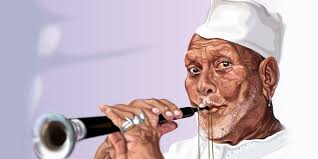BEEHIVE
- Books Name
- EduMple Institute of Learning English Book
- Publication
- EduMple Learning
- Course
- CBSE Class 9
- Subject
- English
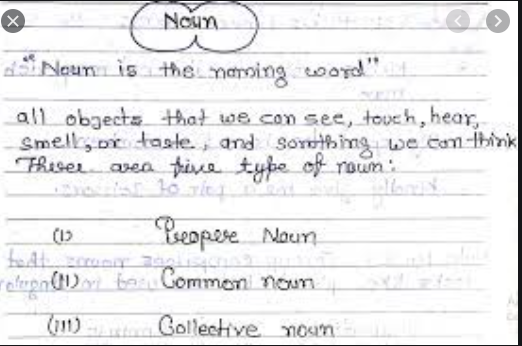
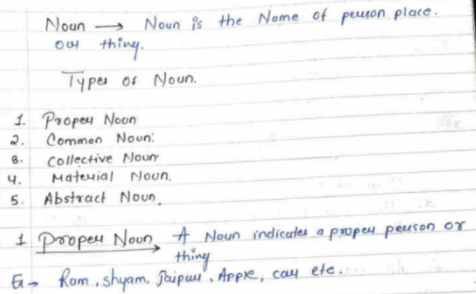
The Fun They Had
Lesson-1
The Fun They Had
By Isaac Asimov
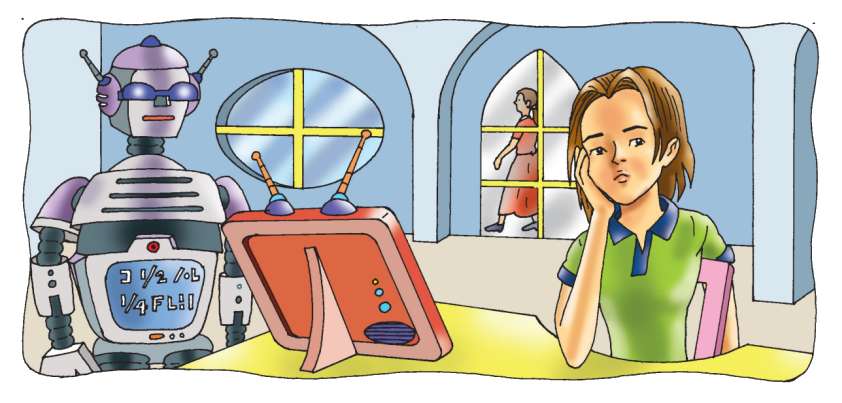
The Fun They Had Introduction
This is a lighthearted storey. It takes place in the future. It will make you all fall in love with school. This storey is about school life and how children who do not get to school miss out on school. The storey is set in the future, when there may be no school and no books. Now imagine how those students will miss going to school and how they will feel that their forefathers, the current generation—you all—had fun going to school, meeting and helping one another. Finally, we learn that this is the imagination of a young girl named Margie, who discovers that their forefathers used to go to school and that all the children used to study together. She believes that they all had a good time at school. So, after reading the storey, we feel that school life is very good, and we are fortunate to have real schools where we can go, meet friends, and study together.
The Fun They Had Summary
The storey begins with Margie writing in her diary about an old book found by Tommy. Margie was reminded of her grandfather, who once told her about his grandfather, who went to a real school where the students were taught by actual teachers.
However, Margie and Tommy lived in the year 2157, in a future world where education was completely computerised. They did not attend school. Instead, they had a special study room where they were taught by a computer. The computer teacher was programmed and adjusted to meet the individual needs of each child. Occasionally, the computer teacher created flaws that were corrected by a County Inspector.
Tommy and Margie were both puzzled by the book Tommy found in his attic. They were perplexed as they read books on their computer teacher's screen. Margie found the computer teacher to be boring, and she disliked the mechanical teaching and learning. She also wondered how enjoyable it would be to study in a school. Studying in a fun environment, with other children, and with a human teacher.
The Fun They Had Lesson Explanation
MARGIE even wrote about it that night in her diary. On the page headed 17 May 2157, she wrote, “Today Tommy found a real book!”
Margie is the story's main character. She is an 11-year-old girl. On the night of May 17, 2157, she keeps a diary. (Right now, we are in the year 2022.) As previously stated, the story is set in the future, in the year 2157 (almost a century and a half, or 140 years from now). Margie writes an entry in her diary at the time, stating that 'Tommy found a real book,' which she finds strange because real books do not exist in her time. They only have electronic books, or virtual books.
It was a very old book. Margie’s grandfather once said that when he was a little boy his grandfather told him that there was a time when all stories were printed on paper.
Margie's grandfather comes to mind. He told her that his grandfather read every book that was printed on paper. As a result, for them, this type of book is historical or ancient. Something they can't believe, something they can't imagine.
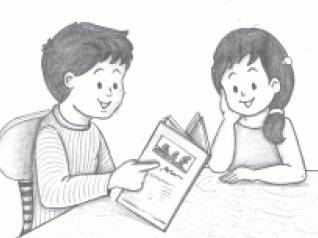
They turned the pages, which were yellow and crinkly, and it was awfully funny to read words that stood still instead of moving the way they were supposed to — on a screen, you know.
- crinkly: with many folds or lines, something that is crushed.
Margie is discussing the book that Tommy found. She claims that the book's pages had turned yellow and had been crushed due to its age. The children thought it was funny to read the words that were frozen in time. (What does the phrase "words that stood still" mean? The words did not move because they were printed on the pages). The books that Margie and Tommy read, on the other hand, were available online (e-books). So, in the case of e-books, the text continues to move as your screen moves, but this was not the case with books printed on paper.
And then when they turned back to the page before, it had the same words on it that it had had when they read it the first time.
This was an unusual experience for these children. When you have a book that is printed on paper, every time you turn the pages, you will see the same thing written on the pages. In an e-book, on the other hand, the text on the screen changes all the time. The screen is identical. You're looking at the same screen, but the text keeps changing. As a result, each time you return, the text is different.
“Gee,” said Tommy, “what a waste. When you’re through with the book, you just throw it away, I guess. Our television screen must have had a million books on it and it’s good for plenty more. I wouldn’t throw it away.”
Tommy was dissatisfied with the printed book. He called it a waste because he believed that once you finished reading a book, you had to throw it away. It is not possible to have multiple stories written in the same book. On the contrary, he thought the computer screen was excellent because it had shown him many books and he could still read many more on it. He wouldn't have to toss that screen away after reading a specific story.
“Same with mine,” said Margie. She was eleven and hadn’t seen as many telebooks as Tommy had.He was thirteen.
Tommy's perspective was agreed by Margie. Margie was eleven years old, and she had not read as many books as Tommy had because Tommy was thirteen years older.
She said, “Where did you find it?”
Margie inquired as to where Tommy had found the printed book.
“In my house.” He pointed without looking because he was busy reading. “In the attic”.
- attic: a space just below the roof, used as a storeroom
Tommy told Margie that he found the printer book in his house's storeroom. He didn't take his gaze away from the book because he was so completely immersed in it.
“What’s it about?”
Margie inquired about the book.
“School”
Tommy responded by saying that the book was about school. About going to school, about school life.
Margie was scornful.
“School? What’s there to write about school? I hate school.”
- scornful: contemptuous; showing you think something is worthless, show your dislike for something
Margie hated the word'school,' so she argued that what was there to write about it that an entire book had been written about it?
Margie always hated school, but now she hated it more than ever.
The mechanical teacher had been giving her test after test in geography and she had been doing worse and worse until her mother had shaken her head sorrowfully and sent for the County Inspector.
What's the name of Margie's school? Margie's teacher is a mechanical teacher. (By a mechanical teacher, I mean the machine that teaches you, not the school where we all go.)
Why did Margie hate school? Margie's school was a virtual environment. It was not a proper school like the ones we have today. As a result, we believe that in the future, schools will be virtual classrooms. There will be machines that teach the children. Margie hated this machine because it was giving her too many geography tests that were too difficult for her, and she was doing poorly. Finally, her mother suspected that something was wrong with the machine and requested that the County Inspector inspect it.
He was a round little man with a red face and a whole box of tools with dials and wires.
The County Inspector arrived to conduct a check on the mechanical teacher. He was a small, round man with a red face. He was carrying a large box filled with tools, dials, and wires.
He smiled at Margie and gave her an apple, then took the teacher apart.
So this man opened the machine. He was on his way to fix the computer.
Margie had hoped he wouldn’t know how to put it together again, but he knew how allright, and, after an hour or so, there it was again,large and black and ugly, with a big screen on which all the lessons were shown and the questions were asked.
Margie wished he couldn't close the computer after he opened it because she didn't like the computer and she didn't like studying from this teacher. But the man was an expert, and within an hour he had repaired the computer, shut it down, and prepared it to teach Margie once again. Margie explains how the computer works. It appears to be very large to her, black in colour, and she dislikes its appearance. It has a large screen on which all of the lessons are displayed, as well as many questions that are difficult for Margie to answer.
That wasn’t so bad. The part Margie hated most was the slot where she had to put homework and test papers.
- slot: a given space, time or position
Margie hated this mechanical teacher the most because she was required to submit her homework and test papers to it.
She always had to write them out in a punch code they made her learn when she was six years old, and the mechanical teacher calculate the marks in no time.
Margie was required to write her homework and test papers in a specific punch code, which is a computing language. She began learning the language when she was six years old. In a matter of seconds, the machine checked her papers and calculated her grades.
The Inspector had smiled after he was finished and patted Margie’s head. He said to her mother,“It’s not the little girl’s fault, Mrs Jones. I think the geography sector was geared a little too quick.
- geared (to): adjusted to a particular standard or level
As a result, the County Inspector stated that Margie was receiving poor grades in Geography because the Machine was malfunctioning. It was designed for a higher level of understanding.
Those things happen sometimes. I’ve slowed it up to an average ten-year level.
He stated that machines occasionally malfunctioned, and that is what had occurred. He had slowed it down and set it to the pace of a ten-year-old learner.
Actually, the overall pattern of her progress is quite satisfactory.” And he patted Margie’s head again.
He stated that Margie was progressing well. He patted Margie's head once more to cheer her up.
Margie was disappointed. She had been hoping they would take the teacher away altogether.
Margie was upset because she didn't want to learn, but she did want to study with this machine. And she demanded that the inspector take it away.
They had once taken Tommy’s teacher away for nearly a month because the history sector had blanked out completely.
- blanked out: it has been erased
Margie recalls the time when Tommy's Mechanical teacher was taken away for repair for nearly a month and he was enjoying his time because he didn't have a teacher. It was removed because the History sectorthe section of the machine that taught the History subject had been destroyed. As a result, the mechanical teacher had no memory of it and had to be taken down for repair.
So she said to Tommy, “Why would anyone write about school?”
We now understand why Margie dislikes school. So she asked Tommy why anyone would write about school.
Tommy looked at her with very superior eyes.“Because it’s not our kind of school, stupid. This is the old kind of school that they had hundreds and hundreds of years ago.
Tommy was staring at Margie with superior eyes because he knew something Margie didn't. Margie was silly, he said, because she didn't realise that many years ago, the school was not the kind they had.
“He added loftily, pronouncing the word carefully, “Centuries ago.”
- loftily: in a superior way
Tommy wanted to emphasise the time period and stated that the school was not what it was centuries ago.
Margie was hurt. “Well, I don’t know what kind of school they had all that time ago.” She read the book over his shoulder for a while, then said,“Anyway, they had a teacher.”
Margie was offended by Tommy's behaviour and stated that she had no idea what kind of schools existed centuries ago. She was attracted and imagined a class of children being instructed by a human teacher. She leaned over Tommy's shoulder, trying to read the book, and suggested that they might have a teacher.

“Sure they had a teacher, but it wasn’t a regular teacher. It was a man.”
- regular: here, normal; of the usual kind
(Tommy refers to a machine teacher as a regular teacher because that is what they are used to to.) That was their teacher, a Machine). He stated that it was a man (human being) who taught them, not the machine.
“A man? How could a man be a teacher?”
Margie couldn't believe a man could be a teacher because she had always seen machines do it.
“Well, he just told the boys and girls things and gave them homework and asked them questions.”
Tommy says that the man who taught the class discussed a variety of topics with the students, assigned homework, and then quizzed them on it, much like their mechanical teacher.
“A man isn’t smart enough.”
According to Margie, a man teacher is not as smart (intelligent) as a machine teacher.
“Sure he is. My father knows as much as my teacher.”
Tommy says Margie not to undervalue the human teacher. He claimed to be as knowledgeable as the machine. He compares the machine to his father, claiming that his father is as knowledgeable as his machine teacher.
“He knows almost as much, I betcha.”
- betcha(informal): (I) bet you (in fast speech): I’m sure
Tommy could bet that the human teacher knew just as much as the mechanical teacher.
Margie wasn’t prepared to dispute that. She said,“I wouldn’t want a strange man in my house to teach me.”
- dispute: disagree with when you are opposing something,
Margie refused to talk about it any further, adding that she did not want a strange man, the human teacher, to come to her house to teach her.
Tommy screamed with laughter. “You don’t know much, Margie. The teachers didn’t live in the house. They had a special building and all the kids went there.”
Tommy thought it was hilarious when Margie said she didn't want a strange man to come to her house to teach her. Teachers, he stated, did not come to the students' homes to teach them. They had a special structure; a school, and the students went there to study.
“And all the kids learned the same thing?”
Margie was shocked and inquired whether all of the children had learned the same thing.
“Sure, if they were the same age.”
Tommy stated that all of the children his age studied the same subject.
“But my mother says a teacher has to be adjusted to fit the mind of each boy and girl it teaches and that each kid has to be taught differently.”
Margie is talking about a machine teacher. She says that her mother told her that the machine had to be calibrated to the level of each boy or girl who used it. As a result, each child had to be taught separately based on their level.
“Just the same they didn’t do it that way then. If you don’t like it, you don’t have to read the book.”
Tommy responded that they did not do it that way in the past. He became irritated with Margie and told her she didn't need to read the book.
“I didn’t say I didn’t like it,” Margie said quickly.
The book incites Margie's interest. She is curious about the types of schools that were present.
She wanted to read about those funny schools.
Margie was curious. She was curious about the type of schools that existed in the past because she thought they were enjoyable.
They weren’t even half-finished when Margie’s Mother called, “Margie! School!”
Margie had only read half of the book when her mother called to remind her that it was time for her to go to her virtual school.
Margie looked up. “Not yet, Mamma”
Margie's school was right next to her bedroom in the next room. She told her mother that she did not want to go to school just yet.
“Now!” said Mrs Jones. “And it’s probably time for Tommy, too.”
Tommy was told by Margie's mother that it was time for him to go to school as well.
Margie said to Tommy, “Can I read the book some more with you after school?”
Margie was so eager to read the book that she asked Tommy if she could join him after school.
“May be,” he said nonchalantly.
- nonchalantly: not showing much interest or enthusiasm; carelessly
Tommy tried to ignore her and said that she might be able to read it.
He walked away whistling, the dusty old book tucked beneath his arm.
Tommy was extremely happy because Margie was interested in reading the book. He walked to his house with the book under his arm.

Margie went into the schoolroom. It was right next to her bedroom, and the mechanical teacher was on and waiting for her.
Margie arrived at her school. It was a room adjoining her bedroom. It was a virtual classroom. For Margie, there was a machine teacher. It was turned on and waiting for her to start teaching her.
It was always on at the same time every day except Saturday and Sunday, because her mother said little girls learned better if they learned at regular hours.
Margie studied with this mechanical teacher every day except Saturdays and Sundays. Margie's mother was extremely picky. She had told Margie that she would learn better if she studied at the same time every day.
The screen was lit up, and it said: “Today’s arithmetic lesson is on the addition of proper fractions. Please insert yesterday’s homework in the proper slot.
Margie sat in front of the machine, which looked like a computer, and turned it on. It stated that the topic of the day's Arithmetic lesson was addition of proper fractions. It also instructed her to insert the previous day's homework into the slot for inserting homework.
Margie did so with a sigh.
Margie's life, like a machine, is also very mechanical. Her classroom is depressing. It is as dull and boring as a machine.
She was thinking about the old schools they had when her grandfather’s grandfather was a little boy.
Margie recalls a story told to her by her grandfather. Her grandfather told her that when he was a child, his grandfather went to school. Margie is reminded of her previous life as she becomes bored with this machine.
All the kids from the whole neighborhood came, laughing and shouting in the schoolyard, sitting together in the schoolroom,going home together at the end of the day.
(This is the life you are living right now, but it will be a distant memory for your future children. It will be history for them because their lives will be drastically different. They will study with the help of machines.)
When Margie learns that children used to go to school, where they sat together, laughed, and shouted, she becomes excited and wishes to attend. (The author wants us to understand the value of education in our lives.) Children can get bored and tired of going to school, but if you don't have a school, you won't be able to meet new people. Your life will be extremely dull and monotonous).
They learned the same things, so they could help one another with the homework and talk about it.
Margie believes that school is a lot of fun because the kids get together, they study in a fun way, they all get the same homework, and they can discuss it, get help, and talk about it. As a result, all of the students become friends and study in a fun environment.
And the teachers were people…
She found it odd that the teachers were not machines, but rather human beings.
The mechanical teacher was flashing on the screen: “When we add fractions ½ and ¼…”
The machine began the lesson as soon as Margie inserted her homework. There was no pause, no time to have fun, no time to chat, and no time to interact with friends.
Margie was thinking about how the kids must have loved it in the old days. She was thinking about the fun they had.
The author concludes the storey with the chapter title 'The Fun They Had.' (The excitement the students felt when they went to regular schools.) Margie is just thinking about the kids who went to school and enjoyed their studies in the past.
About the Author
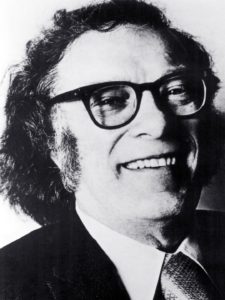
Isaac Asimov (1920–1992) was an American author and biochemistry professor at Boston University. He was well-known for his science fiction and popular science works. Asimov was a prolific author who wrote or edited over 500 books as well as an estimated 90,000 letters and postcards. Isaac Asimov was the Grand Master of the Science Fiction Writers of America, the creator of robot ethics, and one of the world's most prolific fiction authors.
The Sound of Music: Part I and II
Lesson-2
The Sound of Music
By Deborah Cowley

The Sound of Music: (Part I – Evelyn Glennie Listens to Sound without Hearing It) Introduction
Let's talk about the title now. The title is interesting in and of itself. Evelyn Glennie, according to the author, listens to sound without hearing it. We're all perplexed right now. When you can't hear, how can you listen to sound? So, this is something we will learn – how Evelyn Glennie was able to listen to sound despite her inability to hear.
The Sound of Music: (Part I – Evelyn Glennie Listens to Sound without Hearing It) Summary
Evelyn Glennie is a multi-percussionist. She has attained mastery over almost a thousand musical instruments despite being hearing–impaired. She learnt to feel music through the body instead of hearing it through the ears.
Evelyn was discovered to have lost her hearing ability due to nerve damage when she was eleven years old. The specialist recommended that she wear hearing aids and attend a deaf school. Evelyn, on the other hand, was determined to live a normal life and pursue her musical interests. Despite being discouraged by her teachers, Ron Forbes, a master percussionist, recognised her potential. He taught Evelyn to feel music rather than hear it with her ears. This worked well for Evelyn, who discovered that she could detect different sounds using different parts of her body.
Evelyn began her musical career after overcoming this obstacle. She was admitted to the Royal Academy of Music in London and received the highest marks in the academy's history. Evelyn relates her success to hard work and dedication to her goal. Evelyn performs solo and even gives free concerts in hospitals and schools. She received the Royal Philharmonic Society's prestigious 'Soloist of the Year Award' in 1991. Evelyn's storey serves as motivation for people with disabilities who want to achieve their goals in the same way she did.
The Sound of Music: (Part I – Evelyn Glennie Listens to Sound without Hearing It) Lesson Explanation
RUSH hour crowds jostle for position on the underground train platform. A slight girl, looking younger than her seventeen years, was nervous yet excited as she felt the vibrations of the approaching train.
- jostle: push roughly
- slight: small and thin
The scene is of a train platform, which is underground, and there is a huge rush at the platform, with people pushing each other to get through. Evelyn is the name of a small, thin girl. Evelyn is waiting for the train on the railway platform. And when she feels the vibrations of the approaching train and realises it is about to arrive, she becomes nervous and excited. This is the train that Evelyn will take to get to London. She is going to London to study music because she has been admitted to the Royal Academy of Music. Evelyn is currently in Scotland. (Evelyn is from Scotland.) Scotland is a European country. Life in Scotland is slower than it is in London. Life in London moves at a fast pace. It is more urban than Scotland, which has farms and countryside.) That is why Evelyn is nervous about leaving Scotland for London. She is also excited because she is doing something she has always wanted to do. She is studying music at the Royal Academy of Music.
It was her first day at the prestigious Royal Academy of Music in London and daunting enough for any teenager fresh from a Scottish farm.
- daunting: frightening, Scary
- teenager: a person who is in his teens
Evelyn is a seventeen-year-old girl. She is a teen who has just moved from a Scottish farm. Evelyn is from Scotland, where there are more farms and countryside, so she hasn't experienced fast life. That's why she's nervous, and the writer claims she's just moved from a Scottish farm.
But this aspiring musician faced a bigger challenge than most: she was profoundly deaf.
- aspiring musician: a person who wants to be a musician
- Profoundly deaf: absolutely deaf.
Evelyn couldn't hear, which made things even more difficult for her. Moving from a rural area to a fast-paced lifestyle was a smaller challenge. Evelyn faced a much greater challenge: her inability to hear.
Evelyn Glennie’s loss of hearing had been gradual.
- gradual: in phases
She gradually began to lose her hearing ability, and one day she was completely deaf.
Her mother remembers noticing something was wrong when the eight-year-old Evelyn was waiting to play the piano. “They called her name and she didn’t move. I suddenly realized she hadn’t heard,” says Isabel Glennie.
Evelyn's mother's name is Isabel Glennie. Isabel, Evelyn's mother, recalls an incident when Evelyn was eight years old. Evelyn, she says, was waiting her turn to play the piano when her name was called, but she did not respond. And her mother noticed that Evelyn did not respond to her name, implying that she did not hear her name called.
For quite a while Evelyn managed to conceal her growing deafness from friends and teachers.
- conceal: to hide
Evelyn's hearing loss occurred in stages, so it was a gradual process. She was able to hide her disability from her friends and teachers at first, when she could only hear partially.
But by the time she was eleven her marks had deteriorated and her headmistress urged her parents to take her to a specialist
- Specialist: a doctor specializing in a particular part of the body.
- Deteriorated: worsened, reduces
- Urged: requested
Evelyn's grades began to decline when she was eleven years old. The Headmistress asked Evelyn's parents to take her to the doctor.
It was then discovered that her hearing was severely impaired as a result of gradual nerve damage.
- impaired: weakened
When the doctor checked on Evelyn, he found that she had lost her hearing.
They were advised that she should be fitted with hearing aids and sent to a school for the deaf.
Evelyn's parents were advised by the doctor to get her hearing aids. (A hearing aid is a piece of equipment that is fitted into your ear and helps you hear to some extent.) He also suggested that Evelyn be sent to a special school for deaf children.
“Everything suddenly looked black,” says Evelyn.
Evelyn's world became colourless when she discovered she couldn't hear and would be sent to a school for deaf children because she wasn't as good as other children. It went black. What does it mean when "everything suddenly looked black"? It means that you get such bad news all of a sudden; you get some news that you don't expect. As a result, you see nothing but blackness all around you. That's how Evelyn reacted to the news.
But Evelyn was not going to give up.
This demonstrates Evelyn's grit and determination. Despite the fact that Evelyn had received such shocking news, she remained determined and refused to give up.
She was determined to lead a normal life and pursue her interest in music.
- pursue: to follow
Evelyn was a music lover, so this news didn't break her heart. She was determined to live a normal life and pursue her musical interests.
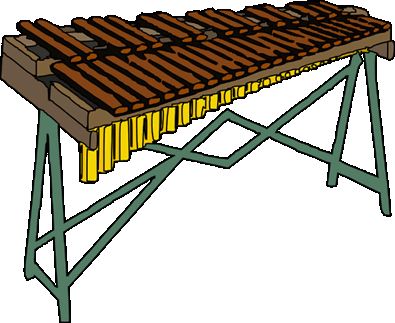
One day she noticed a girl playing the xylophone and decided that she wanted to play it too.
- xylophone: a musical instrument with a row of wooden bars of different lengths
Evelyn wanted to play the Xylophone after seeing a girl do so.
Most of the teachers discouraged her but percussionist Ron Forbes spotted her potential.
- percussionist: a person who plays the drum, the tabla, etc, a person who play different musical instruments
- potential: quality or ability that can be developed
On the one hand, Evelyn's teachers discouraged her because they knew she couldn't hear, and hearing was an essential part of music. But when Ron Forbes noticed Evelyn's enthusiasm for music, he made a decision.
He began by tuning two large drums to different notes.
Ron Forbes intended to teach Evelyn to feel music. He picked up two large drums and tuned them to different pitches. He tuned the drums, which are musical instruments. He had each drum tuned to a different note. As a result, the sound produced by the drums was distinct. As a result, it was distinct. Both drums produced distinct tones. Then he informed Evelyn –
“Don’t listen through your ears,” he would say, “tryto sense it some other way.
Don't try to listen with your ears, he said. Try to sense it, he said. Try to feel the music in a different way.
” Says Evelyn, “Suddenly I realized I could feel the higher drum from the waist up and the lower one from the waist down.”
(The waist refers to the centre of your body.) Now that Ron had tuned both drums to different notes, Evelyn's upper body, above the waist, could feel the higher notes of a drum and her lower body, below the waist, could feel the lower notes of a drum.
Forbes repeated the exercise, and soon Evelyn discovered that she could sense certain notes in different parts of her body.
Evelyn can listen to sound in this way despite her inability to hear. She can detect different notes in various parts of the body.
“I had learnt to open mymind and body to sounds and vibrations.” The rest was sheer determination and hard work.
Ron Forbes taught Evelyn to respond to different sounds; different parts of Evelyn's body responded to different sounds, allowing her to identify the sounds and vibrations. Evelyn's career took a step forward after she was able to identify the sounds and vibrations. She was determined to become famous, a good musician, and she also put in a lot of effort.
She never looked back from that point onwards.
Evelyn advanced in her career after she overcame the obstacle and began sensing different sounds through different parts of her body.
She toured the United Kingdom with a youth orchestra and by the time she was sixteen, she had decided to make music her life.
- youth: Young people, people like who are in college or high school
- orchestra: group of musicians
As a result, Evelyn toured the United Kingdom with a youth orchestra. Evelyn had decided to make music her career by the time she was sixteen years old.
She auditioned for the Royal Academy of Music and scored one of the highest marks in the history of the academy.
- auditioned: gave a short performance so that the director could decide whether she was good enough
Evelyn auditioned for admission to the Royal Academy of Music, and her score was the highest in the Academy's history. Evelyn was the only person who received such a high score.
She gradually moved from orchestral work to solo performances.
- orchestral work: group performance, performing in a group of musicians
- Solo: to perform single, alone.
So Evelyn began by performing in a group, and as she progressed in her music and gained confidence, she began to perform alone.
At the end of her three-year course,she had captured most of the top awards.
By the end of her three-year course at the Royal Academy of Music, she had won every major award.
And for all this, Evelyn won’t accept any hint of heroic achievement.
If someone tells Evelyn she's accomplished something great, she doesn't acknowledge it; she's very humble and down-to-earth.
“If you work hard and know where you are going, you’ll get there.”
Evelyn believes that two things are essential for success: hard work and goal-setting. She believes that if you work hard and have a goal, a target that you must achieve, you will succeed.
And she got right to the top, the world’s most sought-after multi-percussionist with a mastery of some thousand instruments, and a hectic international schedule.
- most sought after: most popular, in-demand
Evelyn, too, accomplished her goal. She worked hard, and her goal was to become the world's best, most famous, and most sought-after musician, which she accomplished. She has mastered nearly a thousand musical instruments and is the world's most popular multi-percussionist, with a very busy schedule. She performs and has programmes all over the world.
It is intriguing to watch Evelyn function so effortlessly without hearing.
- intriguing: fascinating and curious
When you watch Evelyn work or perform so effortlessly despite the fact that she cannot hear, you become very curious because Evelyn can identify the smallest, most insignificant sound made by musical instruments.
In our two-hour discussion, she never missed a word.
Deborah Cowley, a writer, conducted Evelyn's two-hour interview, and Deborah says that Evelyn never missed a single word she spoke.
“Men with bushy beards give me trouble,” she laughed.
Evelyn says that men with long, massive, bushy beards irritate her. Why do they bother her? Because when they speak, she can't see their lips move because their beards cover their lips.
“It is not just watching the lips, it’s the whole face, especially the eyes.”
Evelyn says that she does not rely solely on the movement of a person's lips to determine what they are saying. Evelyn sees the entire face, which means that the entire expression on the speaker's face helps Evelyn identify or understand what the person is saying. She adds that the expression of the eyes aids Evelyn in understanding what the person in front of her is saying.
She speaks flawlessly with a Scottish lilt.
- flawlessly: without a fault or mistake
- lilt: a way of speaking like we say accent
Evelyn's speech, according to the author, is flawless, and she speaks with a Scottish accent. (Because she is from Scotland, her voice has that accent.)
“My speech is clear because I could hear till I was eleven,” she says.
Evelyn says to be able to speak clearly because she has studied the language. She studied until she was eleven years old, or until she could hear.
But that doesn’t explain how she managed to learn French and master basic Japanese.
Evelyn, on the other hand, learned two new languages after becoming deaf. She has a basic understanding of French and Japanese. So one wonders how she managed to learn these two new languages despite her deafness.
As for music, she explains, “It pours in through every part of my body. It tingles in the skin, my cheekbones and even in my hair.”
- tingles: causes a slight prickling or stinging sensation
So Evelyn explains how she recognises music in this section. It causes a sensation in her skin, cheekbones, and even hair. As a result, Evelyn's entire body reacts to music.
When she plays the xylophone, she can sense the sound passing up the stick into her fingertips.
When she plays the Xylophone, she uses sticks, and she can feel the vibrations of the Xylophone's sound pass through the sticks and up into her fingertips.
By leaning against the drums, she can feel the resonances flowing into her body.
- resonances: echoes of sounds
Evelyn leans towards the drum as she plays, and she can feel the echo flowing into her body.
On a wooden platform, she removes her shoes so that the vibrations pass through her bare feet and up her legs.
Evelyn performs on a wooden platform and removes her shoes to feel the vibrations of the musical instruments pass through the floor, into her feet, and up her legs. That is how she is able to perceive the sound of the musical instruments.
Not surprisingly, Evelyn delights her audiences. In 1991 she was presented with the Royal Philharmonic Society’s prestigious Soloist of the Year Award.
Evelyn is now a joy to listen to. She gives excellent solo performances. She received the Royal Philharmonic Society's prestigious Soloist of the Year Award for solo performance in 1991.
Says master percussionist James Blades,“God may have taken her hearing but he has given her back something extraordinary. What we hear, she feels — far more deeply than any of us. That is why she expresses music so beautifully.”
Now, James Blades is a master percussionist, and his words were read before we began reading the chapter. According to James, God took away Evelyn's hearing ability but gave her a strong sense of sound, allowing her to become a great musician.
Evelyn confesses that she is something of a workaholic.
- workaholic (informal): a person who finds it difficult to stop working
Evelyn is a hard - working who never stops.
“I’ve just got to work . . . often harder than classical musicians.
Evelyn is now working very hard to catch up with those who can hear and are classical musicians.
But the rewards are enormous.”
- enormous – big
Evelyn claims that the rewards she receives for her efforts are huge.
Apart from the regular concerts, Evelyn also gives free concerts in prisons and hospitals.
Evelyn also donates to charity. She performs for free in hospitals and prisons.
She also gives high priority to classes for young musicians.
She also teaches music to young people. For children who want to learn how to play an instrument.
Ann Richlin of the Beethoven Fund for Deaf Children says, “She is a shining inspiration for deaf children. They see that there is nowhere that they cannot go.”
Evelyn is an inspiration to everyone; she is the ideal. Evelyn is an inspiration for children who cannot hear, according to Ann Richlin of the Beethoven Fund for Deaf Children. And after learning Evelyn's storey, they believe they can accomplish anything. They are capable of realising all of their ambitions.
Evelyn Glennie has already accomplished more than most people twice her age.
- accomplished: achieved
Evelyn Glennie has accomplished so much in her life that people twice her age have not accomplished as much, as much popularity, and as many awards as Evelyn has. Evelyn Glennie has accomplished so much in her life that people twice her age have not accomplished as much, as much popularity, and as many awards as Evelyn has.
She has brought percussion to the front of the orchestra and demonstrated that it can be very moving.
The orchestra is a group of people who play various musical instruments. Generally, percussion instruments such as drums and xylophones are placed at the backend of the orchestra or on the side, but because Evelyn performs solo and gives special performances with these percussion instruments, the percussion instruments have moved to the front of the orchestra.
She has given inspiration to those who are handicapped,people who look to her and say, ‘If she can do it, I can.’ And, not the least, she has given enormous pleasure to millions.
Evelyn's storey serves as motivation for people who are physically disabled. They believe that if Evelyn can achieve her goals, so can they. And Evelyn has given her audience a lot of pleasure by playing such good music.
About the Author

Deborah (Mason) Cowley is a broadcaster and freelance writer. She grew up in Toronto, attended the University of Western Ontario, and then relocated to Ottawa to work for the Unitarian Service Committee. She worked for UNHCR (United Nations Relief and Works Agency) in Beirut for two years before returning to Ottawa and taking a job with CIDA. She worked as a reporter for CBC radio in Washington, D.C. while travelling the world with her diplomat husband, and during a posting to Cairo, she worked on several TV documentaries for CBC's Man Alive. She also wrote the first official guide book to Cairo since Baedeker's guide in the 1940s while in Egypt.
The Sound of Music: (Part II – The Shehnai Of Bismillah Khan)
The Sound of Music: (Part II –The Shehnai of Bismillah Khan) Introduction
The lesson is divided into two sections. Both are associated with the subject of music and the people who have made music their life's work. Bismillah Khan, rose to prominence as India's most revered shehnai master. He was the recipient of the Bharat Ratna, India's highest civilian award. He performed not only in India, but also in other countries.
The Sound of Music: (Part II –The Shehnai of Bismillah Khan) Summary
Ustad Bismillah Khan was the first to introduce the "shehnai" instrument to the classical music stage. The shrill sound of the pungi instrument was modified by the barber of Emperor Aurangzeb's kingdom to create the Shehnai. Bismillah, who was born into a musical family, learned the Shehnai and began practising at a young age. He practised in temples in Bihar and on the banks of the Ganga, seeking inspiration from them. Bismillah got his big break when All India Radio launched in Lucknow, and he quickly rose to prominence.
On August 15, 1947, Bismillah was the first Indian to greet the nation with music, performing from the Red Fort to an audience that included Gandhiji and Nehruji. He also received a few film offers, but he soon resigned because he disliked the industry's artificiality. He was awarded the Bharat Ratna, the Padmashri, the Padma Bhushan, and the Padma Vibhushan. He declined an offer to travel to the United States because he did not want to leave his motherland. Hearing his shehnai music at the Kashi Vishwanath Temple, as a devout Muslim, is the best example of India's rich cultural heritage.
The Sound of Music: (Part II –The Shehnai of Bismillah Khan) Lesson Explanation
The sound of the shehnai began to be considered auspicious. And for this reason it is still played in temples and is an indispensable component of any North Indian wedding. In the past, the shehnai was part of the naubat or traditional ensemble of nine instruments found at royal courts. Till recently it was used only in temples and weddings. The credit for bringing this instrument onto the classical stage goes to Ustad Bismillah Khan.
- Auspicious: promising to bring good fortune, luck
- indispensable: necessary, cannot be without
- ensemble: things considered as a group
The sound of the shehnai was liked by everyone and was thought to be auspicious, or promising good fortune. It is still played in all temples because it is considered auspicious. There can be no North Indian wedding without shehnai music, which has become an absolute necessity. Shehnai was one of the nine instruments in the palace known as the naubat in ancient times. Shehnai has progressed from temples and weddings to the classical music stage thanks to Ustad Bismillah Khan.
As a five-year old, Bismillah Khan played gillidanda near a pond in the ancient estate of Dumraon in Bihar. He would regularly go to the nearby Bihariji temple to sing the Bhojpuri ‘Chaita’, at the end of which he would earn a big laddu weighing 1.25 kg, a prize given by the local Maharaja. This happened 80 years ago, and the little boy has travelled far to earn the highest civilian award in India — the Bharat Ratna.
Born on 21 March 1916, Bismillah belongs to a well-known family of musicians from Bihar. His grandfather, Rasool Bux Khan, was the shehnai-nawaz of the Bhojpur king’s court. His father, Paigambar Bux, and other paternal ancestors were also great shehnai players.
- paternal: related to the father's side
- ancestors: one from whom a family is ascended, above the grandparents, usually
This paragraph is about Bismillah Khan's childhood. He used to play gillidanda, a traditional Indian game, near a pond in Dumraon, Bihar, when he was five years old. He also sang the Bhojpuri Chaita, a collection of classical songs, at the Bihariji temple near the pond on a regular basis. For this, he received a prize from the local king of the Dumraon estate. The prize was a large 1.25kg laddu (Indian ball-shaped sweet). This occurrence occurred eighty years ago. Bismillah rose from earning laddus for song recitals to receiving the Bharat Ratna, India's highest civilian award.
Bismillah Khan was born on March 21, 1916. He comes from a family of well-known musicians from Bihar. He is descended from a family of shehnai players. Rasool Bux Khan, his grandfather, was the Shehnai-Nawaz of the Bhojpur palace. His father Paigambar Bux, as well as other ancestors on his father's side, were accomplished shehnai musicians.
The young boy took to music early in life. At the age of three when his mother took him to his maternal uncle’s house in Benaras (now Varanasi), Bismillah was fascinated watching his uncles practise the shehnai. Soon Bismillah started accompanying his uncle, Ali Bux, to the Vishnu temple of Benaras where Bux was employed to play the shehnai. Ali Bux would play the shehnai and Bismillah would sit captivated for hours on end. Slowly, he started getting lessons in playing the instrument and would sit practising throughout the day. For years to come the temple of Balaji and Mangala Maiya and the banks of the Ganga became the young apprentice’s favourite haunts where he could practise in solitude. The flowing waters of the Ganga inspired him to improvise and invent raagas that were earlier considered to be beyond the range of the shehnai.
- took to: start to do something as a habit
- maternal: relating to mother
- fascinated: strongly attracted
- captivated: charmed, attracted and held on the interest
- apprentice: a person learning a trade from a skilled person
- years to come: continuing for many years in the future
- haunts (noun): a place frequented by a person
- solitude: a lonely place
- improvise: create and perform without preparation
- inspired: motivated/stimulated
- hours on end: for a long time without stopping
- beyond the range: not within the scope
Bismillah Khan began studying music as a hobby when he was a child. His mother took him to his maternal (mother's side) uncle Ali Bux's house in Varanasi when he was three years old. Ali Bux used to practise the shehnai every day, which drew Bismillah in. Soon after, he began working in his uncle's office. Ali Bux was the official shehnai player of Varanasi's Vishnu temple. Ali would play the shehnai, and Bismillah would be so enthralled by the music that he would listen to it for hours on end.
Gradually, he began to learn from his uncle and began to practise throughout the day. He practised at the Balaji temple, Mangala Maiya, and on the Ganga riverbank. Bismillah frequented these places because he liked the lonely, uninhabited calmness that was best suited to his practise. He did this for many years. The Ganga, in all its glory, served as an inspiration for him. He was inspired to improvise on existing ragas and create new ragas that were previously thought to be impossible to play on the shehnai instrument.
At the age of 14, Bismillah accompanied his uncle to the Allahabad Music Conference. At the end of his recital, Ustad Faiyaz Khan patted the young boy’s back and said, “Work hard and you shall make it.” With the opening of the All India Radio in Lucknow in 1938 came Bismillah’s big break. He soon became an often-heard shehnai player on radio.
When India gained independence on 15 August 1947, Bismillah Khan became the first Indian to greet the nation with his shehnai. He poured his heart out into Raag Kafi from the Red Fort to an audience which included Mahatma Gandhi and Pandit Jawaharlal Nehru, who later gave his famous ‘Tryst with Destiny’ speech.
- Accompanied: go somewhere with (someone) as a companion or escort
- Recital: a performance of a programme of music
- big break: big chance that leads to professional success
Bismillah went to the Allahabad Music Conference with his uncle when he was 14 years old. Ustad Faiyaz Khan, a Hindustani music expert, praised the young boy after the performance. He patted Bismillah on the back and encouraged him to work hard in order to make it big in the music industry. In 1938, the All India Radio service began operations in Lucknow. It was Bismillah's big chance to show off his abilities. Bismillah's shehnai music became popular on the radio after he was given numerous opportunities to perform for the station.
Bismillah's radio appearances gone on for years. He was the first Indian to play the shehnai and greet the country after India's independence on August 15, 1947. He performed the Raag Kafi with all of his deepest emotions on display. He was playing from the Red Fort. Among those who heard his performance that day were Mahatma Gandhi and Pandit Jawaharlal Nehru. Pandit Jawaharlal Nehru delivered his famous speech, 'Tryst with Destiny,' following Bismillah's performance.
Bismillah Khan has given many memorable performances both in India and abroad. His first trip abroad was to Afghanistan where King Zahir Shah was so taken in by the maestro that he gifted him priceless Persian carpets and other souvenirs. The King of Afghanistan was not the only one to be fascinated with Bismillah’s music. Film director Vijay Bhatt was so impressed after hearing Bismillah play at a festival that he named a film after the instrument called Gunj Uthi Shehnai. The film was a hit, and one of Bismillah Khan’s compositions, “Dil ka khilona hai toot gaya ...,” turned out to be a nationwide chartbuster! Despite this huge success in the celluloid world, Bismillah Khan’s ventures in film music were limited to two: Vijay Bhatt’s Gunj Uthi Shehnai and Vikram Srinivas’s Kannada venture, Sanadhi Apanna. “I just can’t come to terms with the artificiality and glamour of the film world,” he says with emphasis.
- Memorable: unforgettable
- Maestro: a distinguished performer of classical music
- Souvenir: a thing that is kept as a reminder of a person, place, or event
- chart buster: record breaker
- ventures: projects that often involve risk
- taken in by: attracted or charmed by
- celluloid: old-fashioned way of referring to films
Bismillah Khan delivered a number of unforgettable performances both inside and outside the country. His first trip abroad was to Afghanistan. The performance was such a success that Afghanistan's King, Zahir Shah, was enthralled by his distinguished talent. As a token of appreciation, the King presented him with valuable Persian carpets and other mementos. His skilled music captivated more than just the King.
Vijay Bhatt, the director of the film, had heard Bismillah perform at a music festival. Vijay Bhatt was so taken with the shehnai instrument that he made a film based on it called "Gunj Uthi Shehnai," which translates as "The Wedding Bells (shehnai sound) Have Started Ringing." The film was a huge success, and it featured Bismillah's composition "Dil ka khilona hai toot gaya...", which translates as "heart is broken..." This song broke a lot of records. Bismillah went on to work on another film with director Vikram Srinivas called "Sanadhi Apanna," which translates to "Shehnai Apanna." The film was about the life of a rural shehnai artiste named Apanna. This film was also a huge success. Despite his enormous success in the film industry, Bismillah did not continue. He disliked the artificiality and glitz of the film industry.
Awards and recognition came thick and fast. Bismillah Khan became the first Indian to be invited to perform at the prestigious Lincoln Centre Hall in the United States of America. He also took part in the World Exposition in Montreal, in the Cannes Art Festival and in the Osaka Trade Fair. So well known did he become internationally that an auditorium in Teheran was named after him — Tahar Mosiquee Ustaad Bismillah Khan.
National awards like the Padmashri, the Padma Bhushan and the Padma Vibhushan were conferred on him.
In 2001, Ustad Bismillah Khan was awarded India’s highest civilian award, the Bharat Ratna. With the coveted award resting on his chest and his eyes glinting with rare happiness he said, “All I would like to say is: Teach your children music, this is Hindustan’s richest tradition; even the West is now coming to learn our music.’’
- Conferred: given, usually an award or a degree
- thick and fast: rapidly and in great numbers
- coveted: much desired
- glinting: flashing or shining
Bismillah Khan received awards and recognition at an increasing rate. He was well-known throughout the world. He received the following national honours. Padmashri award, Padma Bhushan award, Padma Vibhushan award. He was also the first Indian to perform at the prestigious Lincoln Centre Hall in the United States. He took part in the Montreal World Exposition., He took part in the Cannes Art Festival., He attended the Osaka Trade Fair. Tahar Mosiquee Ustaad Bismillah Khan Auditorium in Teheran was named after him.
In 2001, Ustad Bismillah Khan was awarded the nation's highest civilian honour, the prestigious Bharat Ratna. He was holding the award on his chest, and his eyes were beaming with joy, which was not a common sight. He encouraged people to teach their children music, citing music as India's most important and valued tradition; he also stated that Westerners were visiting India to learn our music.
In spite of having travelled all over the world — Khansaab as he is fondly called — is exceedingly fond of Benaras and Dumraon and they remain for him the most wonderful towns of the world. A student of his nce wanted him to head a shehnai school in the U.S.A., and the student promised to recreate the atmosphere of Benaras by replicating the temples there. But Khansaab asked him if he would be able to transport River Ganga as well. Later he is remembered to have said, “That is why whenever I am in a foreign country, I keep yearning to see Hindustan. While in Mumbai, I think of only Benaras and the holy Ganga. And while in Benaras, I miss the unique mattha of Dumraon.”
Ustad Bismillah Khan’s life is a perfect example of the rich, cultural heritage of India, one that effortlessly accepts that a devout Muslim like him can very naturally play the shehnai every morning at the Kashi Vishwanath temple.
- Exceedingly: extremely
- Replicate: make an exact copy
- yearning: a feeling of intense longing for something
- Devout: believing strongly in a religion and obeying its laws and following its practices
Bismillah travelled far and wide, as evidenced by the preceding paragraphs. But he adored Benares and Dumraon, where he grew up and learned the shehnai. For Bismillah, it is still one of the most beautiful towns in the world. People around Bismillah Khan referred to him as "Khansaab."
Bismillah's student wanted him to run a shehnai school in the United States. Bismillah was promised by the student that he could recreate the atmosphere and surroundings of Benares. He even stated that he would recreate the temples there. Khansaab, on the other hand, asked him if he could transport the Ganga to the United States. He is said to have stated that whenever he is in a foreign country, he longs to return to his motherland. Even when he was in India, he missed Benares and the River Ganga, and he missed the unique Dumraon mattha where he grew up practising his shehnai.
Bismillah Khan's life is an excellent example of India's rich and diverse cultural heritage. Even though Bismillah was a devout Muslim, he could be found playing the shehnai in the Kashi Vishwanath temple every morning. His music transcended religious boundaries. Our country's unity in diversity is exemplified by this.
About the Author

Bismillah Khan, original name Qamruddin Khan, (born March 21, 1916, Dumraon, Bihar and Orissa province, British India—died August 21, 2006, Varanasi, Uttar Pradesh, India), Indian musician known for his expressive virtuosity on the shehnai, a ceremonial oboelike North Indian horn. His name became inextricably linked to the woodwind instrument.
The Little Girl
Lesson-3
The Little Girl
By Katherine Mansfield

The Little Girl Introduction
The title of the storey is a reference to the main character, a young girl named Kezia. The story's theme is the relationship between children and their parents, and the author Katherine Mansfield wants us to understand that children have a very important love bond with their parents. Although children are small, when they are young, they do not believe that their parents love them because their parents are strict and many of their parents' actions appear to be unjustified. However, as children grow older, they realise that all of their parents' actions were beneficial to them. The parents were worried about them, and beneath the strictness is a heart filled with love for the children.
And this storey has highlighted the bond of love that exists between parents and their children. Do you think you know your parents better now than you did when you were younger? Perhaps you now understand why they did some of the things that used to irritate you. We don't understand why our parents are so strict with us when we're small, when we're very small. But as we get older, we mature and realise why they were being so strict with us, and when we realise that, we also realise how much our parents love us. As a result, the reader can relate to this as well.
You can all feel that when you were younger, your parents' actions and strictness toward you were for your benefit. And as you grow older, you will realise that whatever actions your parents took in the past were for your benefit, and that they truly love you. This storey about a young girl whose feelings for her father change from fear to understanding will most likely echo in every home.
What do we mean by "will almost certainly find an echo in every home"? This means that all of the children will have the same reaction. So you can all relate to Kezia, the little girl. Just as Kezia is terrified of her father, she later understands his actions and realises that he was worried about her and loved her. All of the children feel the same way about their parents, and Kezia's storey is very relatable.
The Little Girl Summary
'The Little Girl' tells the storey of Kezia, a young girl who misunderstood her father's strictness and was often terrified of him. When he was at home, she kept her distance from him. He was as big as a giant in her opinion. When she was talking to him, she would often become nervous and stutter. She yearned for his love and affection, just like her next-door neighbour, Mr Macdonald.
She was once kept indoors because she was susceptible to cold. Her grandmother suggested she make a gift for her father's birthday, which is coming up next week. They decided that Kezia would make him a pincushion. Kezia created a lovely pin cushion, but she made a mistake.
She filled it with scraps of paper from tearing her father's important speech. She was punished as a result of this. This incident strained Kezia's relationship with her father even more. She would frequently gaze out the window at her next-door neighbours, the Macdonalds, who were having a good time on their lawn. Mr. Macdonald was a wonderful father who delighted in playing with his children. She wondered if he was a different sort of father.
Her mother once became ill and had to be hospitalised. She was left alone at home with the cook to look after her. She had a nightmare and awoke screaming in the middle of the night. Her father was standing by her bedside. He took her to her room and picked her up. He tucked her into his bed and promptly fell asleep. Kezia felt safe lying next to her father. She realised that her father was not a giant. She could feel her father's large, loving heart beating in her chest. Finally, she realised her father was extremely loving and generous.
The Little Girl Lesson Explanation
To the little girl he was a figure to fear and avoided.
- a figure to be feared: a person to be feared
And who is the figure to be feared in this situation – Kezia's father. So he's talking about Kezia's Father, and the little girl is Kezia. As a result, the first line of the storey conveys Kezia's fear about her Father. And because she is afraid of her father, she tries to avoid him and stay away from him.
Every morning before going to work he came into her room and gave her a casual kiss, to which she responded with “Goodbye, Father”.
So, every morning before leaving for work, Kezia's father would pay her a visit in her room and give her a casual kiss. In response, Kezia would say, "Goodbye, Father." As a result, Kezia's father's action demonstrates his love for her.
And oh, there was a glad sense of relief when she heard the noise of the carriage growing fainter and fainter down the long road!
- Glad sense of relief: feeling relaxed
- Fainter and fainter: to lessen or reduce
Carriages, such as horse carts, were popular modes of transportation in the past. So we can see Kezia's fear about her father here. According to the author, when Kezia heard her father's carriage driving away from home and him leaving, and the sound became fainter and fainter, implying that the sound was reduced, Kezia would feel at ease. She'd be relieved that her father had gone. Why did she feel relieved now? She was afraid of him because she feared her father, and she was relieved when he left the house.
In the evening when he came home she stood near the staircase and heard his loud voice in the hall.
When Kezia's father returned home in the evenings, she could hear his loud voice. And her fear of him was intensified by his loud voice.
“Bring my tea into the drawing-room… Hasn’t the paper come yet? Mother, go and see if my paper’s out there — and bring me my slippers.”
As soon as Kezia's father returned home, he began ordering a variety of items. He'd ask for tea in the drawing room, he'd want the newspaper, he'd ask his mother to go outside and see if the newspaper was there, and he'd ask her to get him his slipper as well.
“Kezia,” Mother would call to her, “if you’re a good girl you can come down and take off father’s boots.”
Kezia's mother would call out to her and request that she take off her father's boots. To get her to obey, she would say that if she was a good girl, she would surely obey her command.
Slowly the girl would slip down the stairs, more slowly still across the hall, and push open the drawing-room door.
- slip down: come down quietly and unwillingly
So, once again, we see Kezia's fear for her father, which is why she comes down the stairs quietly and reluctantly. She was unwilling because she did not want to confront her father. She was terrified of him.
By that time he had his spectacles on and looked at her over them in a way that was terrifying to the little girl.
Imagine Kezia's father sitting on a sofa in the drawing room, wearing his spectacles and looking at Kezia through the spectacles. And the way he looked at her now terrified her. She was afraid because it appeared to her that he was staring at her.
“Well, Kezia, hurry up and pull off these boots and take them outside. Have you been a good girl today?”
Kezia was hesitant about her work. Her movements were sluggish. As a result, her father would tell her to hurry up and take off his boots, keeping them out of the room. Then he'd ask her if she'd been a good girl that day.
“I d-d-don’t know, Father.”
Kezia responded that she didn't know. So she was stammering because she lacked confidence. When a person experiences fear, he lacks confidence.
“You d-d-don’t know? If you stutter like that Mother will have to take you to the doctor.”
- Stutter: to stammer, to speak with pauses
So Kezia's father is mimicking her. He also stammers like she does. He tells her that if she continues to stutter, her mother will have to take her to the doctor for a checkup.
She never stuttered with other people — had quite given it up — but only with Father, because then she was trying so hard to say the words properly.
- given it up: stopped doing it
- Trying so hard: making a lot of efforts
So the author tells us here that Kezia never stammered when she spoke to other people. She only lacked confidence when she spoke to her father, which is why she tried so hard to speak properly and stammered.
“What’s the matter? What are you looking so wretched about? Mother, I wish you taught this child not to appear on the brink of suicide…Here, Kezia, carry my teacup back to the table carefully.”
- Wretched: unhappy, sad
- on the brink of suicide: about to commit suicide
- suicide: kill oneself
When Kezia's father looks at her, he gets the impression that something is wrong with her. And he inquired as to why she was so dissatisfied. Then he tells the mother that she should teach Kezia better behaviour and that she should not appear to be so unhappy that she is about to end her life. So he'd like to say that Kezia appears to be so dissatisfied with her life that she didn't want to live any longer. He hands her his teacup and instructs her to place back it to the table.
He was so big — his hands and his neck, especially his mouth when he yawned. Thinking about him alone was like thinking about a giant.
This is Kezia's sentiment, this is her vision for her father. Her father appears to have been a giant in her opinion. And the author says that Kezia thought his hand, neck, and mouth were all huge, especially when he yawned. He appeared to be a massive monster. And whenever Kezia thought of her father, she felt as if she were thinking of a giant.
On Sunday afternoons Grandmother sent her down to the drawing-room to have a “nice talk with Father and Mother”.
So, every Sunday afternoon, Kezia's Grandmother would send her downstairs to the drawing-room to spend time with her parents. So Kezia had to be nice and decent in front of her parents, and they had a formal get-together.
But the little girl always found Mother reading and Father stretched out on the sofa, his handkerchief on his face, his feet on one of the best cushions, sleeping soundly and snoring.
- Snoring: the sound produced by some people when there are asleep.
So we can conclude that Kezia felt a little neglected in this situation. Every Sunday afternoon, when she went to her parents' house to meet them in the drawing room and have a nice conversation with them, they were busy with their own things. Her mother was reading, and her father was snoring and sleeping. So Kezia had this mental image of her parents. They didn't talk to her or spend any time with her. They, on the other hand, were preoccupied with their own activities.
She sat on a stool, gravely watched him until he woke and stretched, and asked the time — then looked at her.
- Gravely: seriously.
So, while Kezia's father was sleeping, she would sit on a stool and carefully observe him until he woke up and stretched his body, and then he would ask the time and look at her.
“Don’t stare so, Kezia. You look like a little brown owl.”
Kezia's father compared her to a small brown owl. He would say that Kezia was staring at him in the same way that an owl does.
One day, when she was kept indoors with a cold, her grandmother told her that father’s birthday was next week and suggested she should make him a pin-cushion for a gift out of a beautiful piece of yellow silk.
Kezia was sick with a cold, so she was supposed to stay at home. So, since she was at home and her father's birthday was approaching, her grandmother suggested she make him a birthday gift. She asked Keziato to make a pin cushion for him and gave her a yellow silk fabric to make the cushion out of.
Laboriously, with double cotton, the little girl stitched three sides.
- Laboriously: with lot of effort or difficulty.
Kezia worked very hard to make the birthday gift. She stitched three sides of the cushion with double cotton (refers to a thread).
But what to fill it with? That was the question.
Kezia had finished preparing the bag. The cushion's bag shape. She needed to stitch the fourth side, but first she needed to fill the cushion with something, and she had no idea what to fill the cushion with.
The grandmother was out in the garden, and she wandered into Mother’s bedroom to look for scraps.
- Wandered into: went into, by chance
- Scraps: small pieces of cloth or paper etc that are not needed.
So Kezia was perplexed as to what she should use to fill the cushion. She arrived at her mother's bedroom while her grandmother was out in the garden looking for something. She was looking for scraps of paper or fabric to stuff inside the cushion.
On the bed-table, she discovered a great many sheets of fine paper, gathered them up, tore them into tiny pieces, and stuffed her case, then sewed up the fourth side.
Kezia is now a small little girl, very young. What did she do? She found a pile of sheets of paper on her bedside table. So she simply gathered all of the sheets, tore them, and stuffed the shredded paper into the cushion. She then finished stitching the fourth side of the cushion and had completed a birthday gift for her father. Many of you can relate to Kezia's act. Many children unknowingly engage in such behaviour. They have no intention of causing mischief or causing harm to anyone, but they end up doing so. Kezia has now ripped some important papers.
That night there was a hue and cry in the house. Father’s great speech for the Port Authority had been lost.
- Hue and Cry: angry protest.
There was a lot of shouting in the house now because Kezia's father had prepared a speech for the Port Authority (for a specific meeting) and couldn't find it. We all know where the speech went now. It's been ripped into tiny pieces and stuffed into the cushion by Kezia.
Rooms were searched; servants questioned. Finally Mother came into Kezia’s room.
The family was now searching in all directions. They asked the servants, but no one knew what had happened to the sheets of paper. Finally, the mother entered Kezia's room.
“Kezia, I suppose you didn’t see some papers on a table in our room?”
So Kezia's mother asked her if she had noticed some papers on a table in her mother's room.
“Oh yes,” she said, “I tore them up for my surprise.”
Now we can see that Kezia is a sweet young girl who had no intention of causing harm and was simply preparing her birthday gift. And she tells her mother, quite honestly, that she found some pieces of paper and, because she needed them to stuff into the cushion, she tore them and prepared her surprise gift. That is a birthday present she had planned for her father. Unknowingly, Kezia had caused a major disaster.
“What!” screamed Mother. “Come straight down to the dining-room this instant.”
Kezia's mother is now angered after knowing that her daughter has torn the speech that her father is looking for. As a result, she directs Kezia to enter the dining room at that instant.
And she was dragged down to where Father was pacing to and fro, hands behind his back.
Kezia's father is now tense because an important document has gone missing. Kezia has ripped it to shreds. Kezia will now be scolded for her misbehaviour.
“Well?” he said sharply.
Mother explained.
He stopped and stared at the child.
“Did you do that?”
“N-n-no”, she whispered.
“Mother, go up to her room and fetch down the damned thing — see that the child’s put to bed this instant.
- The damned thing: used to express anger at something.
Why is Kezia's father referring to the cushion she has prepared as a damned thing? He is angry at the cushion because Kezia has torn his important document to prepare it. He is now furious with Kezia, and he stared at her and asked if she had torn the papers. Kezia was so terrified that she stammered once more. Then Kezia's father told her mother to go downstairs and bring that cushion downstairs, and to put Kezia to bed right then and there.
Crying too much to explain, she lay in the shadowed room watching the evening light make a sad little pattern on the floor.
- shadowed room means that as it was dark, there was a light outside the room which was making shadows in the room.
- a sad little pattern refers to the sad atmosphere in the room.
Kezia wanted to justify her actions because she was innocent; she had no intention of hurting her father and was simply preparing a surprise birthday gift for him. Kezia was in a bad mood. She was pleased that she had planned a surprise for her father and that he would enjoy it, but she had unintentionally caused a disaster.
Then Father came into the room with a ruler in his hands.
He is about to punish Kezia for the wrongdoing she committed.
“I am going to beat you for this,” he said.
“Oh, no, no”, she screamed, hiding under the bedclothes.
- Bedclothes Refers to the sheets, the top sheets that you cover yourself when you are sleeping.
Kezia's father now threatened to beat her with the ruler. Kezia was terrified and attempted to hide under the sheets.
He pulled them aside.
“Sit up,” he ordered, “and hold out your hands.
You must be taught once and for all not to touch what does not belong to you.”
Now we can understand why Kezia's father was so strict with her. What was he punishing her for? Because he wanted Kezia to understand once and for all that she should not touch anything that is not hers. He wanted to teach her this so that she would benefit in the future. She was a small child at the time, and she had no idea what was important or not. That is why, unknowingly, she has torn her father's important document. As a result, he was punishing her. He didn't mean to hurt Kezia, but he did want her to know that she shouldn't touch anything that wasn't hers in the future.
“But it was for your b-b-birthday.”
Kezia attempted to explain her stance. She explained that she was preparing a birthday present for her father and needed to stuff it with something. She simply ripped the pages and stuffed them into the cushion. She was attempting to persuade him that she was simply preparing a birthday gift for him. She wanted to catch him off guard. She didn't want to rip any of his important documents. Kezia's father, however, did not accept her excuses.
Down came the ruler on her little, pink palms.
Kezia's father hit her palms with a ruler.
Hours later, when Grandmother had wrapped her in a shawl and rocked her in the rocking chair, the child clung to her soft body.
- Clung: to attach yourself to something.
Kezia was terrified at this point. She'd taken a beating. Her father had hit her small palms with the ruler. Many hours later, her grandmother had wrapped her in a shawl and was attempting to calm her down. She forced her to sit in her lap on a rocking chair while she tried to put Kezia to sleep. And Kezia clutched her grandmother's hand.
“What did God make fathers for?” she sobbed.
As a result, Kezia was still uneasy. She was sobbing and saying that God should not have created fathers. She hated her father. She seemed so innocent. She had no idea what she had done wrong. She was just getting ready to give him a gift. She was heartbroken because he didn't understand her and said that God shouldn't have created fathers.
“Here’s a clean hanky, darling. Blow your nose. Go to sleep, pet; you’ll forget all about it in the morning. I tried to explain to Father but he was too upset to listen tonight.”
Kezia's Grandmother was now attempting to calm her down. She handed her a handkerchief and told her to blow her nose in it before going to bed. She went on to say that by the next morning, Kezia would have forgotten about the beating. Kezia attempted to defend herself. She stated that she was attempting to explain the reason for tearing the sheets of paper to him, but he was unwilling to listen to her. So, once again, we see that the little child was so innocent that she did not realise her father hit her in order to teach her a lesson about not touching anything that did not belong to her.
But the child never forgot. Next time she saw him she quickly put both hands behind her back and a red colour flew into her cheeks.
Kezia's grandmother had told her to go to bed and that by morning she would forget the beating she had received from her father. Kezia, on the other hand, would never forget the beating she had received. When she saw her father approaching, she would keep her hands behind her back, fearful that he would hit her again, and a flush of red colour flowed into her cheeks. When she saw her father, she became terrified and her cheeks turned bright red.
The Macdonalds lived next door. They had five children. Looking through a gap in the fence the little girl saw them playing ‘tag’ in the evening.The father with the baby, Mao, on his shoulders, two little girls hanging on to his coat pockets ran round and round the flower-beds, shaking with laughter. Once she saw the boys turn the hose on him—and he tried to catch them laughing all the time.
The author tells us about Kezia's neighbours in this section. Her next-door neighbours were the McDonalds. The McDonalds had five children in total. And Kezia would peer through a gap in the fence at them. She'd notice that the family was having a good time. They engaged in a game of tag. (Tag is a children's game that involves catching one another, similar to catch catch.) As a result, all of the children, as well as their father, would have a great time. Mr. Macdonald would place his baby Mao on his shoulders. And he had two small daughters who would hang to his coat pockets. As a result, all of the children were extremely close to their father.
They were so engaged to him that they would do anything for him. Then they'd run around the garden, around the flower beds, laughing and laughing and laughing. Kezia, too, wished she could have fun with her father, and she missed it. She noticed one day that Mrs. Macdonald's little sons had opened the hose on him. They turned on the water and tried to wet him. Mr. Macdonald, on the other hand, was not upset with them. He was laughing as he tried to catch them. This was odd for Kezia because her father was the absolute opposite of Mr. Macdonald.
Then it was she decided there were different sorts of fathers.
When Kezia saw Mr. Macdonald, she realised he was the absolute opposite of her father. She believed that God had created various types of fathers.
Suddenly, one day, Mother became ill, and she and Grandmother went to hospital.
When Kezia's mother became ill, she was taken to the hospital, and her grandmother accompanied her.
The little girl was left alone in the house with Alice, the cook. That was all right in the daytime but while Alice was putting her to bed she grew suddenly afraid.
Kezia was now at home alone with the cook. Alice is the name of the cook. Kezia was fine during the day, but when the cook put her to bed all alone, she became terrified.
“What’ll I do if I have a nightmare?” she asked.
- Nightmare: a bad dream.
Kezia asked Alice what she would do if she had a bad dream on her own.
I often have nightmares and then Granny takes me into her bed—I can’t stay in the dark—it all gets ‘whispery’…”
Kezia told Alice that whenever she had nightmares, she went to her Grandmother and slept with her. As a result, she stated that she could not stay alone in the dark because she would be terrified. She could hear various types of whispering sounds, giving her the impression that she was being watched.
“You just go to sleep, child,” said Alice, pulling off her socks, “and don’t you scream and wake your poor Pa.”
As a result, Kezia's father was sleeping in the next room, and Alice told Kezia to sleep quietly. She took Kezia's socks off and told her not to scream. She warned her not to scream because it would wake her father. But Kezia was helpless.
But the same old nightmare came — the butcher with a knife and a rope, who came nearer and nearer, smiling that dreadful smile, while she could not move, could only stand still, crying out, “Grandma! Grandma!” She woke shivering to see Father beside her bed, a candle in his hand.
- A Butcher is a person who cuts animals, who cuts meat.
So this is a recurring nightmare for Kezia – she sees a butcher. So this butcher would approach Kezia with a big knife – a huge butcher's knife – and a rope. He had a terrible grin on his face. And whenever Kezia saw him, she felt as if she couldn't move. She was terrified of him. She was terrified when she saw this butcher. And Kezia did it all in her sleep. She cried out for help and summoned her grandmother. When Kezia awoke, she was shivering and trembling, and she noticed her father standing next to her bed with a candle in his hand. So Kezia's father heard her screams and realised she was calling for her grandmother, so he came to help her.
“What’s the matter?” he said.
He now inquired of Kezia as to the nature of the problem. Why was she screaming and shouting?
“Oh, a butcher — a knife — I want Grannie.”
Kezia was still terrified by her nightmare. She stated that there was a butcher present, who was holding a dreadful knife, and that she wanted her grandmother.
He blew out the candle, bent down and caught up the child in his arms, carrying her along the passage to the big bedroom.
So we can see Kezia's father's affection for her here. He extinguished the candle. He picked her up and carried her into his bedroom.
A newspaper was on the bed. He put away the paper, then carefully tucked up the child.
- tucked up: covered up nicely in bed
Kezia's father lay her next to him in his bed and covered her with the top sheets.
He lay down beside her. Half asleep still, still with the butcher’s smile all about her it seemed, she crept close to him, snuggled her head under his arm, held tightly to his shirt.
- Snuggled: moved into a warm, comfortable position, close to another person
Kezia felt her father's affection and moved closer to him. She snuggled up to her father, clutching his shirt tightly so she wouldn't be scared again. Kezia had finally overcome her fear about her father.
Then the dark did not matter; she lay still.
Kezia was no longer afraid once she was with her father.
“Here, rub your feet against my legs and get them warm,” said Father.
He asked Kezia to rub her feet against his legs to warm them up.
Tired out, he slept before the little girl. A funny feeling came over her.
Because Kezia's father was tired, he fell asleep before she did. She had a funny feeling.
Poor Father, not so big, after all — and with no one to look after him. He was harder than Grandmother, but it was a nice hardness. And every day he had to work and was too tired to be a Mr Macdonald… She had torn up all his beautiful writing… She stirred suddenly, and sighed.
Now that she is here, Kezia realises her mistake, and she has feelings for her father. Her father, she thought, was a poor man. He worked extremely hard. He wasn't as big as she remembered him being. Now she felt that her father was a poor man who worked very hard, and as a result, he became tired and went to sleep, rather than playing with her as Mr. Macdonald did with his children. Kezia, on the other hand, felt that her father's heart was also full of love for her. She realises she has torn up his important document, the speech he has written, and all of this causes her to take a deep breath. She realises she was wrong, which is why her father had beaten her and was so strict with her.
“What’s the matter?” asked her father. “Another dream”?
Despite the fact that Kezia's father was sleeping, he heard her sigh. When he heard Kezia's sound, he inquired as to what was wrong. Was she witnessing another nightmare?
“Oh,” said the little girl, “my head’s on your heart. I can hear it going. What a big heart you’ve got, Father dear
Kezia told her father that she had placed her head on her father's heart and could hear it beat. And she praised her father for having a big heart. So Kezia is expressing her love for her father because she realised her father also loved her.
About the Author
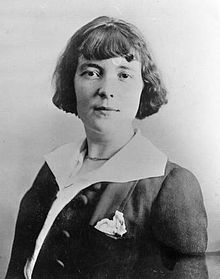
Katherine Mansfield (1888-1923) is New Zealand's most famous author on a global scale. She was a writer of short stories, poetry, letters, journals, and reviews who revolutionised the way short stories were written in English. She was a modernist and a rebel who made the most of her 34-year life. Even before her death at the age of thirty-four, she had established herself as one of the most gifted writers of the modern short storey.
A Truly Beautiful Mind
Lesson-4
A Truly Beautiful Mind
By Albert Einstein
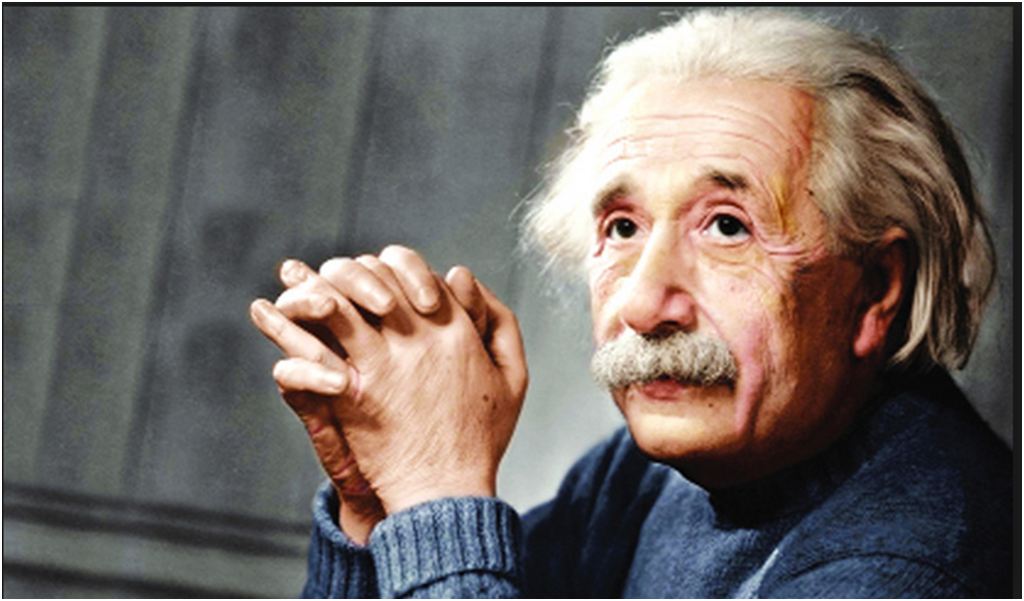
A Truly Beautiful Mind Introduction
Albert Einstein is the subject of this chapter. He was a brilliant scientist. The chapter's title, 'A Truly Beautiful Mind,' refers to Albert Einstein. This is a brief biography of Albert in which some of his qualities are highlighted, such as his interest in mathematics and physics, as well as his humanitarian qualities.The title, 'A Truly Beautiful Mind,' begs the question of how a scientist's mind can be beautiful. This is due to the fact that we will be discussing another aspect of Einstein in this lesson. He was a good man. He advocated for world peace and non-violence, which is why the title refers to him as having a truly beautiful mind.
A Truly Beautiful Mind Summary
Albert Einstein was born on March 14, 1879, in Ulm, Germany. He couldn't speak until he was two and a half years old, and when he did, he repeated every word twice. His playmates thought he was boring, and his mother thought he was insane due to his abnormally large head. His headmaster thought he was stupid and useless at school. He, on the other hand, proved them all wrong. He began playing the violin at the age of six, at the insistence of his mother. He honed his skills as a violinist. His family relocated to Munich when he was 15 years old. He left because he was uncomfortable with the school's strict discipline.
After finishing his education, he enrolled at the University of Zurich, where the atmosphere was more liberal and open to new ideas and concepts. He expressed a stronger interest in physics and mathematics. At the university, he met Mileva Maric, a fellow student. She was both intelligent and clever. They later married and had two sons, but their marriage did not last and they divorced in 1919.
Albert worked as a technical expert in Bern's patent office after finishing his education. Here, he secretly worked on his theory of relativity. In 1915, he published his paper on special theory of relativity, which was followed by the now-famous equation E = mc2. In 1915, he published his paper on the General Theory of Relativity, which defined gravity in an entirely new way. He rose to fame as a result of this theory. During the 1919 solar eclipse, his theory proved to be correct, and it revolutionised physics. As the Nazis took power in Germany in 1933, he emigrated to the United States. He did not want his finding and research to be used for destruction.
When Germany discovered the principle of nuclear fission in 1938, he was the first person to write to President Franklin D. Roosevelt about the dangers of atomic bombs. When America dropped the Atomic Bombs on Nagasaki and Hiroshima in 1945, he was deeply hurt and petitioned the United Nations for the formation of a world government to prevent such devastation from happening again. In his later years in politics, he advocated for world peace and democracy. In 1955, he died at the age of 76.
A Truly Beautiful Mind Lesson Explanation
ALBERT Einstein was born on 14 March 1879 in the German city of Ulm, without any indication that he was destined for greatness.
- destined: fate, a predetermined set of events that has to happen in the future.
Albert Einstein was born on March 14, 1879. He was born in the German city of Ulm. Nobody could have predicted when he was a child that he would one day become a great scientist. He was just like the other kids.
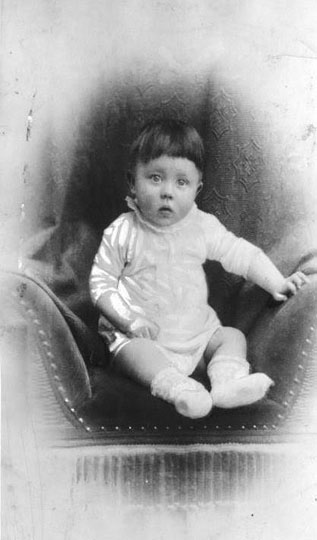
On the contrary, his mother thought Albert was a freak.
- freak: a word used disapprovingly to talk about a person who is unusual and doesn’t behave, look or think like others
Albert's mother thought he was a freak because he didn't act, talk, or look like other people. He was not like other children his age. He acted strangely. In comparison to other children, he appeared to be less intelligent.
To her, his head seemed much too large.
Albert's mother thought the little boy's head was a little too big in comparison to the heads of other children.
At the age of two-and-a-half, Einstein still wasn’t talking.
Albert Einstein began speaking when he was two and a half years old.
When he finally did learn to speak, he uttered everything twice.
- Uttered: spoke
Finally, when Einstein began speaking, he would repeat the words.
Einstein did not know what to do with other children, and his playmates called him “Brother Boring.”
His playmates used to refer to him as "brother boring" because he kept to himself and did not interact with them.
So the youngster played by himself much of the time.
Einstein kept to himself at all times. He used to only play with himself.
He especially loved mechanical toys.
Since his childhood, he has been a fan of mechanical toys, which are toys that use some kind of machinery, such as automated cars and aeroplanes.
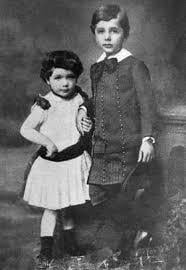
Looking at his newborn sister, Maja, he is said to have said: “Fine, but where are her wheels”?
When his sister was born, he couldn't see her feet because she was so small. He was wondering where the baby's wheels, i.e. the baby's feet, were. Because Albert Einstein used to play with toys, and all of the toys had wheels, Maja appeared to him to be a toy as well, and he may have wondered where her wheels were.
A headmaster once told his father that what Einstein chose as a profession wouldn’t matter, because “he’ll never make a success at anything.”
Einstein's father was told by the headmaster of Einstein's school that Einstein would never be successful in whatever profession he chose.
Einstein began learning to play the violin at the age of six, because his mother wanted him to; he later became a gifted amateur violinist, maintaining this skill throughout his life.
- amateur: doing something for personal enjoyment rather than as a profession, something which is your hobby and you do it as a pastime.
Einstein was an excellent violinist; he began playing the violin at the age of six because his mother encouraged him to do so. He had been an amateur violinist his entire life, playing the violin as a hobby rather than a profession.
But Albert Einstein was not a bad pupil. He went to high school in Munich, where Einstein’s family had moved when he was 15 months old and scored good marks in almost every subject.
- pupil: student
Albert Einstein was an excellent student. He attended a Munich school because his family relocated from Ulm to Munich when he was 15 months old, and he excelled in almost every subject.
Einstein hated the school’s regimentation and often clashed with his teachers.
- regimentation: order or discipline taken to an extreme
Einstein disliked the strict discipline at the school where he attended. As a result, he frequently disagreed with and opposed his teacher's viewpoints.
At the age of 15, Einstein felt so stifled there that he left the school for good.
- Stifled: unable to breathe; suffocated
- Left the school for good: left school forever.
Einstein was so suffocated in that school that he couldn't follow the strict discipline, so he left forever.
The previous year, Albert’s parents had moved to Milan, and left their son with relatives.
Albert Einstein had left the school a year before because his parents had relocated to Milan, Italy. Albert was left with his relatives in Munich.
After prolonged discussion, Einstein got his wish to continue his education in German-speaking Switzerland, in a city which was more liberal than Munich.
- liberal: willing to understand and respect others opinions
Albert couldn't keep up with the discipline at his old school in Munich. He had a long discussion with his family and relatives before his parents agreed to enroll him in a Swiss school where the language of communication was German.
Einstein was highly gifted in mathematics and interested in physics, and after finishing school, he decided to study at a university in Zurich.
Einstein was a good student; he was gifted in mathematics, so he excelled in mathematics, and he was also interested in physics.
But science wasn’t the only thing that appealed to the dashing young man with the walrus moustache.
- Walrus is a shape of Moustache.
Science was not the only thing that drew Einstein's attention as a handsome young man. He was interested in something other than science.
He also felt a special interest in a fellow student, Mileva Maric, whom he found to be a “clever creature.”
Aside from Math and Physics, Albert Einstein had a crush on one of his classmates, Mileva Maric. He thought she was extremely clever, sharp, and intelligent.
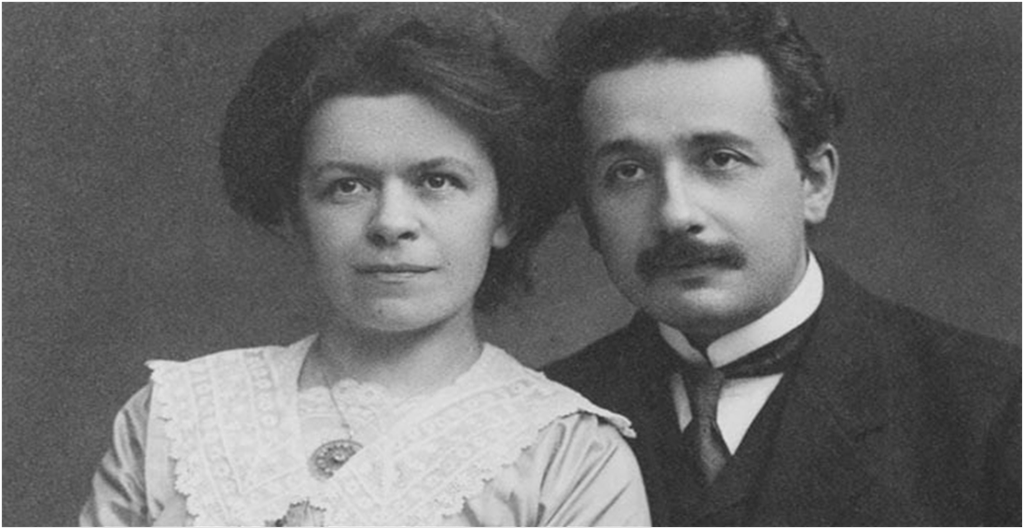
This young Serb had come to Switzerland because the University in Zurich was one of the few in Europe where women could get degrees.
They met at Zurich University. Mileva Maric was a Serbian citizen (that is why she is called a Serb). She moved to Switzerland from Serbia because the University of Zurich was one of the few in Europe that granted degrees to female students.
Einstein saw in her an ally against the “philistines”—those people in his family and at the university with whom he was constantly at odds.
- ally: a friend or an associate
- philistine: a word used disapprovingly to talk about people who do not like art, literature or music
- To be at odds means to be in the opposition of someone, to be against someone.
Einstein considered Mileva to be a friend because she shared his interests in art, literature, and music. This was something they both had in common. Having an interest in art, literature, or music was not considered desirable back then. People who were interested in art, literature, or music used to refer to their opponents as 'philistines.' Many people at the university, including Albert Einstein's family, were opposed to this. So, in the face of such people, Albert Einstein and Mileva Maric's unity aided them in dealing with the situation.
The couple fell in love. Letters survive in which they put their affection into words, mixing science with tenderness. Wrote Einstein: “How happy and proud I shall be when we both have brought our work on relativity to a victorious conclusion.”
Albert Einstein and Mileva Maric fell in love and wrote love letters to each other to express their feelings. They used to write letters in which they combined science with their emotions. Einstein once mentioned his scientific invention and stated that he would be very proud on that day when they would finally finish their paper on the theory of relativity.
In 1900, at the age of 21, Albert Einstein was a university graduate and unemployed.
Albert Einstein was 21 years old in 1900, and he had just graduated from university but was unemployed.
He worked as a teaching assistant, gave private lessons and finally secured a job in 1902 as a technical expert in the patent office in Bern.
- patent: a document which gives the rights of an invention to an inventor
Albert Einstein worked as a Teaching Assistant and also gave private lessons from 1900 to 1902. In 1902, he finally got a job in Bern. Bern is a German city. He was hired as a Technical Officer at a patent office in Bern.
While he was supposed to be assessing other people’s inventions, Einstein was actually developing his own ideas in secret.
Einstein was supposed to examine other people's inventions and grant them a patent. On the other hand, he was secretly creating his own inventions as well.
He is said to have jokingly called his desk drawer at work the “bureau of theoretical physics.”
Einstein later stated that the desk at which he worked was the theoretical physics office because it was only there that he began working on his inventions.
One of the famous papers of 1905 was Einstein’sSpecial Theory of Relativity, according to which time and distance are not absolute.
- absolute: measured in itself, not in relation to anything else
Einstein published his first paper in 1905. It was all about the'special theory of relativity.' It was stated in this publication that the measurement of time and distance is not absolute and is dependent on something else.
Indeed, two perfectly accurate clocks will not continue to show the same time if they come together again after a journey if one of them has been moving very fast relative to the other.
According to the theory, if two clocks are moving, they will not display the same time. One clock will tick more quickly than the other.
From this followed the world’s most famous formula which describes the relationship between mass and energy:
E = mc2(In this mathematical equation, E stands for energy, m for massand c for the speed of the light in a vacuum (about 300,000 km/s).
This theory of relativity provided us with the fundamental formula of physics – E = mc2. E denotes energy, m the mass of the object, and c the speed of light in a vacuum. (A vacuum is defined as an absence of air, and the speed of light in a vacuum is nearly 300,000 km/s.) To put it another way, Einstein said that sitting with a nice girl for two hours feels like two minutes. On the other hand, if you sit on a hot stove for two minutes, it feels like two hours—this is the effect of relativity. As a result, each individual will perceive the timing differently.
While Einstein was solving the most difficult problems in physics, his private life was unravelling.
- unraveling: starting to fail
Despite the fact that he was solving complex physics problems for the rest of the world, his personal life was becoming problematic. In his personal life, he began to fail.
Albert had wanted to marry Mileva right after finishing his studies, but his mother was against it.
Albert Einstein desired to marry Mileva Maric soon after completing his studies, but his mother, Pauline Einstein, was opposed.
She thought Mileva, who was three years older than her son, was too old for him.
Pauline thought Mileva Maric was three-year-old elder than albert, was too old for him.
She was also bothered by Mileva’s intelligence. “She is a book like you,” his mother said. Einstein put the wedding off.
Pauline thought Mileva was very intelligent for a wife, and she told Einstein that Mileva was like a book to him. Because his mother was opposed to the marriage, he called off his wedding to Mileva.
The pair finally married in January 1903, and had two sons.
Albert Einstein married Mileva Maric in 1903, and the couple had two sons.
But a few years later, the marriage faltered.
- faltered: became weak
Their marriage ended in divorce.
Mileva, meanwhile, was losing her intellectual ambition and becoming an unhappy housewife.
Mileva Maric was very intelligent, but as a housewife, she was unable to fulfil her ambitions. She was unhappy because she was unable to fulfil her ambitions.
After years of constant fighting, the couple finally divorced in 1919.
Mileva was dissatisfied with her marriage because she was unable to pursue her career goals, so they divorced in 1919 after a long struggle.
Einstein married his cousin Elsa the same year.
Albert Einstein married for the second time in his life. He married Elsa, his cousin.
Einstein’s new personal chapter coincided with his rise to world fame.
Another thing happened around the time Einstein married Elsa. It was Einstein's rapid rise to global fame. Einstein rose to international acclaim. Everyone regarded him as a brilliant scientist.
In 1915, he had published his General Theory of Relativity, which provided a new interpretation of gravity.
In 1915, he published another paper based on the General Theory of Relativity that provided a new interpretation of gravity.
An eclipse of the sun in 1919 brought proof that it was accurate.
There was a solar eclipse in 1919 that proved Albert Einstein's General Theory of Relativity was correct.
Einstein had correctly calculated in advance the extent to which the light from fixed stars would be deflected through the sun’s gravitational field. The newspapers proclaimed his work as “a scientific revolution.”
- deflected: changed direction because it hit something
Albert Einstein calculated that a solar eclipse would occur in 1919 in the year 1915. The apparent position of the stars would change as a result. His calculation was correct. As a result, Albert Einstein's work was declared to be a scientific revolution.
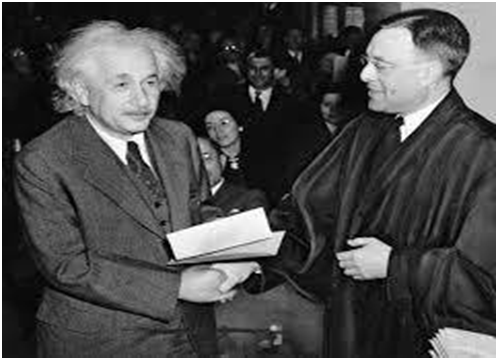
Einstein received the Nobel Prize for Physics in1921.
- The Nobel Prize was based on the will of the famous Swedish scientist, a scientist who belongs to Sweden, Alfred Nobel. It was established in 1895 and the first Nobel Prize was given in the year 1901.
In 1921, Einstein was awarded the Nobel Prize in Physics.
He was showered with honors and invitations from all over the world and lauded by the press.
He was honoured and received invitations from all over the world. The press praised him as well.
When the Nazis came to power in Germany in1933, Einstein emigrated to the United States.
- Emigrated: leave one’s own country in order to settle permanently in another
When Nazis took over Germany in 1933 (the famous Nazi ruler was Adolf Hitler), Einstein left Germany and relocated to the United States of America forever.
Five years later, the discovery of nuclear fission in Berlin had American physicists in an uproar.
- in an uproar: very upset
After 5 years, the Germans discovered nuclear fission – the process by which nuclear or atomic bombs are created. This procedure was planned in Berlin. As a result, all physicists in America were outraged, fearing that the technology would be misused.
Many of them had fled from Fascism, just as Einstein had, and now they were afraid the Nazis could build and use an atomic bomb.
Because of Fascism, many scientists fled to the United States. (Fascism was a dictatorial concept that began in Europe with the rule of Benito Mussolini in Italy.) The scientists were all concerned that the Nazis would misuse the atomic bomb.
At the urging of a colleague, Einstein wrote a letter to the American President, Franklin D.
Roosevelt, on 2 August 1939, in which he warned:“A single bomb of this type . . . exploded in a port,might very well destroy the whole port together with some of the surrounding territory.”
On August 2, 1939, Albert Einstein was asked by a colleague to write a letter to President of the United States, Franklin D. Roosevelt. He forewarned him that Germany's atomic bomb was extremely powerful. If one of these bombs exploded near a port, it would not only destroy the port itself, but also the surrounding territory. This demonstrates Einstein's humanitarianism. He desired the best for the people and world peace. That is why he wrote to the president of the United States to express his concern and to warn him.
His words did not fail to have an effect.
Franklin D. Roosevelt was influenced by Albert Einstein's letter.
The Americans developed the atomic bomb in a secret project of their own and dropped it on the Japanese cities of Hiroshima and Nagasaki in August 1945.
The Americans secretly developed the atomic bomb and dropped it on two Japanese cities, Hiroshima and Nagasaki. The Germans had only recently developed the atomic bomb, which they did not use against any country, but America did.
Einstein was deeply shaken by the extent of the destruction.
There was a lot of destruction, and Einstein was shaken.

This time he wrote a public missive to the United Nations.
- missive: letter, especially long and official
He addressed a formal letter to the United Nations Organization.
In it he proposed the formation of a world government. Unlike the letter to Roosevelt, this one made no impact.
Albert Einstein proposed establishing a world government in a letter, but this proposal did not come to fruition.
But over the next decade, Einstein got ever more involved in politics —agitating for an end to the arms buildup and usinghis popularity to campaign for peace and democracy.
Albert Einstein was involved in World Peace for another ten years. He was involved in politics, and his agenda was to stop countries from collecting weapons and developing weapons. He advocated for global peace and democracy. His main goals were world peace and human freedom.
When Einstein died in 1955 at the age of 76, he was celebrated as a visionary and world citizen as much as a scientific genius
- visionary: a person who can think about the future in an original and intelligent way
Einstein had the ability to predict the future. When he died at the age of 76 in 1955, the world remembered him as a visionary. He was a global citizen as well as a scientific genius.
About the Author
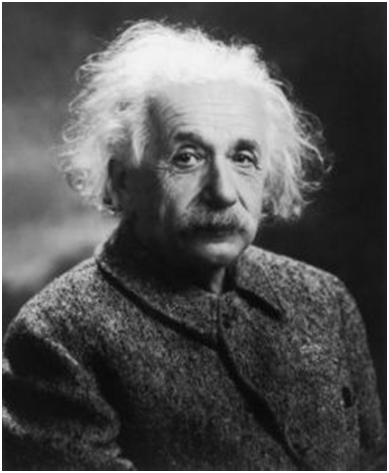
Albert Einstein (1916-1995) was a theoretical physicist who published the special and general theories of relativity as well as other contributions to physics. His work has also had an impact on the philosophy of science. Albert Einstein published four papers that revolutionised science in June 1905.
The Snake and the Mirror
Lesson-5
The Snake and the Mirror
By Vaikom Muhammad Basheer
[translated from the Malayalam by V. Abdulla]
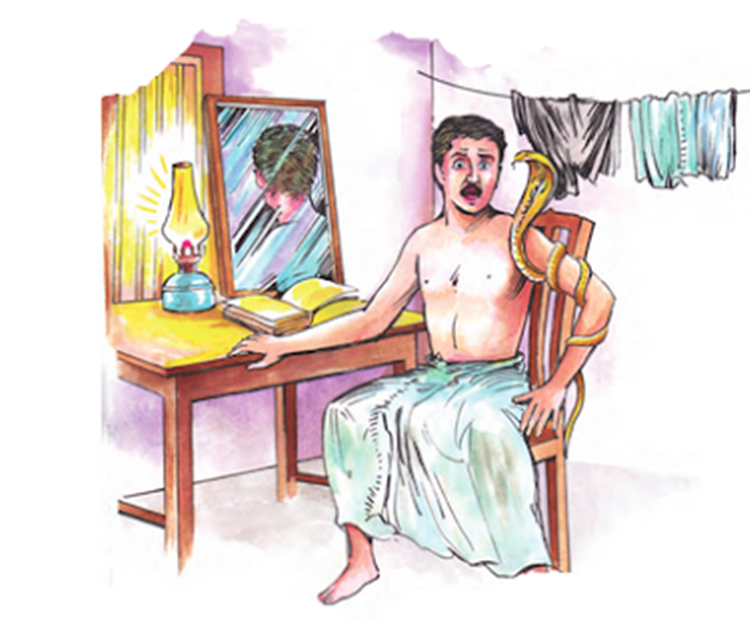
The Snake and the mirror Introduction
The storey is a narrative within a storey. The author tells us a storey that a homoeopathic doctor told him. The snake and the mirror, as implied by the title, are the two most important elements in the storey. When this homoeopathic doctor came into contact with a snake, the snake fell on the doctor. The snake became more interested in its reflection in the mirror, and the doctor's life was saved.
The Snake and the mirror Summary
It tells the storey of a snake encounter with a homoeopathic doctor. The doctor resided in a small rented room that served as an outhouse. It had two windows as well as a tiled roof. The tiles were held up by gables that rested on the beam, and there was no electricity in the room. The place was rat-infested.
On a hot summer night, the doctor ate at a restaurant and then went home. tHe lit the kerosene lamp, removed his coat and shirt, and moved the two windows to open. He sat down in the chair and pulled out a medical book to read. On the table, there was a large mirror and a lamp. He sat in front of the mirror, admiring himself, because it was too hot to sleep and he had nothing better to do. He planned to improve his appearance because he was an eligible bachelor. His thoughts gradually shifted from self-admiration to marriage planning. He planned to marry a wealthy doctor with a successful practise, and he chose a fat lady as his wife so she wouldn't be able to run and catch him.
He was so engrossed in his daydreaming that he didn't notice the sudden silence. The rats had stopped scurrying, and he could hear something falling behind him. However, he was slow to respond. A snake had wriggled over the back of the chair and landed on his shoulders by the time he turned around to look. It was wrapped around his left arm, just above the elbow. It was a dangerous cobra, and its hood was only three inches away from his face. The doctor sat there like a stone statue, afraid to move for fear of being bitten by the snake. He considered the various medicines he had and whether any of them would be effective enough to save him if the snake did bite him.
In this moment of death fear (he realised the presence of God). God had punished him for being too arrogant and proud. He realised he was nothing more than a mere human, a poor man with nothing to brag about. The snake crawled off and sat on the table in front of the mirror the moment he realised his true worth. The doctor stood up quietly and rushed out the door. When he returned the next morning, all of his belongings had been robbed except for his filthy vest, which was too filthy even for the thief.
The Snake and the mirror Lesson Explanation
“HAS a snake ever coiled itself round any part of your body? A full-blooded cobra?” All of us fell silent. The question came from the homeopath. The topic came up when we were discussing snakes. We listened attentively as the doctor continued with his tale.
It was a hot summer night; about ten o’clock. I had my meal at the restaurant and returned to my room. I heard a noise from above as I opened the door.
The storey is being told by a homoeopathic doctor. He asks the writer and the group whether anyone has ever been surrounded by a cobra snake. Fear of the cobra snake caused the audience to fall silent. The doctor then told his storey. It was a hot summer night, almost ten o'clock, and he was on his way home from the restaurant. The doctor heard a noise from above as he opened the door to his room, but he did not react because he was used to such noises.
The sound was a familiar one.
One could say that the rats and I shared the room.
He was used to hearing noises like this. Rats were making a noise. He was used to the noise because there were so many rats in his room.
I took out my box of matches and lighted the kerosene lamp on the table.The house was not electrified; it was a small rented room.
Because there was no light in the doctor's room, he used a match box to light the kerosene lamp. He'd gotten a small room on rent.
I had just set up medical practice and my earnings were meagre. I had about sixty rupees in my suitcase. Along with some shirts and dhotis I also possessed one solitary black coat which was then wearing.
- meagre: small in quantity.
- possessed: had
- solitary: single
He was earning very little because he had only recently begun his medical practise. That's why he was living in such deplorable, filthy conditions. He informed the writer that he only had sixty rupees in his bag. He also mentioned that he had some shirts and dhotis to wear. He was also wearing a black-colored coat at the time of the incident.
I took off my black coat, white shirt and not-so white vest and hung them up.
He took off his coat, shirt, and vest. He claims that the vest was not as white as it should have been, implying that it was dirty.
I opened the two windows in the room. It was an outer room with one wall facing the open yard. It had a tiled roof with long supporting gables that rested on the beam over the wall. There was no ceiling. There was a regular traffic of rats to and from the beam.
- Yard is an open area like a garden or veranda.
- gable: upper part of a wall below a sloping roof
Then he pushed to open the windows. The room he had rented was on the outside of the house. And one of the room's walls overlooked the garden. The roof was tiled, and the beams supported the gable. There was no roof inside the room. The beam that supported the gable was infested with rats that entered and exited the room through it.
I made my bed and pulled it close to the wall. I lay down but I could not sleep.
I got up and went out to the veranda for a little air, but the wind god seemed to have taken time off.
- taken time off: to take a day off, take a holiday
He placed his bed near the wall and tried to sleep, but he couldn't. It appeared that the wind god had taken time off, which means that the wind god had taken a day off, he was on vacation, and thus the wind was not blowing at all. He went outside to get some fresh air because he didn't have a fan or a cooler in his room and was feeling hot.
I went back into the room and sat down on the chair. I opened the box beneath the table and took out a book, the Materia Medica. I opened it at the table on which stood the lamp and a large mirror; a small comb lay beside the mirror.
He returned to his room and sat in a chair. And he took out a book called 'Materia Medica' from the box under the table. He kept it on the same table as a lamp, a mirror, and a small comb. He sat down after opening it.
One feels tempted to look into a mirror when it is near one.
I took a look. In those days I was a great admirer of beauty and I believed in making myself look handsome.
He examined his reflection in the mirror as he sat in front of it.
He claims to be a great admirer of beauty. As a young man, he appreciated beautiful things and desired to improve his appearance in order to appear more handsome.
I was unmarried and I was a doctor.I felt I had to make my presence felt.
He was an eligible bachelor because he was unmarried and a doctor. As a result, he wanted to let people know that he was also available.
I picked up the comb and ran it through my hair and adjusted the parting so that it looked straight and neat.
He combed his hair, attempting to properly set it.
Again I heard that sound from above.
He heard the same sound from above while combing his hair but ignored it.
I took a close look at my face in the mirror. I made an important decision — I would shave daily and grow a thin moustache to look more handsome.
He examined himself in the mirror and decided that he would shave daily and grow a thin moustache because he thought it would make him look better and more handsome.
I was after all a bachelor, and a doctor!
- bachelor: a man who is not and has never been married
The doctor reiterates that he was not married and also worked as a doctor. So he wanted to say that he was supposed to be very attractive. He was supposed to be attractive in order to find a better match for himself.
I looked into the mirror and smiled. It was an attractive smile.I made another earth-shaking decision. I would always keep that attractive smile on my face .. to look more handsome.
- earth-shaking decision: something very important.
He praised himself and stated that he had a lovely smile. Another thing he decided was that he would always keep smiling because it made him look better. When the doctor said that 'to keep smiling' was an earth – shattering decision, he was being ironic.
I was afterall a bachelor, and a doctor too on top of it.Again came that noise from above.
- on top of it: to add on to something
Again, he emphasises that he was a bachelor who also happened to be a doctor. He believed he was valuable, which is why he desired to appear attractive.
I got up, paced up and down the room. Then Another lovely thought struck me. I would marry.I would get married to a woman doctor who had plenty of money and a good medical practice. She had to be fat; for a valid reason – If I made some silly mistake and needed to run away she should not be able to run after me and catch me!
- paced: walked
- valid: logical, justifiable
He got up from his chair and began walking up and down the room before deciding on one more thing. He made the decision to marry a wealthy woman doctor with a successful medical practise. Furthermore, the doctor believed that he would marry a fat girl. He had a logical reason for this as well. He reasoned that if he made a mistake and his wife chased him down in rage to hit him, she would not be able to run fast enough to catch him if she was fat.
With such thoughts in my mind I resumed my seat in the chair in front of the table. There were no more sounds from above. Suddenly there came a dull thud as if a rubber tube had fallen to the ground … surely nothing to worry about.
The doctor sat back down in his chair, thinking about all of this. The sound had now stopped, but then something fell down, making the sound of a 'thud.' It felt like a rubber tube had fallen and the doctor was unconcerned.
Even so I thought I would turn around and take a look.
But then he decided to turn around and see what had fallen.
No Sooner had I turned than a fat snake wriggled over the back of the chair and landed on my shoulder.The snake’s landing on me and my turnings were simultaneous.
- wriggled: crawled
- simultaneous: happened at the same time
As soon as the doctor turned around, he noticed that a large snake had crawled over the chair and sat on his shoulders. The doctor's turn around and the snake's landing on his shoulder happened at the same time.
I didn’t jump. I didn’t tremble. I didn’t cry out.There was no time to do any such thing.
He didn't panic, jump, or tremble. He didn't shiver, and he didn't scream. He didn't have time to react because it happened so quickly.
The snake slithered along my shoulder and coiled around my left arm above the elbow.
- slithered: Twisting and crawling motion of the snake
The snake moved in such a way that it wrapped itself like a coil around the doctor's left arm.
The hood was spread out and its head was hardly three or four inches from my face!
- hood: head of the snake.
It was so close to his face, only 3-4 inches away, that if he had moved slightly, the snake could have bitten him.
It would not be correct to say merely that I sat there holding my breath. I was turned to stone. But my mind was very active.
According to the doctor, he was not only holding his breath but had also turned into a stone, much like a statue. Although he remained physically immobile, his mind was very active. He was deliberating on what he should do next.
The door opened intodarkness.In the light of the lamp I sat there like a stone image in the flesh.
He was surrounded by darkness. It was pitch black both outside and inside the room. There was only one light, the light of the lamp, and he sat like a statue in it.
I felt then the great presence of the creator of this world and this universe. God was there.
He began to sense God's presence as he was in trouble. He couldn't do anything, so he began to think about God.
Suppose I said something and he did not like it… I tried in my imagination to write in bright letters outside my little heart the words, ‘O God’.
He decided not to say anything in case he enraged the snake. In his heart, the doctor begged God to save his life.
There was some pain in my left arm. It was as if athick leaden rod — no, a rod made of molten fire — was slowly but powerfully crushing my arm. The Arm was beginning to be drained of all strength.
What could I do?
This snake was in a lot of pain as it coiled itself and wrapped itself around his arm. He felt as if a thick molten lead rod were crushing and breaking his arm. He was helpless. He was powerless to save himself.
At my slightest movement the snake would strike me! Death lurked four inches away.
- strike: attack
- lurked: hid
He was aware that if he moved even slightly, the snake would attack him. Death was four inches away, sitting at a four-inch distance.
Suppose it struck, what was the medicine I had to take? There were no medicines in the room. I was but a poor, foolish and stupid doctor. I forgot my danger and smiled feebly at myself.
- feebly: weakly
He considered what he would do if the snake bit him, what medicine he would take, and then remembered that there was no medicine in his room. He considered himself to be a poor, foolish, and stupid doctor. He was feeling very weak, and since he had no way out of this situation, he smiled at his foolishness.
It seemed as if God appreciated that. The snake turned its head. It looked into the mirror and saw its reflection.
God, according to the doctor, appreciated the doctor's realisation of his mistake. Something good occurred, and the doctor's life was saved. The snake shifted its gaze to the other side and noticed the mirror. When it looked in the mirror, it saw its own reflection.
I do not claim that it was the first snake that had ever looked into a mirror. But it was certain that the snake was looking into the mirror.
It's unlikely that any snake had never looked in the mirror before. But, yes, this snake was staring at itself in the mirror, and the doctor was surprised because the snake was staring at itself in the mirror with great care.
Was it admiring its own beauty?
He reasoned that it might be admiring its beauty.
Was it trying to make an important decision about growing a moustache or using eyeshadow and mascara or wearing a vermilion spot on its forehead?
- vermilion spot: red bindi
The doctor imagines that the snake is imagining different styles, just as he was thinking a few minutes ago when he looked in the mirror at his own face. He speculated that the snake was contemplating growing a moustache, wearing eye shadow and mascara to appear more attractive, or wearing a red bindi on its forehead.
I did not know anything for certain. What sexwas this snake, was it male or female? I will never know; for the snake unwound itself from my armand slowly slithered into my lap. From there it crept onto the table and moved towards the mirror. Perhaps It wanted to enjoy its reflection at closer quarters.
- closer quarters: to get a closer look
The doctor was unsure whether the snake was male or female. And he says he'll never know because it crawled from his arm and moved down into his lap right then. It then jumped and began crawling across the table. It crept up to the mirror and began staring at itself. The doctor suspected that the snake wanted to examine itself and take a closer look at its appearance.
I was no mere image cut in granite. I was suddenly a man of flesh and blood.
- Granite: form of a marble, it’s a stone.
The doctor was no longer just a stone statue. He came back to life as soon as the snake crawled away from him.
Still holding my breath I Got up from the chair. I quietly went out through the door into the veranda. From there I leapt into the yard and ran for all I was worth.
- all I was worth: all the strength that I had
He stood up as the snake crawled out of the doctor's lap. He had stopped breathing until now because he was afraid of the snake. He now quietly exited the house, jumped from the garden, and fled.
“Phew !” Each of us heaved a sigh of relief. Somebody Asked, “Doctor, is your wife very fat?”
Everyone who was listening to the doctor's storey breathed a sigh of relief and took a deep breath when they realised he had been saved. And someone in that group asked him if his wife was overweight.
“No,” the doctor said. “God willed otherwise. Mylife companion is a thin reedy person with the gift of a sprinter.”
- reedy person: a thing or person resembling a tall, thin – leaved plant of the grass family
He responded that his wife was thin and tall, like a reed plant, because God didn't want his wife to be fat, so she was thin and fast.
Someone else asked, “Doctor, when you ran did the snake follow you?”
Another member of the group inquired whether the snake had followed him.
The doctor replied, “I ran and ran till I reached a friend’s house. Immediately I smeared oil all over myself and took a bath. I changed into fresh clothes.
- smeared: covered with
He responded that he ran and ran until he arrived at a friend's house. He had an oil massage, a bath, and changed his clothes there. He had no idea if the snake had chased him because he had not looked behind him.
The next morning at about eight-thirty I took my friend and one or two others to my room to move my things from there. But we found we had little to carry.
- Little to carry means his belonging were stolen and there was nothing much left to carry away.
The following day, around 8:30 a.m., the doctor and two of his friends went to the room to retrieve his belongings. There wasn't a lot to take.
Some thief had removed most of my things.The room had been cleaned out! But not really, the thief had left behind one thing as a final insult!’
“What was that?” I asked.
The doctor said, “My vest, the dirty one.
The fellow had such a sense of cleanliness…! The rascal could have taken it and used it after washing it with soap and water.”
- rascal: a mischievous or cheeky person, especially a child or a man, a naughty person
The majority of his belongings had been stolen, but one remained. He believed that the item he left behind was intended to offend him.
The writer inquired of the doctor as to what the thief had left behind. He replied that he had left the dirty vest that was hanging on the wall. He went on to say that the thief was so concerned with cleanliness that he only left the dirty vest there. He claims that the nefarious thief could have taken it with him, washed it with soap, and used it.
“Did you see the snake the next day, doctor?”
Someone inquired as to whether the doctor had seen the snake the the next day.
The doctor laughed, “I’ve never seen it since. It Was a snake which was taken with its own beauty
- taken with: attracted by
He laughed and replied that he never saw that snake again after that night. Perhaps the snake was drawn to its own beauty, which is why it examined itself so closely in the mirror.
About the Author
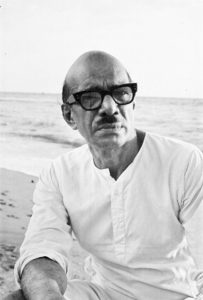
Vaikom Muhammad Basheer (1859-1927) was a Malayalam writer and Indian independence activist. The legend Vaikom Muhammad Basheer holds a remarkable position in the Malayalam Literary arena. With his profound and straightforward writing, a dash of satire, sarcasm, and black humour. He is regarded as one of India's most prominent literary figures. In Kerala, he was a legend.
Packing
Lesson-7
Packing
By Jerome K Jerome (an extract from Three Men in a Boat)

Packing Introduction
The 'Packing' lesson is an extract from Jerome K. Jerome's novel Three Men in a Boat. It humorously describes an incident that occurs when the narrator and his two friends are packing their belongings before going on a boating trip. It emphasises the fact that packing is an art form that only a few people are gifted with.
Packing Summary
Jerome, the story's narrator, was proud of his packing abilities. He had planned a trip with his friends George and Harris. He instructed them to leave the packing to him, to which they readily agreed. Harris cocked his legs on the table and watched Jerome pack while George sat in the easy chair. But this was not what Jerome had in mind. When he said he wanted to do all of the packing himself, he meant he wanted to be in charge of everything and direct his friends to work efficiently under his supervision.
He was angry at them for simply standing around and watching him work. It was unsettling for Jerome to sit idle and watch another person work alone. His vivacious personality compelled him to get up and supervise. When Jerome was packing the bag, Harris noticed that he had forgotten to pack the boots. So he had to open the bag again to pack his boots, and as he was about to close it, he wondered if he had packed his toothbrush. He had nightmares about forgetting to pack his toothbrush whenever he was about to travel. Then he'd wake up and go looking for it.
Then, in the morning, he would pack it before using it, only to have to unpack it again to get it and then repack, forgetting to put the toothbrush back in. Then he had to dash upstairs to fetch it. He always ends up with the toothbrush wrapped in a pocket handkerchief in his pocket. Jerome had to search the entire bag, as is customary. He found George's and Harris' toothbrushes eighteen times, but he couldn't find his own. He eventually found it inside a boot and had to repack.
When he was finished, George asked if the soap was in, but Jerome was so tired that he didn't seem to care. But when he re-strapped the bag, he realised he had packed his spectacles inside, and he had to open it again. Finally, at 10:05 p.m., he finished packing, and George and Harris decided to pack the food hampers. George and Harris began by demonstrating that they were better at packing than Jerome. Jerome was eager to see how things would turn out. They began by breaking a cup, just as he had expected.
Harris then accidentally squashed a tomato by putting strawberry jam on top of it, and he had to pick the tomato out with a teaspoon. In addition, George stepped on the butter. It was now Jerome's turn to sit back and observe them, which irritated them. They stepped on things, threw things behind them, and then couldn't find them when they needed them. They placed the pie at the bottom and piled heavy objects on top of it, which ruined the pies. They poured salt all over the place and worked their magic with the butter.
The butter got stuck to George's slippers. They tried to put it in the kettle after he took it off his slippers, but it wouldn't fit. They placed it on a chair, but Harris sat on it, and the butter stuck to his back. They then went in search of it. After much searching, George discovered that it had been at the back of Harris the entire time, and they finally packed it in the teapot. Then their pet dog, Montmorency, appeared, only to add to the confusion. Montmorency was a mischievous dog whose sole purpose in life was to cause problems and be scolded. Only when he was screamed at did he feel like his day had not been wasted.
So, just as things were about to be packed, he entered the room and sat on them. Montmorency made it a point to reach for his nose whenever Harris or George extended their hand for anything. He got his foot caught in the muck, disorganised the teaspoons, and hampered the lemons. After numerous obstacles and tremendous efforts, the packing was finally completed at 12:50, and Harris sat on the hamper, hoping that nothing was broken. George consoled himself and Harris by saying that if anything was discovered broken, it was because it had already been broken.
They were all tired and decided to get up at half past six a.m. George had already fallen asleep at that point. So George and Jerome put the bath in a place where he could fall into it when he woke up in the morning and went to bed themselves.
Packing Lesson Explanation
I SAID I’d pack.
The writer Jerome liked to pack luggage for trips and announced that he would do the packing.
I rather pride myself on my packing. Packing is one of those many things that I feel I know more about than any other person living. (It surprises me myself, sometimes, how many such things there are.) I impressed the fact upon George and Harris and told them that they had better leave the whole matter entirely to me. They fell into the suggestion with a readiness that had something uncanny about it. George spread himself over the easy-chair, and Harris cocked his legs on the table.
- pride myself on: am proud of
- fell into: here, accepted
- Uncanny: strange, weird
- cocked his legs: bent the legs on the knee as he sat
Jerome believed that his ability to pack luggage was superior to that of others. He requested that his friends George and Harris leave the packing to him. Surprisingly, his offer was accepted immediately by his two friends. George sat comfortably on the easy chair, while Harris sat on the sofa with his knees bent and his feet on the table.
This was hardly what I intended. What I had meant, of course, was that I should boss the job, and that Harris and George should potter about under my directions, I pushing them aside every now and then with, “Oh, you!” “Here, let me do it.” “There you are, simple enough!” — really teaching them, as you might say. Their taking it in the way they did irritate me. There is nothing that irritates me more than seeing other people sitting about doing nothing when I’m working.
- Intended: planned, meant
- potter about: do some unimportant things
When he said he'd pack, he didn't mean that his friends would sit back and relax while he did all the work. He had meant that he would be the boss while they did all the chores. He'd nag and curse them for not knowing the job well enough, and then he'd pitch in to clean up the mess they'd made. He was irritated to see them sitting while he worked.
I lived with a man once who used to make me mad that way. He would loll on the sofa and watch me doing things by the hour together. He said it did him real good to look on at me, messing about.
Now, I’m not like that. I can’t sit still and see another man slaving and working. I want to get up and superintend, and walk around with my hands in my pockets, and tell him what to do. It is my energetic nature. I can’t help it.
- loll on the sofa: to recline or lean in a relaxed manner
- messing about: to waste time doing something without a particular purpose
- sit still: sit without doing anything
- Superintend: supervise, manage
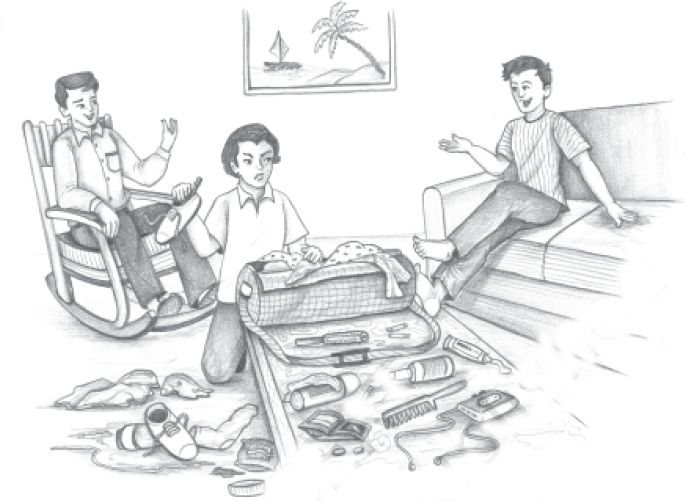
He recollects living with a man who would sit on the sofa all day and watch the writer do all the work. The man would say he liked watching him go around doing all the work. The writer would be enraged by this. The author goes on to say that he couldn't sit back and watch others work like slaves. On the other hand, he enjoyed inspecting their work, walking around with his hands in his pockets, and instructing them on how to do it correctly. He believes that because he was energetic, it was in his nature to act in that manner.
However, I did not say anything but started packing. It seemed a longer job than I had thought it was going to be; but I got the bag finished at last, and I sat on it and strapped it.
“Ain’t you going to put the boots in?” said Harris. And I looked round, and found I had forgotten them. That’s just like Harris. He couldn’t have said a word until I’d got the bag shut and strapped, of course. And George laughed — one of those irritating, senseless laughs of his. They do make me so wild.
- strapped it: closed it
- Wild: mad with anger
The writer said nothing to his friends and began packing. Harris said as he closed it that he had forgotten to pack the boots. Harris, the writer felt, could have reminded him before he closed the bag, but Harris, he thought, was like that! This was followed by George's irritating laughter, which enraged Jerome.
I opened the bag and packed the boots in; and then, just as I was going to close it, a horrible idea occurred to me. Had I packed my toothbrush? I don’t know how it is, but I never do know whether I’ve packed my toothbrush.
Jerome opened the bag in order to keep the boots inside. As he was about to close it, he had a strange thought about whether or not he had kept the toothbrush. He says that he never remembers whether or not he packed the toothbrush.
My toothbrush is a thing that haunts me when I’m traveling and makes my life a misery. I dream that I haven’t packed it, and wake up in a cold perspiration, and get out of bed and hunt for it.
And, in the morning, I pack it before I have used it, and have to unpack again to get it, and it is always the last thing I turn out of the bag; and then I repack and forget it, and have to rush upstairs for it at the last moment and carry it to the railway station, wrapped up in my pocket-handkerchief.
- Haunts: to repeatedly give trouble
- Misery: sad
- cold perspiration: sweat
- Hunt: search
Jerome adds that he always forgets to bring his toothbrush when he travels. He has nightmares about not packing it, wakes up sweating, and searches for it. He packs it before using it in the morning, then unpacks the bag to get the brush and uses it. He forgets to pack it again because it is the last thing that comes out of the bag and he has already repacked it. He rushes to his room at the last minute to retrieve the brush, which he finally wraps in his handkerchief and carries to the railway station in his hand.
Of course I had to turn every mortal thing out now, and, of course, I could not find it. I rummaged the things up into much the same state that they must have been before the world was created, and when chaos reigned. Of course, I found George’s and Harris’s eighteen times over, but I couldn’t find my own. I put the things back one by one, and held everything up and shook it. Then I found it inside a boot. I repacked once more.
- mortal thing: every ordinary thing
- Rummaged: searched in a hurried or careless way
- Chaos: confusion
- Reigned: ruled
Jerome had to take everything out of his bag while looking for his toothbrush, but he couldn't find it. He made a complete mess. He found his friend's brushes several times, but he couldn't find his own. He put everything back into the bag one by one, shaking each item as he went, until he found the brush inside a boot. He then repacked the bag once more.
When I had finished, George asked if the soap was in. I said I didn’t care whether the soap was in or whether it wasn’t; and I slammed the bag shut and strapped it, and found that I had packed my spectacles in it, and had to re-open it.
It got shut up finally at 10.05 p.m., and then there remained the hampers to do. Harris said that we should be wanting to start in less than twelve hours’ time and thought that he and George had better do the rest; and I agreed and sat down, and they had a go.
- didn’t care a hang: show no concern or interest
- Slammed: shut the lid forcefully and loudly
- Hampers: baskets used to carry food, utensils, etc.
When Jerome closed the bag, George inquired if the soap was still inside. Jerome was impatient, so he said he didn't care if it was there or not, closed the lid, and strapped the bag. Then he realised he'd packed his spectacles in it as well, and he had to open it again to get them. Finally, at 10:05 p.m., the bag was closed. They had to then pack the food baskets. Harris advised that because they had less than twelve hours to leave, they should also pack the baskets. Harris decided that he and George would pack the food baskets. Jerome agreed to take a break while his friends packed the baskets.
They began in a light-hearted spirit, evidently intending to show me how to do it. I made no comment; I only waited. With the exception of George, Harris is the worst packer in this world; and I looked at the piles of plates and cups, and kettles, and bottles, and jars, and pies, and stoves, and cakes, and tomatoes, etc., and felt that the thing would soon become exciting.
- light-hearted spirit: to be cheerful
- Evidently: clearly, obviously
- Exception: a person or thing that does not follow the general rule
In a good mood, George and Harris began packing the hampers. They wanted to demonstrate to Jerome that they could pack well. Jerome waited for them to make a mess because he thought Harris was the worst packer in the world. Jerome examined the piles of plates, cups, kettles, and bottles, as well as the jars, pies, cakes, and tomatoes that needed to be packed into the hampers. He reasoned that as the boys messed up, it would be entertaining to watch.
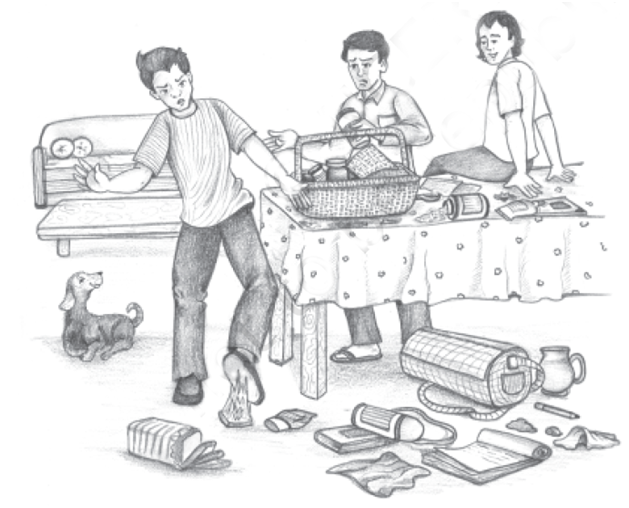
It did. They started with breaking a cup. That was the first thing they did. They did that just to show you what they could do, and to get you interested.
The scene became more interesting when they broke a cup at the beginning. According to Jerome, they broke the cup to demonstrate that they, too, could do so and to make things interesting.
Then Harris packed the strawberry jam on top of a tomato and squashed it, and they had to pick out the tomato with a teaspoon.
- Squashed: crush or squeeze something with force so that it becomes flat, soft, or out of shape
Harris topped the tomatoes with a jar of strawberry jam. The tomatoes were squeezed by the jar, and the damaged tomato was removed with a spoon.
And then it was George’s turn, and he trod on the butter. I didn’t say anything, but I came over and sat on the edge of the table and watched them. It irritated them more than anything I could have said. I felt that. It made them nervous and excited, and they stepped on things, and put things behind them, and then couldn’t find them when they wanted them; and they packed the pies at the bottom, and put heavy things on top, and smashed the pies in.
George then stepped on the butter. Jerome remained silent but sat on the table's edge to observe the action. His friends were irritated by his silence. They became nervous and stepped on the items. They hid the items, and when they needed them later, they couldn't find them. They put the pies on the bottom and piled heavier objects on top of them, smashing the pies.
They upset salt over everything, and as for the butter! I never saw two men do more with one-and two pence worth of butter in my whole life than they did. After George had got it off his slipper, they tried to put it in the kettle. It wouldn’t go in, and what was in wouldn’t come out. They did scrape it out at last, and put it down on a chair, and Harris sat on it, and it stuck to him, and they went looking for it all over the room.
- Upset: overturned
- Scrape: drag or pull
The boys dumped the salt can on everything. Jerome says that the small piece of butter caused a lot of confusion. He had never seen anyone make such a mess with butter worth one and two pence (meaning a very small piece) as they did. George took it out of his slipper and attempted to put it in the kettle. He couldn't do it, so he propped it up on a chair. Harris sat on it, the butter stuck to him, he stood up, and both boys searched the room for the piece of butter.
“I’ll take my oath I put it down on that chair,” said George, staring at the empty seat. “I saw you do it myself, not a minute ago,” said Harris.
- Oath: to swear upon something
George focused his attention on the empty seat where he had placed the butter a few minutes before. He swore an oath of truthfulness that he had placed there only a minute before.
Then they started round the room again looking for it; and then they met again in the centre and stared at one another.
They searched the room once more. They met in the centre of the room, both empty-handed.
“Most extraordinary thing I ever heard of,” said George.
“So mysterious!” said Harris.
Then George got round at the back of Harris and saw it.
“Why, here it is all the time,” he exclaimed, indignantly.
- Indignantly: in a manner indicating anger or annoyance at something perceived as unfair
The disappearance of the butter, according to George, was the most incredible thing he had ever witnessed. The disappearance of the butter, according to Harris, was a mystery. George noticed the butter stuck to Harris's back and stated that it had been there all along.
“Where?” cried Harris, spinning round.
“Stand still, can’t you!” roared George, flying after him.
And they got it off, and packed it in the teapot.
Harris turned around and asked as to its spot. George flew to Harris's back and asked him to stop. They took out the butter and stuffed it inside the teapot.
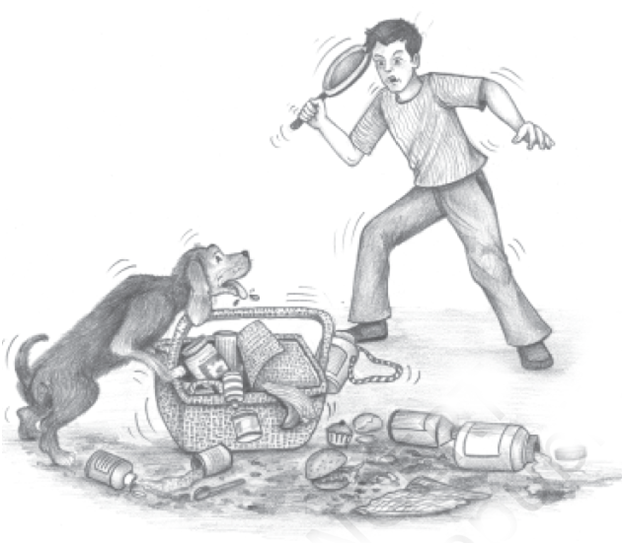
Montmorency was in it all, of course. Montmorency’s ambition in life is to get in the way and be sworn at. If he can squirm in anywhere where he particularly is not wanted, and be a perfect nuisance, and make people mad, and have things thrown at his head, then he feels his day has not been wasted.
- sworn at: get scolded
- Squirm: to wriggle or twist one’s body
- Nuisance: to cause inconvenience or annoyance
Montmorency, Jerome's pet dog, was present throughout. His goal was to interrupt everyone and then be scolded for it. Jerome continues, "If Montmorency was able to twist into a place and cause a nuisance by angering people and getting things thrown at him in return, he felt he had used the day well."
To get somebody to stumble over him, and curse him steadily for an hour, is his highest aim and object; and, when he has succeeded in accomplishing this, his conceit becomes quite unbearable.
- Stumble: to trip over a hurdle
- Curse: scold
- Conceit: here, his pride in himself
Montmorency's goal was for people to trip him up and scold him. By doing so, he felt he had accomplished his goal and would be proud of his accomplishment.
He came and sat down on things, just when they were wanted to be packed; and he laboured under the fixed belief that, whenever Harris or George reached out their hand for anything, it was his cold damp nose that they wanted. He put his leg into the jam, and he worried about the teaspoons, and he pretended that the lemons were rats, and got into the hamper and killed three of them before Harris could land him with the frying pan.
- Worried: disturbed
- Pretended: to behave as if something is true when you know that it is not
- land him: hit or punch someone
Montmorency sat on the things that needed to be packed. When George and Harris reached for the things to be packed, he assumed they were reaching for his cold, wet nose and would bring it forward for them. He stepped into the jam bottle, shook the teaspoons, pretended the lemons were rats, and then stepped into the hamper to kill these rats. Harris stopped him by hitting him with a frying pan.
Harris said I encouraged him. I didn’t encourage him. A dog like that doesn’t want any encouragement. It’s the natural, original sin that is born in him that makes him do things like that.
Harris blamed Jerome for encouraging Montmorency to cause all of this trouble. Jerome stated that a dog like Montmorency didn't require any encouragement. It was born to be and act in this manner.
The packing was done at 12.50; and Harris sat on the big hamper, and said he hoped nothing would be found broken. George said that if anything was broken it was broken, which reflection seemed to comfort him. He also said he was ready for bed. We were all ready for bed. Harris was to sleep with us that night, and we went upstairs.
- Reflection: thought
They had finished packing the hampers by 12:50. Harris sat on it, hoping that nothing would break in it. George was unconcerned, stating that it didn't matter if something broke. They went upstairs to sleep as they were getting ready for bed.
We tossed for beds, and Harris had to sleep with me. He said :
“Do you prefer the inside or the outside, J.?”
I said I generally preferred to sleep inside a bed.
Harris said it was odd.
George said:
“What time shall I wake you fellows?”
Harris said:
“Seven.”
I said:
“No — six,” because I wanted to write some letters.
- Tossed: throw something somewhere lightly or casually
As they settled into their beds, Harris inquired as to whether Jerome preferred the inside or outside of the bed. Jerome stated that he would rather sleep on the inside of the bed. This seemed odd to Harris. George asked them what time he should wake them up. Harris said seven, while Jerome said he needed to get up at six a.m. to write some letters.
Harris and I had a bit of a row over it, but at last split the difference, and said half-past six. “Wake us at 6.30, George,” we said.
- a bit of a row: an argument
- split the difference: this means that they agreed on 6.30 because it was halfway between six and seven
Harris and Jerome debated the time, finally settling on half past six, each accommodating his time by half an hour.
George made no answer, and we found, on going over, that he had been asleep for sometime; so we placed the bath where he could tumble into it on getting out in the morning, and went to bed ourselves.
- Tumble: to fall quickly and without control
George didn't respond because he was sleeping. Harris and George caused havoc by placing the bathtub next to George's bed so that when he awoke, he would fall into it, apparently so that he could take a bath as soon as he awoke.
About the Author
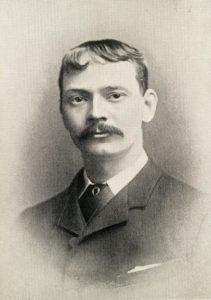
Klapka, Jerome Jerome was an English humourist and writer best known for his comic travelogue Three Men in a Boat. Other works include the essay collections Idle Thoughts of an Idle Fellow and Second Thoughts of an Idle Fellow, as well as the sequel to Three Men in a Boat, Three Men on the Bummel, and several other novels.
My Childhood
Lesson-6
My Childhood
By A.P.J. Abdul Kalam [an extract from Wings of Fire]
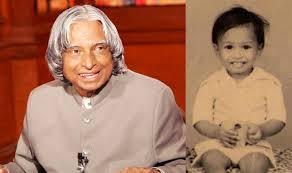
My Childhood Introduction
Abdul Kalam's biography is titled "Wings of Fire," and the chapter 'My Childhood' discusses A.P.J Abdul Kalam's childhood. He was both the President of India and a brilliant scientist. APJ discusses his upbringing, his parents, and his siblings. He tells us about his friends and the events that shaped his childhood.
My Childhood Summary
"My Childhood" is an extract from APJ Abdul Kalam's biography, "Wings of Fire." He was a great scientist as well as India's 14th President. In 1931, he was born in the Tamil Nadu island town of Rameswaram to a middle-class Muslim family.
His parents, teachers, and friends all had a big influence on him when he was a kid. His father, Jainulabdeen, was not a well-educated man, but he was generous and kind. He was not wealthy, but he provided Abdul and his siblings with a secure childhood. Abdul inherited his father's honesty and self-discipline, as well as his mother's faith in goodness and deep kindness.
Kalam earned his first money by assisting his cousin, Samsuddin, who distributed newspapers in Rameswaram. He had three close friends as a child: Ramanadha Sastry, Aravindam, and Sivaprakash. When he was in fifth grade, a new teacher told him not to sit in the front row with the upper caste Brahmin boys. As he approached the last row, Abdul noticed Ramanadha Sastry sobbing. This left an indelible impression on Abdul.
Sivasubramania Iyer, Abdul's science teacher, also had a big influence on him. He taught him the value of breaking down social barriers. Iyer invited him to dinner at his house. His wife refused to serve a Muslim boy food in her pure kitchen. Iyer served him his meal with his own hands and sat beside him to eat it. He convinced his wife to serve the meal with her own hands, and thus succeeded in changing her conservative attitude.
Abdul Kalam sought permission from his father to leave Rameswaram and study at the district headquarters in Ramanathapuram for higher education. Abdul, according to his father, had to travel a long distance in life, much like a seagull bird that flies long distances. He soothed APJ's hesitant mother by reciting Kahlil Gibran's poem 'Your children.' He stated that her children could not be ruled by her because they had their own ideas. They were not hers, but rather the result of life's desire for itself. He asked her to give them the freedom to act on their ideas.
My Childhood Lesson Explanation
I was born into a middle-class Tamil family in the island town of Rameswaram in the erstwhile Madras State.
- erstwhile: former

A.P.J Abdul Kalam was born into a middle-class Tamil family in Rameswaram, an island town in the state of Tamil Nadu in the Bay of Bengal. This state is now known as Tamil Nadu, but when he was born, it was known as Madras state.
My father, Jainulabdeen, had neither much formal education nor much wealth; despite these disadvantages, he possessed great innate wisdom and a true generosity of spirit.
- innate: inborn; (a quality or feeling) in one’s nature
- generosity of spirit: his soul sought to help others who were needy
Jainulabdeen Abdul Kalam was APJ Abdul Kalam's father's name. APJ says that his father was not very wealthy, did not have wealth, and was not highly educated, but despite these disadvantages, he possessed some other characteristics: he was naturally very wise and generous.
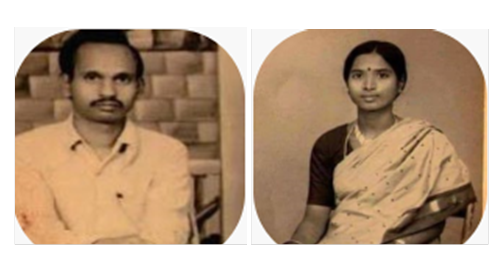
He had an ideal helpmate in my mother, Ashiamma.
Ashiamma was APJ's mother's name. She used to lend a hand to his father. She was a huge help and support to him.
I do not recall the exact number of people she fed every day, but I am quite certain that far more outsiders ate with us than all the members of our own family put together.
APJ's mother was also generous and caring. She used to feed a large number of people every day. She fed more people from outside their family than the total number of members in their family.
I was one of many children — a short boy with rather undistinguished looks, born to tall and handsome parents.
- undistinguished: ordinary or common
Abdul Kalam had many siblings, and he describes himself as having small height and average looks, with no distinguishing features. On the contrary, his parents were both tall and attractive. They were attractive. APJ was not born with their physical characteristics.
We lived in our ancestral house, which was built in the middle of the nineteenth century. It was a fairly large pucca house, made of limestone and brick, on the Mosque Street in Rameswaram.
- Pucca House means a house made of bricks, cement and limestone.
The ancestral home of APJ Abdul Kalam was quite old. It was constructed in the nineteenth century. It was a pucca house constructed of bricks and limestone. It is located on Rameswaram's Mosque Street.
My austere father used to avoid all inessential comforts and luxuries. However, all necessities were provided for, in terms of food, medicine or clothes. In fact, I would say mine was a very secure childhood, both materially and emotionally.
- austere: simple, strict and severe
- secure: safe
- Materially means in terms of things like clothes food, medicine
- emotionally means in terms of love and affection.
APJ's father was straightforward, but strict. He desired to live a simple life, and he taught his children not to waste money on unnecessary spending. APJ says that his father used to avoid unnecessary comforts and luxuries. He provided them with everything they needed, including food, clothing, and medicines. APJ says that his parents met all of his needs, whether they were material or in the form of their love and affection. This demonstrates that he possesses the quality of gratitude. APJ is grateful to his parents for everything they have done for him.
The Second World War broke out in 1939, when I was eight years old.
When the Second World War broke out in 1939, APJ was eight years old. As a result, we can conclude that he was born in 1931.
For reasons I have never been able to understand, a sudden demand for tamarind seeds erupted in the market. I used to collect the seeds and sell them to a provision shop on Mosque Street. A day’s collection would fetch me the princely sum of one anna.
- tamarind seeds: kind of fruit
- princely sum: generous amount (here, ironic)
- anna: an old Indian coin, worth about six paise
Market demand for tamarind seeds has increased. APJ used to collect tamarind seeds and sell them to a provision shop on Mosque Street. He would only be paid one anna, which is equal to six pence. When he refers to it as a "princely sum" – something very large and valuable – he is being ironic because the amount was very small. This one anna was worth a lot of money to him at the time.
My brother-in-law Jallaluddin would tell me stories about the War which I would later attempt to trace in the headlines in Dinamani.
- Dinamani: a tamil daily newspaper.
Jalaluddin, APJ Abdul Kalam's brother–in–law, used to tell him stories about the ongoing World War. Later, APJ would read the newspaper 'Dinamani' and look for news about the same stories.
Our area, being isolated, was completely unaffected by the War. But soon India was forced to join the Allied Forces and something like a state of emergency was declared.
- isolated: Lonely, cut-off
- Allied Forces: the armies of U.K., U.S.A. and Russia during the Second World War
Rameswaram was a small island town located far from the mainland. As a result, it was initially unaffected by World War II. However, after some time, India was forced to enter the war and join the Allied Forces. The country was then declared to be in a state of emergency. (During an emergency, the President's rule is enforced throughout the country. It's similar to a curfew in the country. Many of the people's privileges are being withdrawn.)

The first casualty came in the form of the suspension of the train halt at Rameswaram station. The newspapers now had to be bundled and thrown out from the moving train on the Rameswaram Road between Rameswaram and Dhanuskodi.
- casualty: loss
- suspension: end stop
The cancellation of the train stoppage at the Rameswaram station was the first impact of World War II on the people of Rameswaram. Previously, the train from India would stop at Rameswaram station before continuing on to Dhanushkodi. However, the halt has now been cancelled, and the train has proceeded from India to Dhanushkodi without stopping at Rameswaram. The newspaper bundle, which was bound for Rameswaram, was thrown out of the moving train as it reached Rameshwaram Road.
That forced my cousin Samsuddin, who distributed newspapers in Rameswaram, to look for a helping hand to catch the bundles and, as if naturally, I filled the slot.
Samsuddin helped me earn my first wages.
- filled the slot – fit into a place easily
Samsuddin, APJ Abdul Kalam's cousin, used to distribute newspapers in Rameswaram. He needed someone to assist him in catching the train after the train stoppage was cancelled and the newspaper bundle was thrown out of the moving train. Samsuddin was assisted by APJ in catching the bundle and distributing the newspapers. In exchange, Samsuddin paid him a salary, which was APJ's first income.
Half a century later, I can still feel the surge of pride in earning my own money for the first time.
- pride: sudden increase in the feeling of satisfaction derived from one’s own achievements.
- Half a century later means after a period of 50 years.
This occurrence occurred 50 years ago. He could be satisfied and proud of himself even now, i.e. when he wrote the book. APJ says that whenever someone earns his own money through hard work, he feels the same way.
Every child is born, with some inherited characteristics, into a specific socio-economic and emotional environment, and trained in certain ways by figures of authority. I inherited honesty and self-discipline from my father; from my mother, I inherited faith in goodness and deep kindness and so did my three brothers and sister.
- figures of authority: A person who had authority over another person; a person who has the power to give orders or make decisions.
- Inherited means a characteristic, or a quality which you have got from your parents or ancestors.
- socio-economic means in terms of money
A child's parents are the figure of authority, and his teacher—a person who has authority over the child—is the next figure of authority. APJ is implying that when a child is born, he inherits certain characteristics from his family's elders. These are determined by the family's social status and the environment at home. He inherited honesty and self-discipline from his father, and faith in goodness and deep kindness from his mother. His siblings inherited these characteristics from their parents as well.
I had three close friends in my childhood — Ramanadha Sastry, Aravindan and Sivaprakasan. All these boys were from orthodox Hindu Brahmin families.
- orthodox: strict
During his childhood, APJ had three best friends. Ramanadha Sastry, Aravindan, and Sivaprakasan are their names. They were all born into strict Hindu Brahmin families and were true followers of their religion.
As children, none of us ever felt any difference amongst ourselves because of our religious differences and upbringing. In fact, Ramanadha Sastry was the son of Pakshi Lakshmana Sastry, the high priest of the Rameswaram temple. Later, he took over the priesthood of the Rameswaram temple from his father; Aravindan went into the business of arranging transport for visiting pilgrims; and Sivaprakasan became a catering contractor for the Southern Railways.
Because APJ was born into a Muslim family, he says that as a child, he and his siblings were so close that they never felt they belonged to different religions. Religion was not a barrier to their friendship. The Rameswaram temple is a well-known landmark in Rameswaram. Ramanadha Sastry, APJ's best friend, was the son of Pakshi Lakshmana Sastry, the temple's priest. When these three friends grew up, Ramanadha Sastry became a priest of the Rameswaram temple, Arvindan started a business transporting pilgrims to and from the Rameswaram temple, and Sivaprakasan became a catering contractor for the southern railway- he was in charge of railway catering.
During the annual Shri Seetha Rama Kalyanam ceremony, our family used to arrange boats with a special platform for carrying idols of the Lord from the temple to the marriage site, situated in the middle of the pond called Rama Tirtha which was near our house.
- Rama Kalyanam ceremony is known as Kalyanotsava. It means marriage festival. In South India, marriage is known as Kalyanam. So, Lord Ram and Seetha’s marriage is called Seetha Rama Kalyanam ceremony. It is the ceremony of the depiction of the marriage between Seetha and Rama.
APJ's family used to attend the Shri Seetha Rama Kalyanam ceremony whenever it was held. They were in charge of arranging the boats for it. They used to build a special platform on the boats to transport the statues of Ram and Seetha from the temple to the marriage site, which was in the middle of a pond called Rama Tirtha. This pond was close to APJ's home. He never thought there was any difference between Hindus and Muslims when he was growing up because they both participated in Hindu festivals wholeheartedly.
Events from the Ramayana and from the life of the Prophet were the bedtime stories my mother and grandmother would tell the children in our family.
APJ says that their mother and grandmother read them bedtime stories from the Ramayana and the life of the Prophet. As a result, they listened to stories about Hindu and Muslim Gods. There was no discrimination based on religion.
One day when I was in the fifth standard at the Rameswaram Elementary School, a new teacher came to our class. I used to wear a cap that marked me as a Muslim, and I always sat in the front row next to Ramanadha Sastry, who wore the sacred thread.
Because APJ Abdul Kalam was born into a Muslim family, he wore a cap on his head that identified him as a Muslim. His friend Ramanadha Sastry, the son of the Rameswaram temple priest, belonged to a Hindu Brahmin family and wore the sacred thread worn by Brahmins. When these children were in fifth grade, a new teacher was assigned to them. APJ Abdul Kalam recalls an incident that occurred at the time –
The new teacher could not stomach a Hindu priest’s son sitting with a Muslim boy. In accordance with our social ranking as the new teacher saw it, I was asked to go and sit on the backbench. I felt very sad, and so did Ramanadha Sastry. He looked utterly downcast as I shifted to my seat in the last row. The image of him weeping when I shifted to the last row left a lasting impression on me.
- could not stomach: could not tolerate
- downcast: sad or depressed
This new teacher couldn't tolerate it when a Hindu priest's son sat next to a Muslim boy. He directed APJ to the last bench because he belonged to a lower social class. Both of the kids were in a bad mood. Ramanadha felt terrible when APJ switched seats and sat on the last bench. APJ recalls the image of his friend Ramanadha sobbing. Kalam was left with a lasting impression of his friends' feelings for him.
After school, we went home and told our respective parents about the incident. Lakshmana Sastry summoned the teacher, and in our presence, told the teacher that he should not spread the poison of social inequality and communal intolerance in the minds of innocent children. He bluntly asked the teacher to either apologize or quit the school and the island. Not only did the teacher regret his behavior, but the strong sense of conviction Lakshmana Sastry conveyed ultimately reformed this young teacher.
- summoned: called
- bluntly: speaking in a direct and honest way, even if this offends or upsets people.
- apologize: seek pardon
- quit: to leave
- conviction: a strong opinion or belief
- convey: communicated
Both children returned home and informed their parents about the incident, and Ramanadha's father, Lakshmana Sastry, summoned the new teacher and scolded him. He warned him not to destroy the children's friendship by instilling venomous caste and religious discrimination in their young minds. Lakshmana Sastry was certain of himself. He told the teacher, "Either you apologise for what you've done, or you leave the school and Rameswaram town." The teacher apologised for his mistake, and Laskshmana Sastry's views on religion and caste shifted as a result of his determination.
On the whole, the small society of Rameswaram was very rigid in terms of the segregation of different social groups. However, my science teacher Sivasubramania Iyer, though an orthodox Brahmin with a very conservative wife, was something of a rebel. He did his best to break social barriers so that people from varying backgrounds could mingle easily. He used to spend hours with me and would say, “Kalam, I want you to develop so that you are on par with the highly educated people of the big cities.”
- rigid: strict
- segregation: separation
- orthodox: one who follows the religion strictly
- conservative: traditional
- rebel: in opposition
- Mingle: interact with each other.
- on par: at the same level
In Rameswaram, society was divided into four groups: Brahmins, Kshatriyas, Vaishyas, and Shudras. Sivasubramania Iyer, Abdul Kalam's Science teacher, was a religious person, an orthodox Brahmin, but he was a rebellious type of person. He did not believe in caste-based discrimination. He worked tirelessly to break down these social barriers. He desired that people of different castes interact with one another. He urged APJ Abdul Kalam to work hard so that he could compete with the highly educated people who lived in big cities.
One day, he invited me to his home for a meal. His wife was horrified at the idea of a Muslim boy being invited to dine in her ritually pure kitchen. She refused to serve me in her kitchen. Sivasubramania Iyer was not perturbed, nor did he get angry with his wife, but instead, served me with his own hands and sat down beside me to eat his meal. His wife watched us from behind the kitchen door. I wondered whether she had observed any difference in the way I ate rice, drank water or cleaned the floor after the meal.
- ritually pure: kept protected from all outside influences for the observances of religion
- perturbed: upset
The wife of Sivasubramania Iyer came from a traditional and orthodox Brahmin family. She strictly adhered to the religion, and no one from a lesser religion was permitted to enter the kitchen in order to keep it 'pure.' When Sivasubramania Iyer called APJ Abdul Kalam for dinner at his home, his wife feared that a boy from a Muslim family would make her kitchen impure. She refused to serve him food in her kitchen. Sivasubramania Iyer was neither upset nor angry. He himself served food to APJ and sat down beside him to eat. While APJ was eating, his wife stood beside the kitchen door and looked at him. APJ says that she did not notice any difference in the way he ate his food, drank his water, or cleaned the floor after the meal. He wants to emphasise that religion is irrelevant because it has no effect on how a person eats food.
When I was leaving his house, Sivasubramania Iyer’s invited me to join him for dinner again the next weekend. Observing my he Seethation, he told me not to get upset, saying,
“Once you decide to change the system, such problems have to be confronted.”.
- he Seethation: doubt, delay
- confronted: faced, tackled
As APJ was about to leave Sivasubramania Iyer's house, he invited him to dinner once more. Sivasubramania Iyer asked APJ Abdul Kalam not to be upset when he found he was the Seethant. He went on to say that if he decided to change the system, to go against society's norms, he had to be strong and brave enough to confront the situation.
When I visited his house the next week, Sivasubramania Iyer’s wife took me inside her kitchen and served me food with her own hands
The next week, when he went to Sivasubramania Iyer's house for dinner, his wife made him sit in the kitchen and served him food with her own hands. This is the change that occurred.
Then the Second World War was over and India’s freedom was imminent. “Indians will build their own India,” declared Gandhiji. The whole country was filled with an unprecedented optimism.
- imminent: about to happen
- Unprecedented: never done or known before.
- Optimism: hope, cheer
When the Second World War ended in 1945, India was on the verge of achieving independence, which occurred in 1947. MK Gandhi, also known as the "Father of the Nation," was a pivotal figure in India's liberation struggle. He stated that Indians would construct their own India. The entire country was filled with optimism and joy. Everyone was experiencing a sensation they had never felt before. Everyone was hoping that now they would be able to go home.
I asked my father for permission to leave Rameswaram and study at the district headquarters in Ramanathapuram. He told me as if thinking aloud, “Abul ! I know you have to go away to grow. Does the seagull not fly across the sun, alone and without a nest?”
APJ requested permission from his father to attend higher education in Ramanathapuram, the district headquarters. (Birds are seagulls.) In response, his father stated that he knew APJ needed to leave so that he could move on in life. He used the example of a seagull flying away alone in the sky without a nest. It means it doesn't have its own home and is constantly flying from one place to another.
He quoted Khalil Gibran to my he Seethant mother, “Your children are not your children. They are the sons and daughters of Life’s longing for itself. They come through you but not from you. You may give them your love but not your thoughts. For they have their own thoughts.”
- Longing: desire
- For they have their own thoughts: Excerpt from “Your children’ – Poem by Khalil Gibran.
When APJ's mother learned that he was about to leave home to pursue higher education in Ramanathapuram, she became upset. APJ's father tried to calm her down by reading her a few lines from Khalil Gibran's famous poem "Your Children." Your children, he said, are not your children; they are the children of life. Don't think you can rule over your children. They are the result of life's desire to exist for itself. They have their own ideas. He asked her to give them the freedom to pursue their dreams.
About the Author

Avul Pakir Jainulabdeen Abdul Kalam was the eleventh President of India, serving from 2002 to 2007. He grew up in Rameswaram, Tamil Nadu, where he studied physics and aerospace engineering.
Reach for the Top: (1) and (2)
Lesson-8
Reach for the Top
(1) Santosh Yadav

Reach for the Top Part 1 Introduction
The storey is about Santosh Yadav, the world's first woman to climb Mount Everest twice. Her story is truly inspiring. Despite being born in a skewed society that did not welcome the birth of a girl child, and where girls were married off at the age of sixteen, she build her own path, followed her desires, and achieved global fame.
Reach for the Top Part 1 Summary
Santosh Yadav was born to wealthy landowners in Joniya, a village in Haryana's Rohtak district. She was the youngest of six children, the youngest sister to five older brothers. She was forced to attend the village school due to cultural norms. She had been against customs since childhood, preferring to wear shorts instead of traditional dresses such as salwar kameez. She was forced to marry at the age of sixteen, like other girls in the village, but she resisted and insisted on getting an education first. She enrolled in a Delhi school, but her parents refused to support her.
She accepted it and decided to work part-time to help pay for her education. Finally, her parents agreed to support her up. Her father supported her desire to further her education. Santosh went to the Maharani college in Jaipur after high school and lived in the Kasturba hostel. She saw the villagers climbing the Aravalli hills and wondered what was on the other side of the hills. She joined a group of mountaineers and thus started on her first climbing expedition.
She climbed Mount Everest in four years, in 1992. Her seniors were impressed by her determination, physical and mental strength. Her fellow climbers admired her concern for others and willingness to work as part of a team. By sharing her oxygen cylinder with another climber named Mohan Singh, she saved his life. She joined an Indo-Nepalese women's expedition and climbed Everest twice, becoming the first woman in the world to do so.
Santosh cannot express how happy and proud she felt when she was on top of the world. She was proud to be an Indian as she hoisted the Indian flag. She brought down 500 kilogrammes of garbage from the Himalayas as an environmentalist.
Reach for the Top Part 1 Lesson Explanation
The only woman in the world who has scaled Mt Everest twice was born in a society where the birth of a son was regarded as a blessing, and a daughter, though not considered a curse, was not generally welcome. When her mother was expecting Santosh, a traveling ‘holy man’, giving her his blessing, assumed that she wanted a son. But, to everyone’s surprise, the unborn child’s grandmother, who was standing close by, told him that they did not want a son.
The ‘holy man’ was also surprised! Nevertheless, he gave the requested blessing . . . and as destiny would have it, the blessing seemed to work. Santosh was born the sixth child in a family with five sons, a sister to five brothers. She was born in the small village of Joniya was of Rewari District in Haryana.
Santosh Yadav was the only woman in the world who had climbed Mount Everest twice at the time this article was written. She was born in a society that favoured having a male child over a female child. They did not consider the birth of a girl child to be unfortunate, but it was also not celebrated. When Santosh was due to be born, a saint blessed her, assuming that Santosh's mother desired a son. Santosh's grandmother told the saint that they did not want another son because she already had five sons. The saint was astounded to hear this and alternately blessed her. Santosh was born, and the blessing became a reality. She was the youngest of six siblings, the youngest of five brothers. Santosh was born in the Haryana district of Rewari, in the village of Joniyawas.
The girl was given the name ‘Santosh’, which means contentment. But Santosh was not always content with her place in a traditional way of life. She began living life on her own terms from the start. Where other girls wore traditional Indian dresses, Santosh preferred shorts. Looking back, she says now, “From the very beginning I was quite determined that if I chose a correct and a rational path, the others around me had to change, not me.”
- Contentment: satisfaction
Santosh, whose name means "contentment," was dissatisfied with her traditional way of life. She began living life on her own terms at a young age. While the other girls wore traditional Indian attire such as salwar kameez, she preferred to wear shorts. Santosh recalls that she was determined from childhood to live her life according to what she felt was right for her. If she was correct, others would have to change their ways, not hers.
Santosh’s parents were affluent landowners who could afford to send their children to the best schools, even to the country’s capital, New Delhi, which was quite close by. But, in line with the prevailing custom in the family, Santosh had to make do with the local village school. So, she decided to fight the system in her own quiet way when the right moment arrived. And the right moment came when she turned sixteen. At sixteen, most of the girls in her village used to get married. Santosh was also under pressure from her parents to do the same.
- Affluent: well-to-do
- In line with: following or in accordance with, according to
- Custom: tradition
Santosh's parents were wealthy landowners. They could even afford to send their children to schools in Delhi, which was close to their village. Nonetheless, due to prevailing customs, they decided to send Santosh to a village school. Santosh decided she had to build her own path when the time came. Her parents put her under pressure when she was sixteen, because most of the girls in her village had been married off.
A marriage as early as that was the last thing on her mind. She threatened her parents that she would never marry if she did not get a proper education. She left home and got herself enrolled in a school in Delhi. When her parents refused to pay for her education, she politely informed them of her plans to earn money by working part time to pay her school fees. Her parents then agreed to pay for her education.
- the last thing: the least important thing
- Politely: gently
Getting married was not on her priority list. She desired to obtain a proper education before marrying. Santosh left home and enrolled in a school in Delhi. Her parents refused to fund her studies, so she politely responded that she would fund her own studies by working part-time. When her parents saw her determination, they softened their standpoint and agreed to pay for her education.
Wishing always to study “a bit more” and with her father slowly getting used to her urge for more education, Santosh passed the high school examinations and went to Jaipur. She joined Maharani College and got a room in Kasturba Hostel. Santosh remembers, “Kasturba Hostel faced the Aravalli Hills. I used to watch villagers from my room, going up the hill and suddenly vanishing after a while. One day I decided to check it out myself. I found nobody except a few mountaineers. I asked if I could join them. To my pleasant surprise, they answered in the affirmative and motivated me to take to climbing.”
- Urge: strong desire
- Check it out: find out the truth
- Answered in the affirmative: gave a positive reply
Santosh desired to be well-educated, and her father granted her wish. After graduating from high school, she enrolled in Maharani College in Jaipur and resided in the Kasturba hostel. The hostel was close to the Aravalli hills. She frequently saw villagers climbing the hills and disappearing behind them. She was curious about what lay beyond the hills and decided to find out one day. Santosh found a group of mountaineers who agreed to let her join them on their mountaineering expedition.
Then there was no looking back for this determined young girl. She saved money and enrolled in a course at Uttarkashi’s Nehru Institute of Mountaineering. “My college semester in Jaipur was to end in April but it ended on the nineteenth of May. And I was supposed to be in Uttarkashi on the twenty-first. So, I did not go back home; instead, I headed straight for the training. I had to write a letter of apology to my father without whose permission I had got myself enrolled at Uttarkashi.”
- No looking back: to progress without interruption or impediment
- Enrolled: took admission into
- Headed straight for: went towards
Santosh has gradually progressed to become an accomplished mountaineer since then. She saved up enough money to enrol in a mountaineering course at the Nehru Institute of Mountaineering in Uttarkashi. Because the end of her college semester was delayed and she didn't have time to visit home before reporting to the Nehru Institute of Mountaineering, she went straight to the institute and wrote a letter of apology to her father for enrolling in the course without his permission.

Thereafter, Santosh went on an expedition every year. Her climbing skills matured rapidly. Also, she developed a remarkable resistance to cold and the altitude. Equipped with an iron will, physical endurance and an amazing mental toughness, she proved herself repeatedly. The culmination of her hard work and sincerity came in 1992, just four years after she had shyly asked the Aravalli mountaineers if she could join them. At barely twenty years of age, Santosh Yadav scaled Mt Everest, becoming the youngest woman in the world to achieve the feat. If her climbing skills, physical fitness, and mental strength impressed her seniors, her concern for others and desire to work together with them found her a special place in the hearts of fellow climbers. During the 1992 Everest mission, Santosh Yadav provided special care to a climber who lay dying at the South Col. She was unfortunately unsuccessful in saving him. However, she managed to save another climber, Mohan Singh, who would have met with the same fate had she not shared her oxygen with him.
- Matured: developed
- Resistance: the ability not to be affected by something
- Equipped: supplied with
- Physical endurance: strength
- Culmination: end
- Scaled: climbed
Santosh went on an expedition every year, gradually improving her skills. She developed resistance to cold temperatures and heights. Santosh possessed physical strength, mental strength, and a strong will. She climbed Mount Everest four years after her first casual climb in the Aravalli hills, in 1992. She was twenty years old at the time. Santosh became the world's youngest woman to scale the mountain. Her seniors were impressed by her physical strength, mental strength, and determination. Her expedition companions found her to be caring for others and willing to work as part of a team. During the 1992 Everest expedition, she attempted but failed to save a fellow climber. She was able to save another climber, Mohan Singh, who was running low on oxygen, by sharing hers with him.
Within twelve months, Santosh found herself a member of an Indo-Nepalese Women’s Expedition that invited her to join them. She then scaled Everest a second time, thus setting a record as the only woman to have scaled Everest twice, and securing for herself and India a unique place in the annals of mountaineering. In recognition of her achievements, the Indian government bestowed upon her one of the nation’s top honors, the Padma Shri.
- Annals: historic records
- Bestowed upon her: honoured her with
- Top honours: highest award
Within a year, she'd joined a group of Indo-Nepalese mountaineering women. Then she returned to the summit for the second time, becoming the only woman to have done so. Santosh made India proud by having her name etched in the record books of mountaineering history. The Indian government recognised her accomplishments by awarding the Padmashri award to her.
Describing her feelings when she was literally ‘on top of the world’, Santosh has said, “It took some time for the enormity of the moment to sink in… Then I unfurled the Indian tricolour and held it aloft on the roof of the world. The feeling is indescribable. The Indian flag was flying on top of the world. It was truly a spiritual moment. I felt proud as an Indian.” Also a fervent environmentalist, Santosh collected and brought down 500 kilograms of garbage from the Himalayas.
- the enormity of the moment: a very great moment
- sink in: be understood
- held it aloft: held it up high
- fervent: having strong and sincere feelings
Santosh recalls how she felt when she was literally on top of the world. She needed some time to realise she had accomplished something significant. She raised the Indian flag at the top of Mount Everest, the world's highest point. She can't put her feelings into words. She was proud to be Indian. She contributed to environmental preservation by bringing down 500 kilogrammes of garbage from the Himalayas.
About the Author

Santosh Yadav is a mountaineer from India. She is the first woman in history to successfully climb Mount Everest twice, as well as the first woman to climb Mt. Everest from the Kangshung Face. She was, of course, a caring individual as well as a daredevil committed to her mission. Her physical fitness, mental toughness, and climbing ability were her strengths.
(2) Maria Sharapova

Reach for the Top Part 2 Introduction
Maria Sharapova, a Russian girl, reached the pinnacle of women's tennis when she was only eighteen years old. See if you can find any similarities between her and Santosh Yadav as you read about her. Maria Sharapova's story of success as the world's top-seeded female tennis player inspires us. She overcame all obstacles and endured humiliation in order to realise her dream. Maria's desire for success, as well as her competitive nature, kept her going.
Reach for the Top Part 2 Summary
This article about Maria Sharapova inspires us to persevere and make sacrifices in order to achieve our goals. Maria rose to the top of the world women's tennis player rankings on August 22, 2005. She made significant sacrifices in order to achieve her goal. She left her home in Siberia, Russia, at the age of nine to pursue tennis training. Her father took her to Florida in the United States. Maria was separated from her mother for two years, which was a difficult experience for her. She couldn't see her father because he was too busy working and arranging funds for all of her needs. She was bullied by her seniors, and as a foreigner, she had to put up with it all patiently. Maria was not depressed; rather, she was prepared to endure even greater insults in order to achieve her goal.
Her success mantra is to work hard and face the most difficult competition. Despite having received her training in the United States, she considers herself a Russian and is willing to represent Russia in the Olympics as well. Her favourite hobbies include fashion, singing, and dancing. She enjoys reading novels by Arthur Conan Doyle. Her preference for fashionable evening gowns contrasts with her preference for pancakes with chocolate spread and orange-flavored aerated drinks. Maria's monetary gains and celebrity are well deserved.
Reach for the Top Part 2 Lesson Explanation
THERE is something disarming about Maria Sharapova, something at odds with her ready smile and glamorous attire. And that something in her lifted her on Monday, 22 August 2005 to the world number one position in women’s tennis. All this happened in almost no time. Poised beyond her years, the Siberian born teenager took just four years as a professional to reach the pinnacle.
- Disarming: likeable
- At odds with: in conflict with
- Poised: calm, elegant
- Pinnacle: the most successful point
In contrast to Maria Sharapova's smile and glamour, she has some quality that makes her likeable. This quality helped her achieve success, as she became the world number one in women's tennis on Monday, August 22, 2005. Maria's poise and elegance belie her age. She was born in Siberia, Russia, and it only took her four years of training as a teenager to become the top seeded female tennis player.
However, the rapid ascent in a fiercely competitive world began nine years before with a level of sacrifice few children would be prepared to endure. Little Maria had not yet celebrated her tenth birthday when she was packed off to train in the United States. That trip to Florida with her father Yuri launched her on the path to success and stardom. But it also required a heart-wrenching two-year separation from her mother Yelena. The latter was compelled to stay back in Siberia because of visa restrictions. The nine-year-old girl had already learnt an important lesson in life — that tennis excellence would only come at a price.
- Rapid: fast
- Ascent: growth
- Endure: suffer patiently
- Heart – wrenching: extremely sad
Her career took off quickly nine years ago when she made a big sacrifice that only a few children her age can make. She hadn't even turned ten when her father sent her to Florida for tennis training. She was heartbroken because she had to spend two years apart from her mother, Yelena. Maria's mother was forced to return to Siberia because she lacked the necessary visa to travel to the United States. Maria learned at the tender age of nine that in order to excel at tennis, she would have to make many sacrifices.
“I used to be so lonely,” Maria Sharapova recalls. “I missed my mother terribly. My father was working as much as he could to keep my tennis training going. So, he couldn’t see me either.
Maria recalls how she used to be alone and how much she missed her mother. Her father worked hard to obtain funds for her needs, and as a result, he was unable to meet her.
“Because I was so young, I used to go to bed at 8 p.m. The other tennis pupils would come in at 11 p.m. and wake me up and order me to tidy up the room and clean it.
Maria was very young, so she went to bed at 8 p.m. The other students would return at 11 a.m. and wake her up, ordering her she needed to clean the room.
“Instead of letting that depress me, I became more quietly determined and mentally tough. I learnt how to take care of myself. I never thought of quitting because I knew what I wanted. When you come from nothing and you have nothing, then it makes you very hungry and determined . .. I would have put up with much more humiliation and insults than that to steadfastly pursue my dream.”
- Depress: sadden
- Quitting: leaving
- Pursue: follow
All of this did not depress Maria. Instead, she became more determined and mentally fortified. She looked after herself. She never considered leaving the training because she was determined to succeed. When a person does not have anything, he craves it and becomes determined to obtain it. She says that in order to achieve her dream, she would have endured even more humiliation and insults.
That toughness runs through Maria even today. It was the key to her bagging the women’s singles crown at Wimbledon in 2004 and to her meteoric rise to the world number one spot the following year.
- Bagging: winning
- Meteoric: very rapid
Maria's determination endures to the present day. This determination led her to win the women's singles title at Wimbledon in 2004, followed by a rapid rise to the top position in 2005.
While her journey from the frozen plains of Siberia to the summit of women’s tennis has touched the hearts of tennis fans, for the youngster herself there appears to be no room for sentiment. The straight looks and the answers she gives when asked about her ambition make it amply clear that she considers the sacrifices were worth it. “I am very, very competitive. I work hard at what I do. It’s my job.” This is her mantra for success.
- Sentiment: emotional feeling
- Ambition: goal, aim
- Amply: plentifully
Tennis fans are emotional by Maria's journey from the frozen region of Siberia, but she is unmoved. When asked about her goals, she gives direct answers, implying that she accepts that the obstacles and challenges she faced were worth the outcome. She adds that she is competitive and works hard because it is part of her job. This is Maria's success mantra.
Though Maria Sharapova speaks with a pronounced American accent, she proudly parades her Russian nationality. Clearing all doubts, she says, “I’m Russian. It’s true that the U.S. is a big part of my life. But I have Russian citizenship. My blood is totally Russian. I will play the Olympics for Russia if they want me.”
- Parades: displays
Maria speaks with an American accent, but she is proud to be Russian. She says that the United States is a big part of her life because she trained there, but she is a Russian at heart. She is a Russian citizen, her ancestors are Russians, and she is eager to represent Russia at the Olympics.
Like any number of teenaged sensations, Maria Sharapova lists fashion, singing and dancing as her hobbies. She loves reading the novels of Arthur Conan Doyle. Her fondness for sophisticated evening gowns appears at odds with her love of pancakes with chocolate spread and fizzy orange drinks.
- Sophisticated: fashionable
- At odds with: in disagreement with
- Fizzy: aerated
Maria's favourite hobbies, like those of other teenagers her age, are fashion, singing, and dancing. She enjoys reading novels by Arthur Conan Doyle, the creator of Sherlock Holmes. She enjoys wearing fashionable evening gowns. It's hard to believe, given her fit physique, that she enjoys eating pancakes with chocolate spread and drinking aerated orange-flavored drinks.
Maria Sharapova cannot be pigeon-holed or categorised. Her talent, unwavering desire to succeed and readiness to sacrifice have lifted her to the top of the world. Few would grudge her the riches she is now reaping. This is what she has to say about her monetary gains from tennis: “Of course, money is a motivation. Tennis is a business and a sport, but the most important thing is to become number one in the world. That’s the dream that kept me going.”
- Pigeon-holed: classified, categorized
- Unwavering: steady, firm
- Grudge: oppose, mind
Maria does not fit into any of the categories. Her talent, drive to succeed, and self-sacrifice enabled her to reach the pinnacle of women's tennis. No one will object to the benefits she is now receiving because she made many sacrifices to obtain them. Money, she says, motivates her to work hard. Tennis is both a sport and a business, but the most important aspect for her was to become the number one female tennis player in the world. This dream motivated her to continue working.
About the Author

Maria Sharapova was born in 1987 in Siberia, Russia. This journey began with early training in her childhood and culminated in her becoming the world's number one tennis player. She led a charge of Russian players who came to dominate the women's game.
The Bond of Love
Lesson-9
The Bond of Love
By Kenneth Anderson

The Bond of Love Introduction
The story emphasizes the emotional bond that exists between humans and animals. The fact that the narrator's wife shares affection with a wild bear and that they become attached to each other demonstrates that animals have feelings and respond to love with warmth and affection.
The Bond of Love Summary
The narrator emphasises the emotional bond between his wife and their pet bear Bruno in the storey. He found the baby bear by accident and gave it to his wife. She named the bear 'Bruno,' and cared for it as if it were a baby. The bear was fed milk from a bottle and then began to eat other foods. He liked to eat and drink anything and everything. Bruno adored everyone, including their tenants' children and their pet Alsatian dogs. It would entertain itself by playing, running around the house, and even sleeping in their bed.
It ate a poison – Barium carbonate, which had been kept in the library to kill mice and rats – by accident one day. Bruno had a paralysis attack and was taken to a veterinary doctor. He was revived after being injected twice. Bruno eventually resumed eating normally. In another instance, he drank a gallon of old engine oil that the narrator had saved to combat a termite infestation. This had no negative impact on Bruno.
Bruno grew bigger over time, but he remained as sweet and playful as ever. The narrator's wife changed his name to 'Baba,' which is a Hindustani word that means'small boy.' He, too, had picked up a few tricks. When told to 'Baba, wrestle' or 'Baba, box,' he would tackle and overpower the target. When he was told, 'Baba, hold the gun,' he would point a stick at the person. When asked, 'Baba, where's baby?' he would pull out the piece of wood and cradle it as if it were a baby. He had to be chained now that he was big enough to hurt the tenant's children.
Baba was too large to be kept as a pet, so the narrator, his son, and their friends advised the narrator's wife to send him to a zoo. She eventually caved, and after obtaining permission from the zoo's superintendent, they packed Baba in a cage and transported him to the Mysore Zoo. Everyone missed him but was relieved because keeping him at home was uncomfortable. Baba was greatly missed by the narrator's wife. She sobbed, worried about him. She wrote letters to the zoo's director, inquiring about Baba's well – being. They responded that Baba was fine, but he didn't eat and remained depressed, just like her. She would invite her friends who were visiting Mysore to pay a visit to Baba.
Everyone said he was depressed and looked thin. After three months, the narrator's wife persuaded him to take her to see Baba. Everyone expected the bear to ignore her, but she hadn't even entered the cage when Baba recognised her. He stood on his two paws, overjoyed to see her. Baba was petted and fed his favourite food by her. She stayed for three hours until visiting hours ended and then left, teary-eyed. She requested that the zoo in charge allow them to return Baba, for which they needed permission from the Superintendent in Bangalore.
Baba was placed in a cage, which was kept on top of their car until they obtained the necessary permission, and Baba was returned home. They had a special island built for Baba. A deep dry pit surrounded it. Baba was given his belongings, including a box to sleep in, straw to keep him warm, and a stick and piece of wood to play with. Swinging on a rope tied to a mango tree, the narrator's wife would visit Baba on the island. She would make the big bear sit in her lap for hours and affectionately pat him.
The Bond of Love Lesson Explanation
I WILL begin with Bruno, my wife’s pet sloth bear. I got him for her by accident. Two years ago we were passing through the sugarcane fields near Mysore. People were driving away from the wild pigs from the fields by shooting at them. Some were shot and some escaped. We thought that everything was over when suddenly a black sloth bear came out panting in the hot sun.
- Panting: taking short, quick breaths
Due to an accident, the narrator's wife acquired a pet sloth bear as a pet. The narrator and his friends were passing through sugarcane fields near Mysore two years before this story was written. Farmers were shooting at pigs to drive them out of their fields. A sloth bear appeared from the fields just as it appeared to be over. It was breathing heavily as a result of the running and the extreme heat.
Now I will not shoot a sloth bear wantonly but, unfortunately for the poor beast, one of my companions did not feel that way about it, and promptly shot the bear on the spot.
- wantonly: for no good reason
The narrator says that he would never shoot at a bear for no reason, but one of his companions did, and the bear was killed as a result.
As we watched the fallen animal we were surprised to see that the black fur on its back moved and left the prostrate body. Then we saw it was a baby bear that had been riding on its mother’s back when the sudden shot had killed her. The little creature ran around its prostrate parent making a pitiful noise.
- prostrate: lying on the ground facing downwards
The animal lay motionless on the ground, but a portion of its furious black body moved. The baby bear had been lying on the mother bear's back. The baby bear got up and ran around the mother's body, crying, now that the mother bear was dead.
I ran up to it to attempt a capture. It scooted into the sugarcane field. Following it with my companions, I was at last able to grab it by the scruff of its neck while it snapped and tried to scratch me with its long, hooked claws.
- scooted: ran away
- scruff of the neck: take hold of the back of the neck or collar suddenly and roughly
The narrator attempted to catch the baby bear. The bear got away and ran into a sugarcane field. The group pursued it until the narrator grabbed it by the back of its neck. The bear used its hook-shaped claws to scratch them.
We put it in one of the gunny-bags we had brought and when I got back to Bangalore I duly presented it to my wife. She was delighted! She at once put a coloured ribbon around its neck, and after discovering the cub was a ‘boy’ she christened it Bruno.
- Christened it: named it
The group placed the bear in a gunny bag and moved it to Bangalore (present day Bengaluru). The bear cub was given to the narrator's wife. She was overjoyed to have it and tied a colourful ribbon around its neck. She named it 'Bruno' because it was a male cub.
Bruno soon took to drinking milk from a bottle. It was but a step further and within a very few days he started eating and drinking everything else. And everything is the right word, for he ate porridge made from any ingredients, vegetables, fruit, nuts, meat (especially pork), curry and rice regardless of condiments and chillies, bread, eggs, chocolates, sweets, pudding, ice-cream, etc., etc., etc. As for drink: milk, tea, coffee, lime-juice, aerated water, buttermilk, beer, alcoholic liquor and, in fact, anything liquid. It all went down with relish.
- condiments: spices
- Relish: great enjoyment
A bottle of milk was drank by the bear. After a few days, it began drinking and eating everything and anything. The bear liked to eat and drink.
The bear became very attached to our two Alsatian dogs and to all the children of the tenants living in our bungalow. He was left quite free in his younger days and spent his time in playing, running into the kitchen and going to sleep in our beds.
It also became friends with the narrator's Alsatian dogs. In addition, the narrator's bunglow housed the tenant's children. The bear ran around the house and even slept in the narrator's bed because it was free.
One day an accident befell him. I put down poison (barium carbonate) to kill the rats and mice that had got into my library. Bruno entered the library as he often did, and he ate some of the poison. Paralysis set in to the extent that he could not stand on his feet. But he dragged himself on his stumps to my wife, who called me. I guessed what had happened. Off I rushed in the car to the vet’s residence. A case of poisoning! Tame Bear—barium carbonate—what to do?
Bruno accidentally drank the poison kept in the library to kill rats. He was paralysed and unable to stand on his own. When the narrator's wife received it, she called him, and he realised what had happened. He took Bruno to a veterinarian.
Out came his medical books, and a feverish reference to index began: “What poison did you say, sir?” “Barium carbonate”. “Ah yes—B—Ba—Barium Salts—Ah! Barium carbonate! Symptoms— paralysis—treatment—injections of . .. Just a minute, sir. I’ll bring my syringe and the medicine.” A dash back to the car. Bruno still floundering about on his stumps, but clearly weakening rapidly; some vomiting, heavy breathing, with heaving flanks and gaping mouth.
- Floundering: struggling to move
- Heaving: taking deep breaths
- Flanks: the side of the body between the ribs and hips
- Gaping: wide open
The doctor took out his medical books and looked up Barium Carbonate poisoning in the index. He pulled out a syringe and the medication. Bruno was unable to move, was vomiting, was heavily breathing, and his mouth was open.
Hold him, everybody! In goes the hypodermic— Bruno squeals — 10 c.c. of the antidote enters his system without a drop being wasted. Ten minutes later: condition unchanged! Another 10 c.c. injected! Ten minutes later: breathing less stertorous— Bruno can move his arms and legs a little although he cannot stand yet. Thirty minutes later: Bruno gets up and has a great feed! He looks at us disdainfully, as much as to say, ‘What’s barium carbonate to a big black bear like me?’ Bruno is still eating.
- Hypodermic: a long needle used to give an injection under the skin
- Squeals: screams
- Antidote: a medicine taken or given to counteract a particular poison
- Stertorous: noisy
- Disdainfully: disapprovingly
Everyone was asked to hold Bruno by the doctor. The medicine was injected while it screamed. Because the condition remained unchanged, another injection was given. Bruno's breathing calmed down after ten minutes, and he was able to stand after thirty minutes and eat food. It gave them a look that indicated that it had been fine the entire time and that nothing had happened to it.
Another time he found nearly one gallon of old engine oil which I had drained from the sump of the Studebaker and was keeping as a weapon against the inroads of termites. He promptly drank the lot. But it had no ill effects whatever.
- the sump: the base of an internal combustion engine, which serves as a reservoir of oil for the lubrication system
- Studebaker: an old American car
In another incident, Bruno drank the used engine oil that the narrator had removed from his Studebaker car and kept to keep termites at bay. Bruno was unaffected by this.
The months rolled on and Bruno had grown many times the size he was when he came. He had equalled the Alsatians in height and had even outgrown them. But was just as sweet, just as mischievous, just as playful. And he was very fond of us all. Above all, he loved my wife, and she loved him too! She had changed his name from Bruno, to Baba, a Hindustani word signifying ‘small boy’. And he could do a few tricks, too. At the command, ‘Baba, wrestle’, or ‘Baba, box,’ he vigorously tackled anyone who came forward for a rough and tumble. Give him a stick and say ‘Baba, hold gun’, and he pointed the stick at you. Ask him, ‘Baba, where’s baby?’ and he immediately produced and cradled affectionately a stump of wood which he had carefully concealed in his straw bed. But because of the tenants’ children, poor Bruno, or Baba, had to be kept chained most of the time.
- Concealed: hidden
Bruno grew larger and outgrew the Alsatian dogs as the days passed. It was still as sweet, naughty, and playful as before. He had a soft spot for everyone. The narrator's wife was attached with Bruno, and vice versa. She shortened his name to 'Baba,' which means'small boy' in Hindustani. Baba performed some tricks, such as when he was told to 'Baba wrestle' or 'Baba box,' he would wrestle and overpower the person. When told to "Baba, hold the gun," he would point a stick at the person, as if about to shoot him. When asked, 'Baba, where's baby?' he would take out a piece of wood and cradle it as if it were a baby. He'd hidden the piece of wood beneath the straw bed. He was chained because he had grown large and could endanger the tenant's children.
Then my son and I advised my wife, and friends advised her too, to give Baba to the zoo at Mysore. He was getting too big to keep at home. After some weeks of such advice she at last consented. Hastily, and before she could change her mind, a letter was written to the curator of the zoo. Did he want a tame bear for his collection? He replied, “Yes”. The zoo sent a cage from Mysore in a lorry, a distance of eighty-seven miles, and Baba was packed off.
- curator: here, a person in charge of the zoo
- fretting: worried; unhappy; not relaxed
The narrator and his son suggested that Baba be taken to the zoo. When his wife was advised to do so by friends, she agreed, and a letter was written to the zoo's in charge asking if he would like to keep a bear at the zoo. He agreed, and Baba was moved to Mysore Zoo in a cage kept on a lorry. To get to the zoo, he drove 87 miles.
We all missed him greatly; but in a sense we were relieved. My wife was inconsolable. She wept and fretted. For the first few days she would not eat anything. Then she wrote a number of letters to the curator. How was Baba? Back came the replies, “Well, but fretting; he refuses food too.”
Everyone missed Baba, but they were also at ease. The narrator's wife was disturbed; she wept and was concerned for Baba's well – being. She didn't eat or drink at first. She wrote a letter to the zoo's superintendent inquiring about Baba. He responded that Baba was in a similar situation to hers.
After that, friends visiting Mysore were begged to make a point of going to the zoo and seeing how Baba was getting along. They reported that he was well but looked very thin and sad. All the keepers at the zoo said he was fretting. For three months I managed to restrain my wife from visiting Mysore. Then she said one day, “I must see Baba. Either you take me by car; or I will go myself by bus or train.” So I took her by car.
- Restrain: stop
She would request that her friends who were visiting Mysore pay a visit to Baba and do a background check on him. Everyone agreed that Baba was fine but looked thin and depressed. The zoo's staff reported that he appeared concerned. For three months, the narrator barred his wife from visiting the zoo. She told him one day that she wanted to see Baba and that if he didn't take her, she would go herself by train or bus. Finally, they went to the zoo to see Baba.
Friends had conjectured that the bear would not recognize her. I had thought so too. But while she was yet some yards from his cage Baba saw her and recognized her. He howled with happiness. She ran up to him, petted him through the bars, and he stood on his head in delight.
- Conjectured: formed an opinion by guessing
Their friends predicted that Baba would not recognise her, and the narrator agreed, but she was only a few steps away from the cage when Baba saw her and recognised her. He screamed with delight. She ran up to him and petted him, and Baba was overjoyed to see her again.
For the next three hours she would not leave that cage. She gave him tea, lemonade, cakes, ice cream and what not. Then ‘closing time’ came and we had to leave. My wife cried bitterly; Baba cried bitterly; even the hardened curator and the keepers felt depressed. As for me, I had reconciled myself to what I knew was going to happen next.
She stayed for three hours. She fed Baba a variety of his favourite foods. They had to leave because the zoo was closing. The narrator's wife refused to leave Baba and both of them sobbed bitterly. Even the zookeeper in charge was depressed. The narrator was calm because he knew the next step would be to return Baba to Bengaluru.
“Oh please, sir,” she asked the curator, “may I have my Baba back”? Hesitantly, he answered, “Madam, he belongs to the zoo and is Government property now. I cannot give away Government property. But if my boss, the superintendent at Bangalore agrees, certainly you may have him back.”
The wife requested the incharge that she wished to bring back Baba. He replied that the bear belonged to the government and that she needed permission from the Superintendent in Bengaluru.
There followed the return journey to Bangalore and a visit to the superintendent’s bungalow. A tearful pleading: “Baba and I are both fretting for each other. Will you please give him back to me?” He was a kind-hearted man and consented. Not only that, but he wrote to the curator telling him to lend us a cage for transporting the bear to Bangalore.
They returned to Bengaluru and paid a visit to the Superintendent's bungalow. She cried out, requesting that they both be concerned about each other. She asked for Baba's return. The Superintendent was a good man who agreed to her request. He requested that the zoo's in-charge arrange for a cage to transport Baba to Bengaluru.
Back we went to Mysore again, armed with the superintendent’s letter. Baba was driven into a small cage and hoisted on top of the car; the cage was tied securely, and a slow and careful return journey to Bangalore was accomplished.
- Hoisted: raised by means of ropes or pulleys
- Accomplished: completed
They travelled to Mysore with the Superintendent's letter in hand. Baba was placed in a cage, which was placed on top of the car. They returned to Bengaluru after tying it securely.
Once home, a squad of coolies were engaged for special work in our compound. An island was made for Baba. It was twenty feet long and fifteen feet wide and was surrounded by a dry pit, or moat, six feet wide and seven feet deep. A wooden box that once housed fowls was brought and put on the island for Baba to sleep in at night. Straw was placed inside to keep him warm, and his ‘baby’, the gnarled stump, along with his ‘gun’, the piece of bamboo,both of which had been sentimentally preserved since he had been sent away to the zoo, were put back for him to play with.
- Squad: team
- Gnarled: rugged, twisted
A team of workers was hired to do some work in their backyard at their Bengaluru home. Baba had to be kept separate because he was a fully grown bear. As a result, a twenty-foot-long, fifteen-foot-wide island was constructed. It was surrounded by a six-foot-wide, seven-foot-deep dry pit. (You've probably seen similar islands in zoos where bears are kept.) It was constructed in this manner so that the bear would not be able to cross the pit into areas inhabited by people, where it could pose a threat to them. Baba's belongings had been carefully guarded. On the island, these were kept. They were a wooden box that had previously been used to house cocks and hens, but would now be used by Baba to sleep in at night. To keep Straw warm, he was kept in the box. Baba's cradled piece of wood and the stick he used to point a gun were also placed on the island so he could play with them.
In a few days the coolies hoisted the cage on to the island and Baba was released. He was delighted; standing on his hind legs, he pointed his ‘gun’ and cradled his ‘baby’. My wife spent hours sitting on a chair there while he sat on her lap. He was fifteen months old and pretty heavy too!
When the place was ready, the workers placed the cage on the island and removed Baba from it. He stood on his back legs, pointed the stick, and cradled the piece of wood, relieved to be free. Despite the fact that he was fifteen months old and quite heavy, the narrator's wife spent many hours with him as he lay in her lap.
The way my wife reaches the island and leaves it is interesting. I have tied a rope to the overhanging branch of a mango tree with a loop at its end. Putting one foot in the loop, she kicks off with the other, to bridge the six-foot gap that constitutes the width of the surrounding pit. The return journey is made the same way. But who can say now that a sloth bear has no sense of affection, no memory and no individual characteristics?
The narrator's wife visits Baba on a regular basis, and the manner in which she reaches and leaves the island is fascinating. They have a rope with a loop tied to a mango tree. She would step into the loop with one foot and kick off with the other. She would fly in the air to cover the six-foot distance to the island in this manner. She planned to return in the same manner. We can conclude from the affection shared by Baba and the narrator's wife that animals have emotions, remember people, and all of them have unique characteristics, just like humans.
About the Author
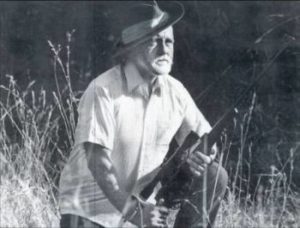
Anderson, Kenneth (1910-1974). He was a hunter, nature enthusiast, and wildlife chronicler. He was a British writer and hunter who wrote many books about his adventures in South India's jungles. The Bond of Love is a storey by Kenneth Anderson about a human's love for a sloth bear named 'Bruno.' Bruno was a sloth bear that the author rescued.
Kathmandu
Lesson-10
Kathmandu
By Vikram Seth (An extract from ‘Heaven Lake’)

Kathmandu Introduction
Vikram Seth, a writer, hitchhiked from China to India via Tibet and Nepal and wrote about it in his book 'Heaven Lake.' In this extract from the book, we learn about his visit to Kathmandu, Nepal's capital.
Kathmandu Summary
Vikram Seth, the author, describes his visit to Kathmandu, Nepal's capital, in this chapter. He went to two temples there: the Pashupatinath temple, which is a Hindu pilgrimage site, and the Baudhnath temple, which is a Buddhist holy place
The Pashupatinath temple was only open to Hindus. With priests, tourists, pilgrims, and animals crowding the area, there was a lot of chaos. The holy river Bagmati, which flows close to the temple, was polluted by washerwomen washing clothes in it, children bathing in it, and residents throwing dry, withered flowers in it. Small shrines protruded from the stone platform, and it was said that when the platform emerged completely, the goddess would emerge from it, bringing the Kaliyug to an end. The scene at the Baudhnath temple was diametrically opposed to the one at the Pashupatinath temple. It was a massive white dome surrounded by an outer road. The atmosphere was serene and peaceful. Outside the temple, there was a Tibetan market where Tibetan refugees sold bags, clothing, and jewellery.
Kathmandu has a wide range of attractions. It has religious significance, is a business hub, and is a popular tourist destination. Postcards, antiques, chocolates, imported cosmetics, camera film rolls, and utensils are all available in shops. In the streets, a variety of sounds could be heard. The music blowing from the radios, the honking of car horns, the ringing of bicycle bells, the mooing of cows as they obstructed the passing motorcycles, and the screaming vendors selling their wares. To digest, Vikram ate a marzipan bar, a roasted corn on the cob garnished with lemon juice, salt, and chilli powder, and drank coca cola. He also purchased some love story comics and a Reader's Digest.
On his way back to Delhi, he considered taking an unusual route. It would be a bus or train ride to Patna, followed by a boat ride up the Ganga river to Allahabad. It would be followed by a boat ride down the Yamuna to Delhi. He abandoned the plan because he was tired and instead took a direct flight from Kathmandu to New Delhi the next day.
He noticed a flute seller outside his hotel. He held a pole with many flutes protruding from it like thorns on a porcupine's body. The man stood quietly, taking out a different flute, playing it for a few minutes before replacing it with another. Every now and then, he'd sell one of them mindlessly. He played the flute in a meditative manner. He wasn't like the other hawkers who yelled to sell their wares. The music of the flute drew the writer in. Flutes are played in many parts of the world, and their appearance, names, and the music they produce vary. A flute's sound is similar to that of a human voice because it is played by exhaling the breadth, and its music also pauses when a person inhales a breadth.
Kathmandu Lesson Explanation
I get a cheap room in the centre of town and sleep for hours. The next morning, with Mr Shah’s son and nephew, I visit the two temples in Kathmandu that are most sacred to Hindus and Buddhists.
Vikram rented a cheap, affordable hotel room and slept for a few hours because he was tired from the journey. The next morning, he and Mr. Shah's son and nephew went to two temples in Kathmandu. One of the temples was a Hindu pilgrimage, while the other was a Buddhist pilgrimage.
At Pashupatinath (outside which a sign proclaims ‘Entrance for the Hindus only’) there is an atmosphere of ‘febrile confusion’. Priests, hawkers, devotees, tourists, cows, monkeys, pigeons and dogs roam through the grounds. We offer a few flowers. There are so many worshippers that some people trying to get the priest’s attention are elbowed aside by others pushing their way to the front. A princess of the Nepalese royal house appears; everyone bows and makes way. By the main gate, a party of saffron-clad Westerners struggle for permission to enter. The policeman is not convinced that they are ‘the Hindus’ (only Hindus are allowed to enter the temple). A fight breaks out between two monkeys. One chases the other, who jumps onto a shivalinga, then runs screaming around the temples and down to the river, the holy Bagmati, that flows below. A corpse is being cremated on its banks; washerwomen are at their work and children bathe. From a balcony a basket of flowers and leaves, old offerings now wilted, is dropped into the river. A small shrine half protrudes from the stone platform on the river bank. When it emerges fully, the goddess inside will escape, and the evil period of the Kaliyuga will end on earth.
- Proclaims: make known publicly or officially
- Febrile confusion: hurried activity; complete chaos
- Saffron – clad westerners: foreigners dressed as sadhus
- Corpse: dead body
- Wilted: dry and withered
- Shrine: a place of worship
- Protrudes: comes out
- Kalyug: it is the fourth and last stages or time period of a Mahayuga. It started with the end of Mahabharata when Lord Krishna left the Earth.
A sign outside the Pashupatinath temple stated that entry into the temple was restricted to Hindus only. Outside the temple, there was chaos as priests, hawkers, devotees, tourists, and various animals moved around. In the temple, the writer and his friends offered a few flowers. There was a rush of pilgrims, and they were elbowing each other to get ahead and see the priest. When a royal princess appeared, everyone moved to the side and bowed to her. At the main entrance, a group of foreigners dressed as sadhus in saffron tried to gain entry into the temple. The guard refused them entry because he knew they were not Hindus. Then he saw two monkeys fighting, and one chased the other, who jumped onto a shivling, ran around the temple, and eventually arrived at the banks of the holy Bagmati river, which flows next to the temple. He witnessed a body being cremated, washerwomen washing clothes, and children bathing in the river. When a basket of dry withered flowers was thrown into the river from a building's balcony, the writer noticed how polluted it was. A small temple protruded from the riverbank platform. It is said that when the temple fully emerges, the goddess within will emerge, and the time period of the Kalyug will be ended by her.
At the Boudhnath stupa, the Buddhist shrine of Kathmandu, there is, in contrast, a sense of stillness. Its immense white dome is ringed by a road. Small shops stand on its outer edge: many of these are owned by Tibetan immigrants; felt bags, Tibetan prints and silver jewellery can be bought here. There are no crowds: this is a haven of quietness in the busy streets around.
- Immigrants: a person who comes to live permanently in a foreign country.
- Haven: a safe place
The writer then describes the Boudhanath temple, which is a sacred place for Buddhists. There was a sense of calm about the place. A huge white – coloured dome was surrounded by a road. On the side of the road, there was a Tibetan market where Tibetan immigrants set up shop selling felt bags, printed dresses, and silver jewellery. There were no crowds, and unlike the Pashupatinath temple, the Baudhnath temple was calm and quiet, despite the busy streets that surrounded it.
Kathmandu is vivid, mercenary, religious, with small shrines to flower-adorned deities along the narrowest and busiest streets; with fruit sellers, flute sellers, hawkers of postcards; shops selling Western cosmetics, film rolls and chocolate; or copper utensils and Nepalese antiques. Film songs blare out from the radios, car horns sound, bicycle bells ring, stray cows low questioningly at motorcycles, vendors shout out their wares. I indulge myself mindlessly: buy a bar of marzipan, a corn on- the-cob roasted in a charcoal brazier on the pavement (rubbed with salt, chilli powder and lemon); a couple of love story comics, and even a Reader’s Digest. All this I wash down with Coca Cola and a nauseating orange drink, and feel much the better for it.
- Deities: gods and goddesses
- Cows low: the ‘moo’ sound made by cows
- Marzipan: a sweet made with grated almonds
- Brazier: open stove
- Wash down: to drink something after a meal to digest it
- Nauseating: sickening
The author describes Kathmandu, a city with a wide range of attractions. It is a business centre with many shrines and deities decorated with flowers on the narrow, busy streets. Tourists can buy fruits, flutes, and postcards from hawkers. There are numerous shops selling imported cosmetics, film rolls from old cameras, chocolates, copper utensils, and Nepalese antiques. Many different sounds can be heard, including radio music, car horns, bicycle bells, cow moos, and screaming vendors selling their wares. The author purchased a bar of marzipan and a corn on the cob roasted over a charcoal fire by a roadside vendor. He topped it with lemon juice, salt, and chilli powder. He also purchased some love story comic books and a Reader's Digest magazine. After finishing everything, he drank Coca-Cola, an aerated drink that would aid in digestion.

I consider what route I should take back home. If I were propelled by enthusiasm for travel per se, I would go by bus and train to Patna, then sail up the Ganges past Benaras to Allahabad, then up the Yamuna, past Agra to Delhi. But I am too exhausted and homesick; today is the last day of August. Go home, I tell myself: move directly towards home. I enter a Nepal Airlines office and buy a ticket for tomorrow’s flight.
- Propelled: drive or push something forward
- Per se: by itself
He considered taking a more adventurous route back home. It'd be a bus or train ride to Patna. From there, he'd take a boat down the Ganga and cross Benaras on his way to Allahabad. He planned to sail down the Yamuna River from Allahabad, cross Agra, and arrive in Delhi. He abandoned his daring journey and decided to take a flight from Kathmandu to New Delhi because he was exhausted. He bought a ticket for the next day's flight from the Nepal Airlines office.
I look at the flute seller standing in a corner of the square near the hotel. In his hand is a pole with an attachment at the top from which fifty or sixty bansuris protrude in all directions, like the quills of a porcupine. They are of bamboo: there are cross-flutes and recorders. From time to time he stands the pole on the ground, selects a flute and plays for a few minutes. The sound rises clearly above the noise of the traffic and the hawkers’ cries. He plays slowly, meditatively, without excessive display. He does not shout out his wares. Occasionally he makes a sale, but in a curiously offhanded way as if this were incidental to his enterprise. Sometimes he breaks off playing to talk to the fruit seller. I imagine that this has been the pattern of his life for years.
- Meditatively: thoughtfully
- Offhanded: casual; not showing much interest in something
The author saw a flute vendor selling various bansuris. He was not like the other hawkers. Outside the hotel, they were standing in a corner of the square. He was holding a pole with an attachment on top. It had 50-60 flutes stuck in it. It resembled a porcupine's thorny body. There were bamboo flutes, as well as cross flutes and recorders. The man would keep the pole on the ground and play various flutes for short periods of time. Only the music of the flute could be heard from him. He played it meditatively, not wanting to draw attention to himself. He sold one flute at a time but did not appear to be interested in making a good sale. He'd take breaks to talk with the fruit vendor standing next to him. This appeared to be his routine for many years.
I find it difficult to tear myself away from the square. Flute music always does this to me: it is at once the most universal and most particular of sounds. There is no culture that does not have its flute — the reed neh, the recorder, the Japanese shakuhachi, the deep bansuri of Hindustani classical music, the clear or breathy flutes of South America, the high-pitched Chinese flutes. Each has its specific fingering and compass. It weaves its own associations. Yet to hear any flute is, it seems to me, to be drawn into the commonality of all mankind, to be moved by music closest in its phrases and sentences to the human voice. Its motive force too is living breath: it too needs to pause and breathe before it can go on.
- Fingering: way of placing the fingers to play different notes
- Compass: here, range
The music of the flute enchanted Vikram, and he couldn't leave. Flute music, he believes, is the most universal sound. Flutes are played in many different regions and have various names and varieties, such as the Shakuhachi in Japan, the deep bansuri of Hindustani classical music, the clear, breathy flutes in South America, and the high – pitched flutes in China. Each flute has a unique way of being played, and the sound varies in pitch and depth. The most common sound that emerges from a flute is the sound of human voice. When playing the bansuri by mouth, the player exhales into the flute to produce music, and when he pauses to take a breath, the music of the flute also stops.
That I can be so affected by a few familiar phrases on the bansuri, surprises me at first, for on the previous occasions that I have returned home after a long absence abroad, I have hardly noticed such details, and certainly have not invested them with the significance I now do.
He is surprised that the bansuri's sounds have such an impact on him. Never before had he paid such close attention to something as the flute seller and his wares.
About the Author
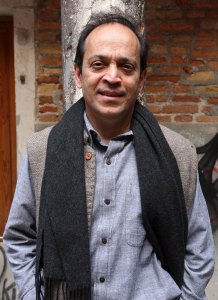
Vikram Seth CBE is a novelist and poet from India. He attended exclusive Indian schools before graduating from Oxford's Corpus Christi College (B.A., 1975). In 1978, he earned a master's degree in economics from Stanford University in the United States, and he later attended Nanjing University in China.
If I Were You
Lesson-11
If I Were You
By Douglas James
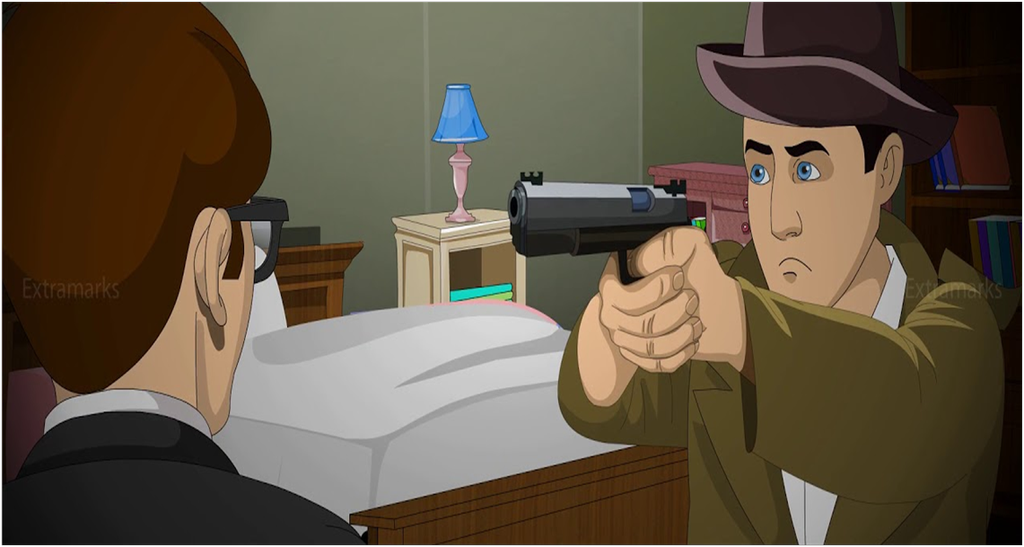
If I Were You Introduction
Gerrard, a playwright, is the subject of this play. How he avoids being killed by an intruder who wants to steal his identity and live happily ever after. Gerrard fools the intruder, confines him in a cupboard, and finally surrenders him to the sergeant.
If I Were You Summary
Gerrard was a writer of plays. He had to leave his house in order to deliver props for a rehearsal. An intruder had just broken into his house. He was armed with a gun. He desired to assassinate Gerrard and live off of his identity. The intruder had murdered someone and was wanted by the police. So he considered stealing Gerrard's identity in order to live peacefully. He wanted to learn everything he could about Gerrard before killing him so that he could accurately imitate him.
Gerrard said that he, too, was a thief and that if the intruder stole his identity, he would be pursued by the police. He'd murdered someone, and the cops had evidence against him. He went on to say that he was carrying fake moustaches and other props in order to disguise himself and hide from the cops. He had a feeling the cops were going to raid his house that night. He had placed an accomplice on the road to warn him of impending danger. Gerrard duped the intruder into believing him by threatening to kill him if the intruder suspected Gerrard of lying.
Gerrard warned that it was time to leave as the phone rang. When the intruder did not believe Gerrard, he asked him to peer out the garage door and see the cops for himself. The door was, in fact, that of a cupboard. Gerrard pushed the intruder inside the cupboard and locked it as he bent forward. He then summoned the sergeant as he ready to hand over the intruder to the police.
If I Were You Lesson Explanation
SCENE: A small cottage interior. There is an entrance back right (which may be curtained). Another door to the left must be a practical door. The furniture is simple, consisting of a small table towards the left, a chair or two, and a divan rather upstage on the right. On the table is a telephone.
(When the curtain rises Gerrard is standing by the table making a phone call. He is of medium height, and wearing horn-rimmed glasses . . . He is dressed in a lounge suit and a great coat. His voice is cultured.)
The play takes place in a small cottage. The room has a curtained entrance on the right hand side. Another door on the left side of the room is currently in use. The room is furnished simply, with a small table to the left, a chair or two, and a small bed to the right. A telephone is kept on the table. Gerrard is discovered standing by the table, making a phone call, as the stage curtain is being rolled up. He is of medium height and wears spectacles in the shape of horns. He's dressed in a lounge suit and a fantastic coat. His voice reveals that he is well – educated and cultured.
GERRARD : … Well, tell him to phone up directly. I must know … Yes, I expect I’ll still be here, but you mustn’t count on that … In about ten minutes’ time. Right-ho. Goodbye.
(He puts down the phone and goes to the divan on the left, where there is a travelling bag, and starts packing. Whilst he is thus engaged, another man, similar in build to Gerrard enters from the right silently — revolver in hand. He is flashily dressed in an overcoat and a soft hat. He bumps accidentally against the table, and at the sound Gerrard turns quickly.)
Gerrard is currently on the phone. He suggests that the individual contact him directly. He adds that he'll be there in ten minutes, says 'goodbye,' and replaces the receiver on the phone. Then he goes to the divan and begins packing his belongings into a travel bag. While he is packing, a man who resembles Gerrard enters the room quietly from the right side. He's holding a gun in one hand. He's wearing a brightly coloured dress, an overcoat, and a soft hat. Gerrard turns around as he collides with the table.
GERRARD : (pleasantly) Why, this is a surprise, Mr— er—
Gerrard greets the stranger cheerfully and expresses his surprise at seeing him.
INTRUDER : I’m glad you’re pleased to see me. I don’t think you’ll be pleased for long. Put those paws up!
- Intruder: a person who intrudes, especially into a building with criminal intent.
- Paws: here, hands
The intruder expresses his delight at finding Gerrard pleased to see him. He goes on to say that when Gerrard learns of his plans, he will be unhappy. Gerrard is asked to raise his hands by the intruder.
GERRARD : This is all very melodramatic, not very original, perhaps, but…
- Melodramatic: excessive emotions than are required for the situation
Gerrard perceives the intruder's behavior to be dramatic and unnatural.
INTRUDER : Trying to be calm and —er—
The intruder says to be trying to remain calm and..... (he is short of words to complete the sentence)
GERRARD : ‘Nonchalant’ is your word, I think.
- Nonchalant: not showing anxiety, interest or enthusiasm
Gerrard continues, "I want to say that I'm trying to be calm and nonchalant, not to show anxiety or enthusiasm."
INTRUDER : Thanks a lot. You’ll soon stop being smart. I’ll make you crawl. I want to know a few things, see.
The intruder thanks Gerrard for finishing the sentence and promises that he will stop acting smart soon. He goes on to say that he will torture him and make him crawl.
GERRARD : Anything you like. I know all the answers. But before we begin I should like to change my position; you may be comfortable, but I am not.
Gerrard says that the intruder could ask him anything, but he first wanted to sit comfortably.
INTRUDER : Sit down there, and no funny business. (Motions to a chair, and seats himself on the divan by the bag.) Now then, we’ll have a nice little talk about yourself!
Gerrard obeys the intruder's command and sits on the divan. He wants to discuss about the two of them.
GERRARD : At last a sympathetic audience! I’ll tell you the story of my life. How as a child I was stolen by the gypsies, and why at the age of thirty-two, I find myself in my lonely Essex cottage, how …
- Gypsies: nomads
Gerrard says that he has finally found someone who cares about him and wants to know about his past. He adds that he would tell him about his life, how he was kidnapped as a child by a group of nomads, and why, at the age of 32, he was living alone in this small cottage in Essex. By saying this, he created a sense of suspense around him.
INTRUDER : Keep it to yourself, and just answer my questions. You live here alone? Well, do you?
Gerrard's words did not intrigue the intruder's interest. He was looking for answers to his questions and didn't care what Gerrard had to say. He inquired as to whether Gerrard lived alone in the house.
GERRARD : I’m sorry. I thought you were telling me, not asking me. A question of inflection; your voice is unfamiliar.
- Inflection: a change in the modulation of voice
Gerrard says that the intruder's tone of voice gave him the impression that he was telling him that he lived alone rather than asking him if he did. He went on to say that the intruder's voice was unfamiliar, implying that he was curious about him.
INTRUDER : (with emphasis) Do you live here alone?
The intruder asked Gerrard if he lived alone and repeated his question with emphasis.
GERRARD : And if I don’t answer?
Gerrard asked as to what the intruder would do if he did not respond to his question.
INTRUDER : You’ve got enough sense not to want to get hurt.
The intruder warned Gerrard that if he didn't want to be hurt, he should follow his orders.
GERRARD : I think good sense is shown more in the ability to avoid pain than in the mere desire to do so. What do you think, Mr— er—
Gerrard responded intelligently, saying that his good sense was reflected in his ability to avoid pain rather than his desire to avoid it. He inquired about the intruder's thoughts and addressed him as "Mr – er –" to indicate that he wanted to know his name.
INTRUDER : Never mind my name. I like yours better, Mr Gerrard. What are your Christian names?
The intruder responded that he didn't need to know his name, but he did ask Gerrard his Christian name (i.e. the name he was given when he was baptised in the church).
GERRARD : Vincent Charles.
Gerrard responded by stating that his Christian name was Vincent Charles.
INTRUDER : Do you run a car?
The intruder then inquired as to whether Gerrard owned a car.
GERRARD : No.
Gerrard gave a negative response.
INTRUDER : That’s a lie. You’re not dealing with a fool. I’m as smart as you and smarter, and I know you run a car. Better be careful, wise guy!
Gerrard, according to the intruder, was lying. He stated that he was not a fool. He knew he had a car because he was smarter than him. He cautioned Gerrard not to fool him.
GERRARD : Are you American, or is that merely a clever imitation?
Gerrard asked the intruder if he was truly American or if he was impersonating an American accent.
INTRUDER : Listen, this gun’s no toy. I can hurt you without killing you, and still get my answers.
The intruder became angered and stated that his gun was not a toy. He could injure Gerrard and still get a response to his questions.
GERRARD : Of course, if you put it like that, I’ll be glad to assist you. I do possess a car, and it’s in the garage round the corner.
Gerrard expressed his fear and stated that he would be delighted to assist the intruder. He admitted to having a car and stated that it was in the garage.
INTRUDER : That’s better. Do people often come out here?
The intruder then inquired as to whether the place was frequently visited by a number of people.
GERRARD : Very rarely. Surprisingly few people take the trouble to visit me. There’s the baker and the greengrocer, of course; and then there’s the milkman — quite charming, but no one so interesting as yourself.
Gerrard responded that he had few visitors. He went on to say that only a few people bothered to pay him a visit. No one else came to see him except the baker, green grocer, and milkman.
INTRUDER : I happen to know that you never see tradespeople.
The intruder stated that he had learned that Gerrard did not meet with tradespeople.
GERRARD : You seem to have taken a considerable amount of trouble. Since you know so much about me, won’t you say something about yourself? You have been so modest.
Gerrard remarked that the intruder had gone out of its way to obtain information about him. He added that since the intruder knew so much about him, he should reveal some information about himself as well. He went on to say that the intruder had been reserved and hadn't said much about himself.
INTRUDER : I could tell you plenty. You think you’re smart, but I’m the top of the class round here. I’ve got brains and I use them. That’s how I’ve got where I have.
The intruder stated to have a lot to say about himself. If Gerrard thought he was smart, he was mistaken. He had intelligence and used it to accomplish things.
GERRARD : And where precisely have you got? It didn’t require a great brain to break into my little cottage.
Gerrard remarked that the man had simply broken into his small cottage, which was not a big deal and did not necessitate much intelligence.
INTRUDER : When you know why I’ve broken into your little cottage, you’ll be surprised, and it won’t be a pleasant surprise.
The intruder stated that the reason for his intrusion into Gerrard's cottage would surprise Gerrard.
GERRARD : With you figuring so largely in it, that is understandable. By the way, what particular line of crime do you embrace, or aren’t you a specialist?
- Embrace: accept
Gerrard responded that based on the intruder's behaviour, he knew the reason for breaking into his house would be shocking. Then he inquired about the intruder's specialty crime.
INTRUDER : My speciality’s jewel robbery. Your car will do me a treat. It’s certainly a dandy bus.
- Dandy: stylish, fashionable
The intruder responded by saying he specialised in jewel robbery. He went on to say that Gerrard's car would be a gift for him because it was so stylish.
GERRARD : I’m afraid jewels are few and far between in the wilds of Essex.
Gerrard remarked that jewels were hard to come by in Essex. He wanted to say that the intruder's visit to the area would be pointless because he would not find any jewels.
INTRUDER : So are the cops. I can retire here nicely for a little while.
The intruder went on to say that, like jewels, cops were scarce in Essex, so he could live there peacefully.
GERRARD : You mean to live with me? A trifle sudden isn’t it; you’ve not been invited.
Gerrard inquired as to whether the intruder wished to live with him. He remarked that the decision had come unexpectedly and that he had not invited the intruder to live with him.
INTRUDER : You won’t be here long; so I didn’t trouble to ask.
The intruder responded that he didn't bother asking Gerrard for permission because he wouldn't be there for long.
GERRARD : What do you mean?
Gerrard inquired as to what he meant by that.
INTRUDER : This is your big surprise. I’m going to kill you.
The intruder responded that he surprised because he intended to kill Gerrard.
GERRARD : A little harsh, isn’t it?
The man sounded harsh, according to Gerrard.
INTRUDER : (with heavy sarcasm) Yeah, I’ll be sorry to do it. I’ve taken a fancy to you, but it’s just got to be done.
The intruder replied sarcastically that he was sorry to do so because he had grown fond of him.
GERRARD : Why add murder to your other crimes? It’s a grave step you’re taking.
Gerrard stated that murder was a serious crime and advised the intruder not to commit it.
INTRUDER : I’m not taking it for fun. I’ve been hunted long enough.
I’m wanted for murder already, and they can’t hang me twice.
The intruder stated that he was being pursued by police because he had already murdered someone. If he killed another person, the punishment would remain the same because he could not be hanged twice.
GERRARD : You’re planning a gratuitous double, so to speak. Admitted you’ve nothing to lose, but what have you to gain?
- gratuitous double: done without reason.
Gerrard concluded from this that the intruder intended to murder him for no apparent reason. He agreed that the intruder would not lose anything, but he questioned what he would gain by killing him. He was curious as to why he want to kill Gerrard.
INTRUDER : I’ve got freedom to gain. As for myself, I’m a poor hunted rat. As Vincent Charles Gerrard I’m free to go places and do nothing. I can eat well and sleep and without having to be ready to beat it at the sight of a cop.
- To beat it: to leave immediately
The intruder responded that in exchange for killing Gerrard, he would be granted freedom. He was being pursued by the police because he had committed a murder and was hiding like a rat. He would live a free life after assuming the identity of Vincent Charles Gerrard. He could go places, eat, and sleep without fear of being caught by the police.
GERRARD : In most melodramas the villain is foolish enough to delay his killing long enough to be frustrated. You are much luckier.
Gerrard observed that in many dramatic plays, the villain is shown to be a fool. He would put off being killed and eventually became frustrated as a result of the delay. Then he'd do something stupid and end up trapped. However, the intruder was more fortunate than such villains.
INTRUDER : I’m O.K. I’ve got a reason for everything. I’m going to be Vincent Charles Gerrard, see. I’ve got to know what he talks like. Now I know. That posh stuff comes easy. This is Mr V.C. Gerrard speaking. (Pantomime of phoning, in imitation cultured voice.) And that’s not all. (He stands up.) Get up a minute (Gerrard stands.) Now take a look at me.
- Posh: rich, showy
- Pantomime: to mime or copy someone
The intruder responded that he was fine because he was there for a reason. He desired to live under the name of Vincent Charles Gerrard. He imitated Gerrard's speaking style, which he had picked up from overhearing Gerrard on the phone. The intruder impersonated Gerrard and inquired about his performance.
GERRARD : You’re not particularly decorative.
Gerrard remarked that the acting was unappealing.
INTRUDER : No! Well, that goes for you, too. I’ve only got to wear specs and I’ll be enough like you to get away with it.
The intruder commented that it wasn't because of Gerrard's behaviour. He went on to say that he only needed spectacles to look like Gerrard.
GERRARD : What about your clothes? They’ll let you down if you’re not careful.
Gerard inquired of the intruder what he intended to do with his clothes. His fashion sense was out of character for him and could land him in trouble.
INTRUDER : That’ll be all right. Yours will fit me fine.
The intruder responded that this would not be a problem because he would be dressed in Gerrard's clothes. They'd be a good fit for him.
GERRARD : That is extremely interesting, but you seem to miss the point of my remark. I said, you were luckier than most melodramatic villains. It was not a tribute to your intelligence. You won’t kill me for a very good reason.
- Tribute: to show gratitude, respect or admiration for someone or something
When Gerrard said that the intruder was luckier than most melodramatic villains, the intruder did not understand. He went on to say that he was not praising the intruder's intelligence, but that the intruder would not kill him unless he had a strong reason to do so.
INTRUDER : So that’s what you think.
That's what Gerrard thought, according to the intruder.
GERRARD : You’ll let me go, and thank God you didn’t shoot sooner.
Gerrard said that the intruder would not kill him. He thanked God that the man hadn't shot at him up until that point.
INTRUDER : Come on. What’s on your mind! Better be quick. This conversation bores me.
The intruder demanded that Gerrard act quickly and reveal everything that was going on in his mind. The lengthy conversation was starting to bore him.
GERRARD : Your idea is to elude the police by killing me and taking on my identity?
- Elude: escape
The intruder's plan, according to Gerrard, was to escape the police by killing Gerrard and stealing his identity.
INTRUDER : Yes, I like the idea.
His plan was confirmed by the intruder.
GERRARD : But are you sure it’s going to help you?
Gerrard asked the intruder if he was certain that this plan would help him escape the cops.
INTRUDER : Now listen here. I’ve got this all planned. I did a job in town. Things went wrong and I killed a cop. Since then I’ve done nothing but dodge.
- Dodge: to avoid someone, here, the police.
The intruder stated to have planned everything. He worked in the town. Something went wrong, and he killed a policeman. He had been on the run since that day.
GERRARD : And this is where dodging has brought you?
Gerrard stated that the intruder had finally arrived at his cottage while fleeing from the police.
INTRUDER : It brought me to Aylesbury. That’s where I saw you in the car. Two other people saw you and started to talk. I listened. It looks like you’re a bit queer — kind of a mystery Man.
- Queer: strange
The intruder said that while on the run, he arrived in Aylesbury. He saw Gerrard and overheard two men discussing him there. Their conversation revealed Gerrard to be strange and mysterious.
GERRARD : A mystery which I propose to explain.
Gerrard went on to say that he could explain the mystery surrounding him.
INTRUDER : (disregarding him) You phone your orders and sometimes you go away suddenly and come back just the same. Those are just the things I want to do. Hearing about you was one of my luckiest breaks.
The intruder ignored Gerrard's request and continued speaking. Gerrard, he said, would place orders over the phone, then leave and return unexpectedly. He, too, desired to do such things. Getting to know Gerrard was the best thing that could have happened to him.
GERRARD : Apparently you haven’t the intelligence to ask why I am invested in this cloak of mystery.
- Invested in: taken up, adopted
- Cloak: cape, robe
Gerrard remarked that the intruder was not intelligent enough to figure out why he was shrouded in mystery.
INTRUDER : (preparing to shoot) As I said before, this conversation bores me.
As the intruder got bored with the conversation, he prepared to shoot at Gerrard.
GERRARD : Don’t be a fool. If you shoot, you’ll hang for sure. If not as yourself, then as Vincent Charles Gerrard.
Gerrard cautioned the intruder not to act stupidly. He would be hanged if he fired a shot at him. He went on to say that even if he stole Gerrard's identity, he would be hanged.
INTRUDER : What is this?
Hearing this, the intruder became excited.
GERRARD : This is your big surprise. I said you wouldn’t kill me and I was right. Why do you think I am here today and gone tomorrow, never see tradespeople? You say my habits would suit you. You are a crook. Do you think I am a Sunday-school teacher?
The game’s up as far as I’m concerned. Things went wrong with me. I said it with bullets and got away. Unfortunately they got one of my men, and found things the fool should have burnt. Tonight I’m expecting trouble. My bag’s packed ready to clear off. There it is.
- Sunday-school teacher: used to indicate an honest man
According to Gerrard, the intruder was shocked by this. Gerrard's secrecy, lack of visitors, and activities that were suitable for the intruder were all due to the fact that he was also a bad man. He was not a trustworthy individual, such as a schoolteacher. When he had to kill someone with a gun, his game was over. Following that, one of his accomplices was apprehended by police. Gerrard provided them with evidence against him. Gerrard was expecting the police to raid his house that night in order to arrest him, so he packed his belongings and prepared to flee.
INTRUDER : It’s a bag all right and this is a gun all right. What’s all this?
All of this had to be evident to the intruder. He agreed Gerrard had a bag and a gun, but why was he carrying strange items like fake moustaches, wigs, and props?
GERRARD : That’s a disguise outfit; false moustaches and what not. Now do you believe me?
- Disguise: give a different appearance in order to hide one’s identity
Gerrard responded that he was carrying these props so that he could hide himself. He was hoping the intruder would believe him.
INTRUDER : (musingly) I don’t know.
The intruder was still doubtful of Gerrard's words.
GERRARD : For God’s sake clear that muddled head of yours and let’s go. Come with me in the car. I can use you. If you find it’s a frame, you’ve got me in the car, and you’ve still got your gun.
- Muddled head: confused mind
- Frame: false
Gerrard asked the intruder to trust him and accompany him in his car. He went on to say that the intruder could assist him in escaping and that if he thought Gerrard's words were false, he could kill him with his gun.
INTRUDER : May be you’re right.
The intruder believed Gerrard and stated that he was most likely correct.
GERRARD : Then don’t waste time.
(Goes and picks up hat and bag.)
Gerrard was short on time. He retrieved his hat and bag.
INTRUDER : Careful, boss, I’m watching you.
Gerrard was warned by the intruder that he was watching his every move.
GERRARD : I have got a man posted on the main road. He’ll ring up if he sees the police, but I don’t want to leave … (telephone bell rings) Come on! They’re after us. Through here straight to the garage.
Gerrard stated that one of his accomplices was stationed on the road to warn him if he saw the cops. The phone rang, and Gerrard announced that it was time to leave. He headed for the intruder to exit through the garage door.
INTRUDER : How do I know that you are telling the truth?
Gerrard's words were questioned by the intruder.
GERRARD : Oh, don’t be a fool. Look for yourself.
(Gerrard opens door and steps away. Intruder leans forward to inspect it, with his side towards Gerrard, but with the revolver ready. As he turns his head, Gerrard gives him a push into the cupboard, knocking the revolver out of his hand. He slams the door and locks it, picks up the revolver and goes to the phone, where he stands with the gun pointed at the cupboard door.)
Gerrard advised the intruder not to be foolish. He invited him to come and see for himself. He opened the door and took a step to one side, allowing the intruder to see outside. The intruder leaned forward, his gun still aimed at Gerrard. Gerrard pushed him into the cupboard as he turned his head, and the intruder's gun fell from his grips. (The door was not a garage door, but rather a cupboard door.) Gerrard closed and locked the door as he pushed the intruder inside the cupboard. He took up the revolver and walked over to the phone, the gun aimed at the cupboard in case the intruder tried to flee.
INTRUDER : (rattles door and shouts) Let me out of here!
The intruder shook the cupboard door and shouted to be let out.
GERRARD : Hello. Yes, speaking. Sorry I can’t let you have the props in time for rehearsal, I’ve had a spot of bother — quite amusing. I think I’ll put it in my next play. Listen, can you tell our friend the Sergeant to come up here at once? You’ll probably find him in the Public Bar.
- Props: things used by actors to change appearance
- Spot of bother: something that causes inconvenience or trouble
Gerrard answered the phone and explained that he would be unable to deliver the props in time for the play's rehearsal because he had been bothered by someone. He went on to say that he would incorporate this incident into his next play. This demonstrates that Gerrard was a playwright. He requested that the sergeant be sent to to his home. He went on to say that the sergeant was most likely to be found in the public bar.
About the Author
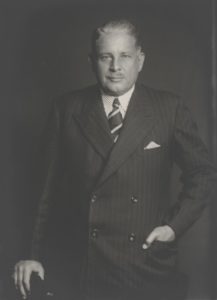
Douglas James (1888-1946) was a British colonial administrator who served as Governor of North Borneo, Sierra Leone, and the Leeward Islands. Administrator of a British colony. More languages are available. Spanish. He was appointed Secretary to Administration in "British Somaliland" in 1916, a position he held until 1921.
The Road Not Taken
Poem-1
The Road Not Taken
By Robert Frost

The Road Not Taken Poem Introduction
The road represents our life in the poem 'The Road Not Taken.' According to the poet, the path we do not choose in our lives is the road not taken. He expresses his feelings about the decision he made in the past. Our future, our destination, is determined by the path we have chosen. The important message that the poet wishes to convey is that the decisions we make have an impact on our future, and if we make a bad decision, we will regret it but will be unable to reverse it. As a result, we must take caution when making decisions.
The Road Not Taken Poem Summary
According to the poet, he was walking down the road when he came to a fork. He could only walk on one of the paths. He analysed for some time before deciding on the best course of action. He examined them to determine which was the better option, then chose the one that appeared to be less walked over. He saved the other one for another day, even though he knew he'd never get the chance to walk over it. He'd go further down the chosen path and wouldn't be able to turn back. As he walked down the chosen path, he realised how similar the two paths were. He believed that the decision he made would determine his future.
The Road Not Taken Poem Explanation
Two roads diverged in a yellow wood,
And sorry I could not travel both
And be one traveller, long I stood
And looked down one as far as I could
To where it bent in the undergrowth;
- diverged: separated and took a different direction
- yellow wood: a forest with decomposing leaves
- undergrowth: dense growth of plants and bushes means the forest)
Once upon a time, the poet was walking down a road when he came to a cross road; there were two different paths and he had to choose one of them. The poet says that because he was only one person, he could only travel on one road. He had to choose between these two options. Yellow wood denotes a forest with worn-out leaves that have turned yellow in colour – the season of autumn. It represents a crowded world where people have been living for a long time. They stand in for people who are older than the poet. The poet remained standing and carefully examined the path as far as he could see it.
He wanted to know how the path was before taking it. Was it appropriate for him? He could see the path until it curved, at which point it was covered in trees and hidden. It happens in our lives when we have choices, when we have alternatives, but we have to choose only one of them, when we take time to consider the pros and cons, whether it is suitable for us or not, and only then do we make a decision on which path we should take.
Then took the other, just as fair
And having perhaps the better claim,
Because it was grassy and wanted wear;
Though as for that the passing there
Had worn them really about the same.
- fair: As good as the other one,
- claim: Better option
- grassy: unused
- wanted wear: had not been used
The poet spent a long time looking at one path to see if it was the right path for him, and then he decided and began walking on another path because he felt that both paths were equally good. He says it's just as fair, so he decided both paths were equally good and began walking on one of them. He continues, "Perhaps he felt that the path was better for him, so he chose it because it had grass on it, indicating that it was unused." Because there had not been many people walking on this path previously, it was grassy. 'And wanted wear' denotes that it was not walked over by a large number of people. After walking for a while on the path, he realised that both paths had been wormed out in the same way. Both paths were worn out and similar. Even in our daily lives, we can choose any path or option, but they all have the same benefits, drawbacks, problems, and challenges that we must face. We believe we are making a better decision, but this is not the case.
And both that morning equally lay
In leaves, no step had trodden black.
Oh, I kept the first for another day!
Yet knowing how way leads on to way,
I doubted if I should ever come back.
- trodden means walked over.
According to the poet, both paths were similar that morning. Both had leaves on them and had not been stepped on because they were still green. He decided to take one path that day and leave the other for another, despite the fact that he knew that one path leads to another. He knew he couldn't change his mind about the decision he'd made. Similarly, once we choose an option in our lives, we must stick with that option and never have the opportunity to return and take the other option that we had left earlier.
I shall be telling this with a sigh
Somewhere ages and ages hence;
Two roads diverged in a wood, and I —
I took the one less travelled by,
And that has made all the difference.
- sigh: deep breath
- hence: here, in the future
He says that in the future, he will take a deep breath and say that once upon a time, he had reached a point in life where he had two options, and he chose the road that had been travelled by fewer people. His future was determined by that decision. Similarly, when you are older, you will recall that once upon a time, when you were young, you had two options. You became what you became as a result of the decision you made. This is a strong message for all students: be wise and cautious when making decisions from the options available to you in life, because your future is dependent on the decisions you make today.
The Road Not Taken Poem Literary Devices
1. Rhyme Scheme: abaab
2. Symbolism: two roads that represent two or more choices in our life
3. Anaphora: ‘and’ repeated at the beginning of lines 2, 3 and 4
4. Alliteration: Wanted Wear ‘w’ sound is repeating
- ‘first for’ – ‘f’ sound is repeating
- ‘though, that’- ‘th’ sound is repeating
5. Repetition: ‘Ages’ is repeated. ‘Two roads diverged in a wood’- this sentence is repeated in stanzas 1 and 4.
About the Poet
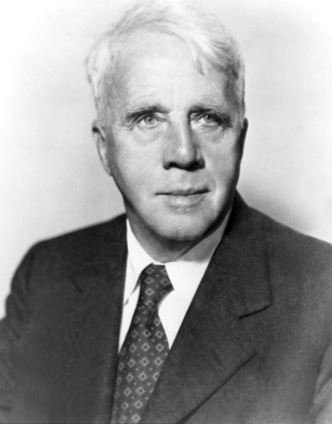
Robert Frost was an American poet who lived from 1874 to 1963. His work was first published in England before being released in the United States. He is well-known for his realistic depictions of rural life and command of the American language. He established himself as one of the United States' few "public literary figures, almost an artistic institution."
Wind
Poem-2
Wind
By Subramania Bharati
[Translated from Tamil by A.K. Ramanujan]

Wind Poem Introduction
We are all aware that wind is a natural occurrence. The poet addresses the wind in this poem. Wind's power has been described, and the poet says that wind is destructive. He has linked the destructive power of wind to life's adversities and says that weak people break down, but stronger people emerge stronger from adversity. The poem conveys an important message: in order to survive life's difficulties, we must be mentally tough and physically strong. A weak person crumbles and crumbles like a weak building. With our strength and determination, we must make these destructive forces our friends.
Wind Poem Summary
The first section of the poem describes the wind's movement. The poet asks the wind blow softly. He begs the wind not to break the window shutters, scatter the papers, or knock the books off the shelf. However, the wind throws the books and tears the pages. The wind, according to the poet, mocks the weak. It brings down frail houses, sagging doors, sagging rafters, and even frail hearts. It crushes everything weak.
The poet advises us to be courageous. Only then will we be able to save ourselves from the wind. We should construct strong houses with solid doors. Our bodies and hearts must be strong as well. Kicking the weak and making friends with the strong is the way of the world. The wind extinguishes the weak fires while allowing the strong fires to roar and flourish. As a result, the poem conveys the message that no one cares about the weak. The wind is also on the side of the strong. To be successful and overcome life's challenges, we must strengthen ourselves.
Wind Poem Explanation
Wind, come softly.
Don’t break the shutters of the windows.
Don’t scatter the papers.
Don’t throw down the books on the shelf.
There, look what you did — you threw them all down.
You tore the pages of the books.
You brought rain again.
You’re very clever at poking fun at weaklings.
- poking fun: making fun of something
- weaklings: a person who is weak
The poet is having a conversation with the wind. He requests that the wind blow softly. So he's saying that the wind shouldn't be too strong or too loud. It should be gentle and understated. Then he says that the wind is very powerful and destructive, breaking window shutters and scattering papers. When the wind blows hard, all of the books on the shelf fall to the ground. So the poet is describing the power of the wind here. Then he tells the wind to look at the devastation it has caused.
When there is a strong wind, all the weak things, such as small plants, tiny children, and so on, become scared and may fall and injure themselves. We can say that the poet refers to wind as a young child in the first part of the poem. He is implying that it should be passed softly, as a small child would. Later on, we learn that the wind, like a young person, is destructive. Just like a young boy or girl who is overflowing with energy, violence, and destruction.
Frail crumbling houses, crumbling doors, crumbling rafters,
crumbling wood, crumbling bodies, crumbling lives,
crumbling hearts —
- crumbling: falling or to cause something to break
- rafter: sloping beam which supports the roof of the building
The word 'Crumbling' is repeated so many times in this scene to emphasise how everything crumbles in the face of a strong wind. So, the writer is saying that when the wind is very strong, it causes everything to break. Houses that are weak fall, doors that are weak fall, beams that support the roofs of buildings fall, all wooden structures fall, all bodies of people fall, animals, lives, and hearts fall. As a result, he says that everything crumbles. In the face of adversity, everything that is weak falls down and breaks. So the poet is saying that whenever a weak person faces adversity or a challenge in life, he crumbles and falls.
the wind god winnows and crushes them all.
- winnows: to broke grain-free of chaff, separate grain from husk by blowing on it
The poet addresses wind as 'wind god,' and he says that the powerful god of wind winnows, which means he sifts all the people, and the weak fall down and are crushed. As a result, a comparison is made between wheat and people in this context. The wind god separates the strong from the weak, just as we winnow wheat to separate the grain from the chaff. When there is a strong wind, all the weak things fall and are crushed.
He won’t do what you tell him.
So, come, let’s build strong homes,
Let’s joint the doors firmly.
Practice to firm the body.
Make the heart steadfast.
Do this, and the wind will be friends with us.
The poet wants us to make friends with the wind, i.e. the adversities in our lives. He says that the problems will not listen to us. They will come, so we should be ready. As a precaution, we should construct strong homes and securely close our doors so that the wind cannot enter. Then he says we should prepare our bodies and hearts to face these challenges. Then, when we're strong enough, all of our challenges will be like old friends. We will not find them bothersome.
The wind blows out weak fires.
He makes strong fires roar and flourish.
His friendship is good.
We praise him every day.
- flourish: grow
The poet has raised the wind to a throne. He's making a comparison between the wind and God. He says that wind is god, and we worship it every day. He goes on to say that everything that is weak dies in the face of the strong wind. And all that is strong, flourishes, and grows to become stronger. He is sending us a very important message: we should not be discouraged because we face so many challenges and adversities in life. We must prepare ourselves physically and mentally to face these challenges. And once we are strong enough, we will overcome the challenges, become friends with them, and be grateful that we had these challenges in our lives because they help us grow stronger and better.
Wind Poem Literary Devices
1. Rhyme scheme – The entire poem is written in free verse. There is no rhyme scheme in the poem.
The literary devices used are as follows –
2. Anaphora – When a word is repeated at the start of two or more consecutive lines, it is the device of Anaphora.
Lines 2, 3, 4 begin with ‘don’t’.
Lines 6, 7, 8 begin with ‘you’.
3. Personification – wind has been personified. When the poet says ‘you are’, he is referring to wind as ‘you’ that means he is treating wind as a person.
4. Repetition – ‘crumbling’ is repeated many times to lay emphasis. The poet wants to say that the wind crushes everything that is weak. That is why he repeats the word crumbling.
5. Alliteration – the repetition of a consonant sound in close connection. ‘wind winnows’.
‘won’t want’
6. Symbolism – Symbolism means that the thing refers to some other thing. the wind is a symbol. It refers to the challenges in life. He is using wind as a symbol for the adversities in our life.
About the Poet
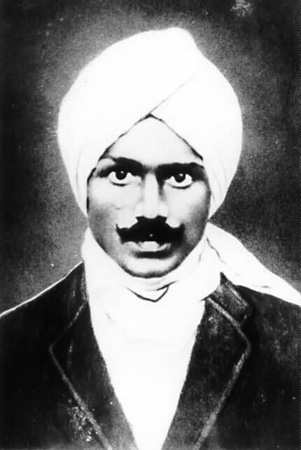
Chinnaswami Subramania Bharathi (Bharathiyar) was a Tamil writer, poet, journalist, Indian independence activist, social reformer, and polyglot. He was a pioneer of modern Tamil poetry and was popularly known as "Mahakavi Bharathi."
Rain On The Roof
Poem-3
Rain On The Roof
By Coates Kinney

Rain On The Roof Poem Introduction
The title of the poem, 'Rain on the Roof,' indicates that the poem is about rain. The poet is telling us about his memories of rain. The sound of raindrops falling on his house's roof brings back pleasant memories.
Rain On The Roof Poem Summary
The poem 'Rain on the Roof' describes the poet's various reactions to the sound of raindrops falling on his house's roof. He compares raindrops at night to tears shed by the sad, dark night. He enjoys lying in bed and listening to rain fall on his room's roof because it brings back pleasant memories of the past. He says that the sound of raindrops helps him sleep and provides him with sweet dreams. He remembers his loving mother putting them to sleep.
Rain On The Roof Poem Explanation
When the humid shadows hover
Overall the starry spheres
And the melancholy darkness
Gently weeps in rainy tears,
What a bliss to press the pillow
Of a cottage-chamber bed
And lie listening to the patter
Of the soft rain overhead!
- Humid: something which is full of moisture.
- ‘shadows’ refers to the moisture-laden clouds which cast a shadow on the earth.
- hover: Move around something
- melancholy: sad
- bliss: Happiness
- patter: the sound of raindrops falling on the roof.
- Cottage chamber means the bedroom.
When the humid shadows hover (here, 'humid shadows' refers to dark clouds full of water), the poet is saying. The poet is saying that when the sky is full of these clouds that are moisture-laden, full of water, and about to rain, when such clouds hover around in the sky, overall the starry spheres ('starry spheres' refers to the night sky that is full of stars). Huge clouds of moisture move around in the sky at that time, and the sad darkness of the night is wiped away by raindrops that look like tears falling from the sky. The poet compares raindrops to tears, saying that the dark sky, which appears to be very sad, appears to be crying, and the raindrops are the tears shed by it. He adds that lying on his bed in his room (Cottage chamber means bedroom) and listening to the sound of raindrops falling on the roof is a blessing.
Every tinkle on the shingles
Has an echo in the heart;
And a thousand dreamy fancies
Into busy being start,
And a thousand recollections
Weave their air-threads into woof,
As I listen to the patter
Of the rain upon the roof.
- tinkle: short, light ringing sound
- shingles: rectangular wooden tiles used on roofs
- echo: repeated sound
- woof: weft, i.es the thread woven across the loom
- patter: the sound of raindrops falling on the roof
- ‘busy being’ refers to human beings and here, the poet is referring to himself
When the poet hears raindrops falling on his house's roof, he is expressing his feelings. Every tinkle on the shingles, he says, has an echo in the heart. Whenever he hears rain falling on the rooftop, the sound repeats in his heart, and he has many different, fanciful imaginations in his dreams. He goes on to say that the sound of rain falling on the rooftop inspires a lot of new and varied dreams in his mind. He recalls many memories from his past, which reemerge in his mind as dreams. As a result, he says that as he listens to the patter of rain on the roof, he has many new dreams in his mind and that memories from the past return to him in the form of dreams.
Now in memory comes my mother,
As she used in years agone,
To regard the darling dreamers
Ere she left them till the dawn:
O! I feel her fond look on me
As I list to this refrain
Which is played upon the shingles
By the patter of the rain.
- ere: old poetic word for ‘before’
- dawn: daybreak
- list: old poetic word for’ listen’
- refrain: a repeated part of a song or a poem; here, the sound of the rain
The poet introduces his mother here. He says to be dreaming of his mother. Rain, as he stated in the previous stanza, brings back memories of the past – in this case, the memory of his mother, who is no longer alive. She used to love him a lot, she used to think of him as a darling, and she used to let him sleep until daybreak and have sweet dreams.
As he listens to the song created by raindrops falling on his room's rooftop, the poet can still feel his mother's gaze on him. The sound of rain causes him to connect his past with his present. That is why the poet is moved by the sound of raindrops on his room's shingles. When he hears this sound, it brings back memories from his childhood and reminds him of his mother.
Rain On The Roof Poem Literary Devices
Rhyme scheme of the poem: abcbdefe
Stanza 1
Alliteration: The repetition of a consonant sound in two or more consecutive words.
‘Humid Hover’ – ‘h’ sound is repeating.
‘starry spheres’ – ‘s’ should is repeating.
‘press pillow’- ‘p’ sound is repeating.
‘lie listening’ – ‘l’ sound is repeating.
Onomatopoeia: The use of sound words to create a dramatic effect and auditory imagery.
‘Patter’ is the use of sound words. It is the sound made by the raindrops falling on the rooftop.
Personification: Treating a non – living thing as a living being.
darkness has been personified when he says that it is sad.
Transferred Epithet: The use of an adjective with a noun when it refers to another noun.
In ‘melancholy darkness’, the darkness is not melancholy, but it refers to the sad people.
Stanza 2
1.Alliteration: The repetition of a consonant sound in two or more consecutive words.
‘busy being’ – ‘b’ sound is repeating
‘their thread’ – ‘th’ sound is repeating
‘rain roof’ – ‘r’ sound is repeating
Onomatopoeia: The use of sound words to create a dramatic effect and auditory imagery.
‘tinkle’, ‘patter’ – sounds made by the raindrops
Personification: Treating a non – living thing as a living being.
recollection is personified when he says that they weave dreams.
Transferred Epithet: The use of an adjective with a noun when it refers to another noun.
‘dreamy fancies’ – it does not mean that the fancies are dreamy but refers to the people who have dreams.
Stanza 3
Alliteration: The repetition of a consonant sound in two or more consecutive words.
‘memory my mother’ – ‘m’ sound is repeating
‘Darling dreamers’ – ‘d’ sound is repeating
Onomatopoeia: The use of sound words to create a dramatic effect and auditory imagery.
‘patter’ – sound of raindrops falling on the shingles of the roof.
About the Poet
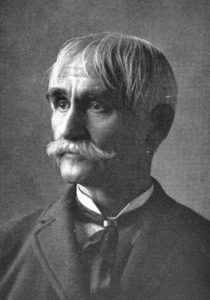
Coates Kinney (1826-1904), the poet, is attempting to connect the rain to both sweet and bitter memories from his past. The poet lies on his bed, clutching his pillow tightly, and loses himself in the thoughts of his caring and loving mother as he listens to the patter of the rain.
The Lake Isle Of Innisfree
Poem-4
The Lake Isle Of Innisfree
By William Butler Yeats

The Lake Isle Of Innisfree Poem Introduction
This is a lyric poem. It's a song-poem. It explores into the poet's yearning for the peace and tranquillity of Innisfree, where he spent a lot of time as a child. The name Innisfree refers to a place. It is a very quiet place, which is why the poet wishes to visit it. This was where he had spent his childhood. He has lovely memories of that place, which is why he desired to return to the lake island of Innisfree.
The Lake Isle Of Innisfree Poem Summary
When the poet visits the peaceful Lake Isle of Innisfree, he is reminded of his childhood. He wants to go there and says he will live alone there. He wants to construct a small cabin out of clay and wattles. He'd grow beans and get a honeybee hive to survive on honey. The poet describes the lake's peaceful natural surroundings. He says that the scene of cloudy mornings, shining stars, the blazing Sun, and birds flying in the sky brings him peace. The soothing sound of the cricket's song relaxes him.
The poet felt called to visit the lake Isle of Innisfree. He can hear the sound of the lake waters crashing against the shore in the depths of his soul. It's almost as if the lake is calling to him. He can hear the sound everywhere he goes, whether it's on the crowded streets or the grey-colored pavements of the city where he lives. This indicates that he wishes to escape the artificial life of the city and return to the peace and tranquility of nature.
The Lake Isle Of Innisfree Poem Explanation
I will arise and go now, and go to Innisfree,
And a small cabin build there, of clay and wattles made:
Nine bean-rows will I have there, a hive for the honeybee,
And live alone in the bee-loud glade.
- arise: stand up
- cabin: room
- wattles: twisted sticks for making fences, walls
- glade: clearing, open space
- Bee loud refers to the sound made by the buzzing of the bees.
The poet William Yeats is referred to as 'I' in this context. He expresses a desire to visit Innisfree. Over there, he will construct a small room for himself out of clay and small sticks used to build the cabin's walls or fences. He will grow nine rows of beans near his room because he will need food as well. He will also obtain honey from the honey bee hive. He says that the open space where he will build his room will be filled with the buzzing sound of bees, and that he will live alone, in peace and tranquilly, there.
And I shall have some peace there, for peace comes dropping slow
Dropping from the veils of the morning to where the cricket sings;
There midnight’s all a glimmer, and noon a purple glow,
And evenings full of the linnet’s wings.
- veils: a piece of fine material worn by women to protect or hide the face
- cricket: an insect related to the grasshoppers but with shorter legs. The male produces a characteristic musical chirping sound.
- linnet: a small brown and grey bird with a short beak
- glimmer means something which is shining.
In this stanza, the poet says that when he is in Innisfree, he will feel peaceful, and that this feeling will come slowly and gradually. He describes how he would feel when he is at peace. When it is cloudy in the morning and the view is obscured, it appears as if the morning has wore a veil and hidden itself. Looking at this scene will calm him down. He also says that when the male cricket insect sings a song, he will be at peace. Also, when he sees the twinkling stars in the open sky at midnight, it will bring him peace. In the afternoon, when the sun's rays cast a purplish glow, he finds peace. He will feel peaceful in the evening when he sees the linnet bird flying in the sky.
I will arise and go now, for always night and day
I hear the lake water lapping with low sounds by the shore;
While I stand on the roadway, or on the pavements grey,
I hear it in the deep heart’s core.
- night and day: all the time
- lapping: striking
- heart’s core: the innermost part of the heart
The poet says in this stanza that he will now stand up and go to Innisfree because the sound of the lake waters striking the shore repeats in his mind all the time. This sound draws him to the lake. Wherever he is – on the road or on the grey – coloured pavements – he hears the sound deep in the depths of his heart.
The Lake Isle Of Innisfree Poem Literary Devices
1.Rhyme Scheme: abab
2.Alliteration: The repetition of a consonant sound in two or more closely placed words is called alliteration. The instances of alliteration in the poem are –
a.‘hive’, ‘honey bee’ – ‘h’ sound is repeated;
b.‘lake’, ‘lapping’, ‘low’ – ‘l’ sound is repeated
3.Repetition: ‘I will arise and go now’ is repeated in stanza 1 and 3
4.Personification: morning is personified
5.Metaphor: clouds are compared to veils
About the Poet
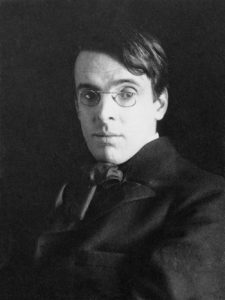
The Lake Isle of Innisfree' is a poem written by Irish poet and playwright William Butler Yeats (1865-1939). The poem is about an actual place near Ireland's coast, the Lake Isle of Innisfree, which is a very small, uninhabited island on the lake Lough Gill in County Sligo.
A Legend Of The Northland
Poem-5
A Legend Of The Northland
By Phoebe Cary
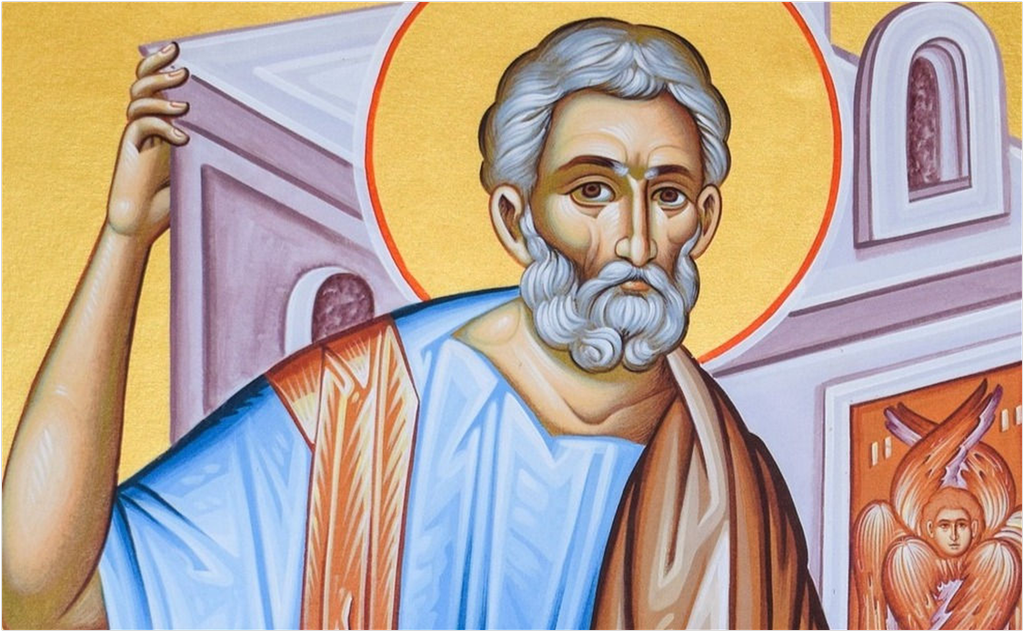
A Legend Of The Northland Poem Introduction
A ballad is 'A legend of the Northland.' A ballad is a poem in short stanzas that tells a storey. A ballad is a type of poem that tells a storey in short stanzas, with each stanza consisting of four lines. This poem contains a total of 16 stanzas, each of which tells us a storey. Ballads are a type of folk or popular culture that is passed down orally from generation to generation. (A ballad is a folk culture storey from any area.) Folk culture is made up of traditional stories that are passed down from generation to generation.
This is a storey about the Northland region, which is close to the North Pole. The precise location is not specified, but 'Northland' refers to the area in the northernmost part of the earth, near the North Pole. 'Legend' refers to a very old historical storey that has been passed down from generation to generation.
A Legend Of The Northland Poem Summary
The poem is based on a legend about an elderly lady who enraged Saint Peter due to her greed. This is how the storey progresses. Saint Peter was preaching around the world one day when he came to the door of a cottage where this woman lived. She was making cakes and baking them over a fire. St. Peter was passing out from hunger. He requested a piece of cake from the lady. Because the cake she was baking appeared to be too large, she did not give it to him and instead baked another smaller one. That also appeared to be a large amount, so she did not give it to him.
She baked another smaller cake the second time, but it was too big to give away. On the third try, she took a very small scrap of dough and rolled it flat. She had it as thin as a wafer but couldn't part with it either. This enraged St. Peter greatly. He said that she was unfit to live in human form and enjoy food and warmth. He cursed her and turned her into a woodpecker bird, which had to bore into hard, dry wood to get its meagre food. She can be seen all day in the trees, boring and boring for food.
A Legend Of The Northland Poem Explanation

Away, away in the Northland,
Where the hours of the day are few,
And the nights are so long in winter
That they cannot sleep them through;
The duration of the day is very short in the region around the North Pole (Northland) because the Sun's rays reach for a very short time. When the winter season arrives in this area, the nighttime hours are extremely long, and the daytime hours are extremely short. The word 'they' in line 4 refers to the people who live in this area. According to the poet, the night is so long that people are unable to sleep through it. If they go to bed, sleep for a few hours, and then wake up, it is still night time. He wishes to emphasise the fact that the night is extremely long.
Where they harness the swift reindeer
To the sledges, when it snows;
And the children look like bear’s cubs
In their funny, furry clothes:
- Sledges: a vehicle on runners for conveying loads or passengers over snow or ice, often pulled by draught animals.
- To harness means to tie the reindeers with a rope to a sledge so that it can be used for transportation.
- Swift: something which runs very fast
The Northland region is experiencing extreme cold. It's a snowy environment. The reindeer is an animal that lives in the polar regions. Reindeer are tied to sledges, and the reindeer pull the sledges. He adds that the children resemble bear cubs because they wear strange-looking clothes made of fur, which resembles a bear's furry skin.
They tell them a curious story —
I don’t believe ’tis true;
And yet you may learn a lesson
If I tell the tale to you.
- Curious: strange
Line 1 refers to the parents or elders, while line 2 refers to the children or younger generation. The elders of the Northland region tell the younger generation a strange and interesting storey. The poet says that he does not believe the storey is true, but that if he tells it to the reader, the reader may learn a lesson from it. The storey conveys a significant message.
Once, when the good Saint Peter
Lived in the world below,
And walked about it, preaching,
Just as he did, you know,
- Saint Peter: an apostle of Christ, a disciple or follower of Jesus Christ
- Preaching: to give a religious talk
The plot revolves around Saint Peter. When Saint Peter was living in the world and going around giving religious lectures to the people, as all saints do, an incident occurred.
He came to the door of a cottage,
In travelling round the earth,
Where a little woman was making cakes,
And baking them on the hearth;
- hearth: fire place where you do cooking
Saint Peter was travelling the world, giving religious lectures to the people, when he came to the door of a cottage where a small woman was baking cakes. She was baking the cakes in the fireplace.
And being faint with fasting,
For the day was almost done,
He asked her, from her store of cakes,
To give him a single one.
- faint: to be weak, famished
Saint Peter was starving and feeling weak because he hadn't eaten anything all day. So he went to this woman who was baking cakes and requested one of the many cakes she had baked.
So she made a very little cake,
But as it baking lay,
She looked at it, and thought it seemed
Too large to give away.
The woman was self-centered. She did not give any cake from her bakery. Instead, she began making a tiny cake for Saint Peter. She was adamant about not sharing her stuff. However, when she placed the cake in the oven to bake, she noticed that it was far too large to be given to someone.
Therefore she kneaded another,
And still a smaller one;
But it looked, when she turned it over,
As large as the first had done.
- kneaded – to make dough from flour.
The cake, according to the little miser woman, was too large to be given away. As a result, she began making another smaller cake. When she looked at that cake, she realised it was just as big as the previous one. She was once again hesitant to give Saint Peter with this smaller cake.
Then she took a tiny scrap of dough,
And rolled and rolled it flat;
And baked it thin as a wafer —
But she couldn’t part with that.
- scrap: small amount
She rolled a very small amount of dough the third time. The poet says she rolled and rolled to emphasise that she rolled the dough and made it very thin like a wafer before baking it. But she was so greedy that she couldn't give the saint that thin piece of bread.
For she said, “My cakes that seem too small
When I eat of them myself
Are yet too large to give away.”
So she put them on the shelf.
The woman reasoned that while eating the cakes, she thought they were very small, but if she had to give them to someone, she thought they were too big. She placed all of the cakes on her kitchen shelf and did not give any to Saint Peter.
Then good Saint Peter grew angry,
For he was hungry and faint;
And surely such a woman
Was enough to provoke a saint.
- provoke: cause to get angry
Saint Peter became enraged. He was starving and exhausted, and the selfish woman refused to give him even a small piece of cake. The saint was enraged by the greedy woman's actions.
And he said, “You are far too selfish
To dwell in a human form,
To have both food and shelter,
And fire to keep you warm.
- dwell: to live
Saint Peter cursed the woman and called her selfish. She did not deserve to be treated as a human being. He went on to say that God had provided her with food, shelter, and a fire to keep her warm, but she had become selfish with all of her resources. She didn't want to share them to anyone.
Now, you shall build as the birds do,
And shall get your scanty food
By boring, and boring, and boring,
All day in the hard, dry wood.”
- scanty: very little
- boring: make a hole in something with a tool or by digging.
Saint Peter cursed the woman, saying she deserved to be a bird but did not deserve to be human. She will become a bird, and just as birds build their houses by boring into the wood and collecting very little food by working hard all day, she will work hard in the dry wood all day and collect very little food while making a small place for herself to live in.
Then up she went through the chimney,
Never speaking a word,
And out of the top flew a woodpecker,
For she was changed to a bird.
As soon as Saint Peter cursed the woman, she flew up to the roof through the chimney and flew out in the form of a bird, denying her the opportunity to speak for herself. The curse of Saint Peter had turned the woman into a bird.
She had a scarlet cap on her head,
And that was left the same;
But all the rest of her clothes were burned
Black as a coal in the flame.
- scarlet: brilliant red colour
When the woman transformed into a bird, she was wearing a red – coloured cap on her head. This cap was also on the bird's head, but the woman's remaining clothes had burned and turned a dark black colour, similar to coal.
And every country schoolboy
Has seen her in the wood,
Where she lives in the trees till this very day,
Boring and boring for food.
- country: belonging to the countryside i.e. rural areas
People who live in the countryside, including school-age children, have seen this type of bird in the woods. They notice that she stays there all day and digs in the wood with her beak to collect food. When a child sees this type of bird, his elders will tell him this storey. According to legend, the bird was once a woman. She was very greedy, so Saint Peter cursed her and turned her into a bird. They are taught that they should not be greedy.
A Legend Of The Northland Poem Literary Devices
1. Rhyme Scheme: abcb
2. Alliteration: is the repetition of a consonant sound in two or more close words.
Stanza 1 – that, they, them through – ‘th’ sound is repeating
Stanza 2 – they, the – ‘th’ sound is repeating
look, like – ‘l’ sound is repeating
funny, furry – ‘f’ sound is repeating
Stanza 3 – they, them- ‘th’ sound is repeating
yet, you – ‘‘y sound is repeating’
learn, lesson – ‘l’ sound is repeating
tell, tale, to – ‘t’ sound is repeating
Stanza 5 – woman, was – ‘w’ sound is repeating
Them, the, hearth – ‘th’ sound is repeating
Stanza 6 – faint, fasting – ‘f’ sound is repeating
Stanza 8 – still, smaller – ‘s’ sound is repeating
Stanza 9 – took, tiny -‘t’ sound is repeating
Stanza 10 – seem, small – ‘s’ sound is repeating
Stanza 13 – build, birds – ‘b’ sound is repeating
by, boring, boring – ‘b’ sound is repeating
3. Repetition: any word or sentence is repeated to lay emphasis on it.
Stanza 1 – ‘away’ word is repeated
Stanza 9 – ‘rolled’ word is repeated
Stanza 13, 16 – ‘boring’ word is repeated
4. Enjambment: running lines of poetry from one to the next without using any kind of punctuation to indicate a stop
Stanza 1 – line 3 and 4
Stanza 2 – Line 1 and 2; line 3 and 4
Stanza 3 – Line 3 and 4
Stanza 4 – Line 1 and 2; 3 and 4
Stanza 10 – Line 1, 2 and 3
Stanza 11 – Line 1 and 2
5. Simile: Comparison using ‘as’ or ‘like’
Stanza 2 – ‘the children look like bear’s cubs’. Children compared to bear’s cubs
Stanza 9 – ‘baked it thin as a wafer’. Cake is compared to a wafer.
Stanza 15 – ‘clothes were burned black as a coal’. The colour of the burned clothes is compared to that of coal.
About the Poet
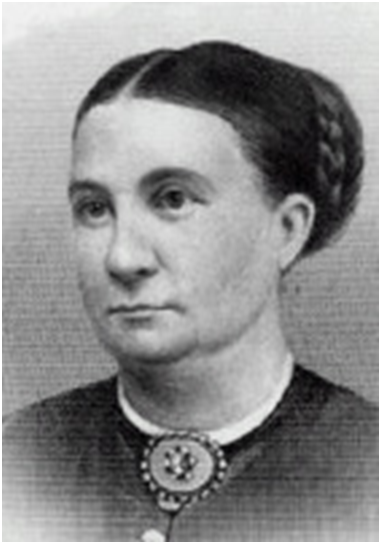
Phoebe Cary's poem "A Legend of the Northland" (1822-1871). This is a ballad poem. The poet tells a ballad about the lady and the Saint in this poem. Saint Peter was hungry as a result of his worldwide journey.
No Men are Foreign
Poem-6
No Men are Foreign
By James Kirkup

No Men Are Foreign Poem Introduction
The title 'No Men Are Foreign' refers to the fact that the no men are from another country. The poet wishes to convey the message that all men are the same, that all men are equal. He wishes to spread the idea of universal brotherhood. The poet's intention in writing this poem is to convey the idea that everyone in the world is the same. All people, all men are the same – they eat, live, and die in the same manner. Nature's bounty, such as sunshine and land, is shared equally by all. It is also referred to as a peace poem.
No Men Are Foreign Poem Summary
The poem 'No Men Are Foreign' begins and ends with the same line: 'Remember no men are strange, no countries foreign,' as the poet wishes to emphasise that all people on this planet are the same and that we have created distinctions by erecting borders and fences, different languages, and so on. We walk on the same Earth while we are alive, and when we die, we will be buried on the same Earth. Another parallel he draws is that we all enjoy good food in times of peace but go hungry during times of war and in the winter.
We all have the same hands that we use to do a lot of hard work. We all have eyes that stay open when we're awake and close when we're asleep. He reminds the reader that whenever we hate someone, we deceive and actually hate ourselves. Furthermore, when we use weapons against someone, we pollute the Earth and make it impure by leaving huge mounds of dead bodies strewn across it.
No Men Are Foreign Poem Explanation
Remember, no men are strange, no countries foreign
Beneath all uniforms, a single body breathes
Like ours: the land our brothers walk upon
Is earth like this, in which we all shall lie.
- Beneath: under
- Strange: unknown
The poet states in the first line that no man is strange, and no country is foreign. As a result, he is attempting to remove the borders that have been erected on Earth to separate different countries. Only then will no country be considered foreign. When there are no borders and everyone is free to move around, we will feel as if every country is our own. The poet wishes to express that the entire Earth is one and that all people who live on it are members of the same human race. Then he says under all of that uniforms worn by soldiers from various countries, the human being is the same. God created us all in the same way. Everyone breathes in the same way. Then he says that all the soldiers are our brothers, that we all walk on the same 'Mother Earth,' and that when we die, we will all be buried on the same Earth.
They, too, aware of sun and air and water,
Are fed by peaceful harvests, by war’s long winter starv’d.
Their hands are ours, and in their lines we read
A labour not different from our own.
Those who are from other countries are referred to as 'they.' We call them foreigners, discriminate against them, and fight with them. The poet says that nature has bestowed all bounties on all people, just as he has on us. Everyone receives equal amounts of sunlight, air, and water, implying that God does not distinguish between people from different countries. During times of peace, when there is no war, we all farm. We live a simple life and eat only what nature provides.
He goes on to say that the way we starve during wars and during the winter is the same way other countries starve. They, too, do not receive food at that time. So he wants to say that foreigners from other countries and we are the same. The poet then says that their hands are the same as ours, and they work just as hard as we do. He is using all of these examples to demonstrate to the reader that there is no difference between us and people from other countries.
Remember they have eyes like ours that wake
Or sleep, and strength that can be won
By love. In every land is a common life
That all can recognise and understand.
The poet requests that the reader remember something. He advises us to remember that the people of another country, whom we consider to be our enemies, have been endowed by God with a similar appearance to us. God gave them eyes like ours, which open when we are awake and close when we sleep. Similarly, he has given them the strength to win through love. Then he says that there is one thing that every country, every land has in common, and that is life. All living things are referred to as "life." And if we can recognise them, understand their feelings, and recognise that they are similar to us, there will be no fights or wars between us.
Let us remember, whenever we are told
To hate our brothers, it is ourselves
That we shall dispossess, betray, condemn.
Remember, we who take arms against each other
- dispossess: dislodge; deprive
According to the poet, whenever someone tells us to hate someone from another country, to think of him as our enemy, and whenever we think of someone as our enemy, we deprive ourselves, cheat ourselves, and condemn ourselves. He believes that we should avoid such negativity. We should not regard anyone as an enemy. During a war, both parties must bear the cost of the loss. That is why, according to the poet, war is not in our favour. He says that whenever we choose a weapon to use against someone, we should keep one thing in mind......
It is the human earth that we defile.
Our hells of fire and dust outrage the innocence
Of air that is everywhere our own,
Remember, no men are foreign, and no countries strange.
- defile: make dirty; pollute
- outrage the innocence of: violate the purity of
We must remember that whenever we choose weapons against anyone, we pollute the Earth because weapons kill people and their bodies, which fall to the ground, pollute the Earth. When war breaks out, there is a lot of bloodshed, fire, and death. These dead bodies accumulate on the Earth, polluting it. The erupting fire of war, the smoke that comes out, the dust that fills the air – it is so filthy that it pollutes and offends the purity of the air. With all of this, the poet wishes to convey the message that we should prevents from engaging in war.
No Men Are Foreign Poem Literary Devices
Rhyme Scheme – The entire poem is written in free verse. There is no rhyme scheme in the poem.
The literary devices used are as follows –
Alliteration: The repetition of a consonant sound in two or more closely placed words is called alliteration. The instances of alliteration in the poem are –
Stanza 1 – Body, breathes ‘b’ sound is repeated
Stanza 2 – war’s, winter ‘w’ sound is repeated
Metaphor
Stanza 1 – Uniform refers to the military of different countries
Stanza 2 – wars time is compared to the winter season
Repetition: It is used in the entire poem.
‘Remember’ word is repeated 5 times in this poem.
‘Remember, no men are strange, no countries foreign’ is repeated in stanza 1 and stanza 5
Enjambment – running lines of poetry from one line to the next without using any kind of punctuation to indicate a stop. Instances of enjambment in the poem are as follows-
Stanza 1 – line 2, 3 and 4
Stanza 2 – line 3 and 3
Stanza 3 – line 1, 2, and 3
Stanza 4 – line 1 and 2
Stanza 5 – Line 2 and 3
About the Poet
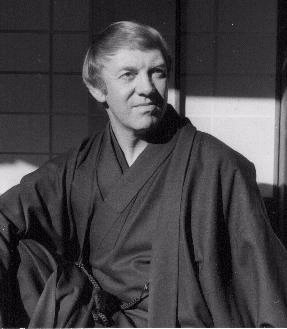
James Kirkup (1918-2009) was the former Executive Editor – Politics for The Telegraph and the Director of the Social Market Foundation. For 16 years, he worked as a lobby journalist. He was an accomplished poet and translator. Several dozen poetry collections and six volumes of autobiography are among his works.
The Duck and The Kangaroos
Poem-7
The Duck and The Kangaroos
By Edward Lear

The Duck and The Kangaroo Poem Introduction
The poem elaborates on a duck's desire to leave the confines of the pond and travel the world like the kangaroo. The duck requests that the kangaroo take it on a trip and solve the problems that the kangaroo will face.
The Duck and The Kangaroo Poem Summary
The poem describes a conversation between a duck and a kangaroo. The duck admires the kangaroo's ability to hop around and visit different places. The duck dislikes the pond because it has to stay there indefinitely. The duck asks the kangaroo to make it sit on its back and travel across lands and seas to places like the Dee and the Jelly Bo Lee. It promises that it will remain silent and only quack. The kangaroo responds that it will have to think about it because the duck's wet and cold feet may cause body pains – rheumatism.
The duck claims to have made plans for the kangaroo's safety. It had four pairs of worsted socks that fit the web – shaped feet perfectly. It would also wear a cloak to protect itself from the cold weather and smoke one cigar per day. The duck adores the kangaroo and wishes to ensure its well – being. The kangaroo agrees to accompany the duck on a journey. It requests that the duck sit firmly and not move. The duck is sited on the kangaroo's back. The kangaroo begins with a hop and travels around the world three times. They both enjoy each other's company.
The Duck and The Kangaroo Poem Explanation
Said the Duck to the Kangaroo,
“Good gracious! how you hop!
Over the fields and the water too,
As if you never would stop!
My life is a bore in this nasty pond,
And I long to go out in the world beyond!
I wish I could hop like you!”
Said the Duck to the Kangaroo.
- Nasty: unpleasant, bad
The duck is astonished by the kangaroo's movement. It stated that the kangaroo could hop indefinitely across fields and bodies of water. The duck's life was monotonous because it spent all of its time in the pond. It wished to see the world beyond the pond's boundaries. It aspires to be able to hop like a kangaroo.
“Please give me a ride on your back!”
Said the Duck to the Kangaroo.
“I would sit quite still, and say nothing but ‘Quack’,
The whole of the long day through!
And we’d go to the Dee, and the Jelly Bo Lee,
Over the land, and over the sea;
Please take me a ride! O do!”
Said the Duck to the Kangaroo.
- Quack: sound made by the duck
The duck asks the kangaroo to carry it on its back. It stated that it would sit quietly and quack all day. As Dee and Jelly Bo Lee, the duck lists the places they would visit. It goes on to say that they would hop across land and sea.
Said the Kangaroo to the Duck,
“This requires some little reflection;
Perhaps on the whole it might bring me luck,
And there seems but one objection,
Which is, if you’ll let me speak so bold,
Your feet are unpleasantly wet and cold,
And would probably give me the roo-
Matiz!” said the Kangaroo.
- Reflection: thought, pondering
- Roo-matiz: refers to the disease of rheumatism
The kangaroo responded that it needed to think about it. The idea could be beneficial to him, but he had one objection: the duck's wet and cold feet could cause it pain.
Said the Duck, “As I sat on the rocks,
I have thought over that completely,
And I bought four pairs of worsted socks
Which fit my web-feet neatly.
And to keep out the cold I’ve bought a cloak,
And every day a cigar I’ll smoke,
All to follow my own dear true
Love of a Kangaroo!”
- Cloak: shrug
The duck explained that it had thought about it while sitting on the rocks during the day. To avoid this, the duck had purchased four pairs of worsted socks that fit its web-shaped feet perfectly. To keep warm, it would wear a shrug and smoke a cigar every day. The duck would go to long way in protecting the kangaroo because it was a beloved animal.
Said the Kangaroo, “I’m ready!
All in the moonlight pale;
But to balance me well, dear Duck, sit steady!
And quite at the end of my tail!”
So away they went with a hop and a bound,
And they hopped the whole world three times round;
And who so happy — O who,
As the Duck and the Kangaroo?
The kangaroo was pleased with the duck's response and ready for ride. They began their journey with a hop at night, when the sky was filled with the pale light of the moon. The kangaroo asked the duck to hold it tightly, and they travelled three times around the world. They both enjoyed each other's company.
The Duck and The Kangaroo Poem Literary Devices
1. Rhyme scheme
Stanza 1 – ababccaa
Stanza 2 – ababccbb
Stanza 3, 4, 5 – ababccdd
2. Alliteration – The repetition of a consonant sound at the start of two or more closely placed words.
a) Good gracious- ‘g’
b) how you hop – ‘h’
c) sit quite still, and say – ‘s’
d) But to balance- ‘b’
e) dear duck – ‘d’
f) whole world – ‘w’
3. Anaphora- When the same word is used at the start of 2 or more consecutive lines.
Instances of anaphora in the poem are as follows –
a) And to keep out the cold I’ve bought a cloak,
And every day a cigar I’ll smoke,
b) And they hopped the whole world three times round;
And who so happy — O who,
Both the pairs of sentences begin with ‘and’.
4. Refrain- the use of a musical rhyming sentence throughout the poem. “Said the duck to the kangaroo” has been repeated to lay stress on the request made by the duck to the kangaroo.
5. Enjambment – When the same sentence continues in two or more lines.
Instances of enjambment in the poem are as follows –
a) “And I bought four pairs of worsted socks
Which fit my web-feet neatly.”
b) “All to follow my own dear true
Love of a Kangaroo!”
About the Poet
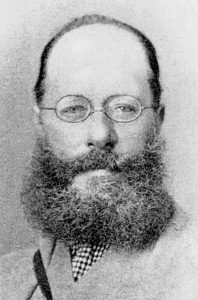
Edward Lear (1812-1888) was an English artist, illustrator, author, and poet best known for his literary nonsense in poetry and prose, particularly his limericks, which he popularised. When most people think of Edward Lear, they think of limericks and nonsense prose that make them smile.
On Killing A Tree
Poem-8
On Killing A Tree
By Gieve Patel

On Killing A Tree Poem Introduction
The poet arouses the reader's awareness and emphasises the fact that trees are living things. He compares trees to humans to emphasise that trees should not be cut down because destroying trees is the same as killing a human being. A tree does not die simply by being cut because it regrows from the point where it is cut. If it must be destroyed, it must be uprooted.
On Killing A Tree Poem Summary
"On Killing a Tree" is a heartfelt poem. The poet persuades the reader not to cut down trees, comparing it to "killing" a human being. He says that a plant absorbs sunlight, water, air, and nutrients from the soil to grow into a massive tree. It grows a strong trunk and a lot of leaves. Simply cutting the tree's trunk does not kill it. When a tree is cut, the sap flows out in the same way that a wounded man bleeds. When the wound heals, new branches and tiny leaves sprout, eventually growing into trees.
A tree must be uprooted in order to be destroyed. The roots, which are white in colour and damp from the moisture in the soil, are hidden in a pit in the ground. These roots are the most vulnerable part of the tree because they anchor it to the ground. These roots must be removed from the soil in order to kill the tree. When the roots are severed, the tree begins to die. It withers, dries up due to the action of heat and wind, twists, hardens, and eventually dies.
On Killing A Tree Poem Explanation
It takes much time to kill a tree,
Not a simple jab of the knife
Will do it. It has grown
Slowly consuming the earth,
Rising out of it, feeding
Upon its crust, absorbing
Years of sunlight, air, water,
And out of its leprous hide
Sprouting leaves.
- Jab: sudden rough blow
- Leprous hide: discolored bark
A simple cut does not result in the death of a tree. A tree grows slowly and is rooted in the soil. To grow into a large tree, a plant absorbs nutrients from the soil. The tree is firmly rooted in the ground. It needs sunlight, water, and air to grow into a strong trunk with many leaves.
So hack and chop
But this alone won’t do it.
Not so much pain will do it.
The bleeding bark will heal
And from close to the ground
Will rise curled green twigs,
Miniature boughs
Which if unchecked will expand again
To former size.
- Hack: cut roughly by striking heavy blows
The bark of trees is cut and chopped into many pieces by humans, but this is insufficient to destroy the tree. The cut point of the tree expresses sap in the same way that a human bleeds. This would gradually heal, and new branches would sprout from there.
No,
The root is to be pulled out —
Out of the anchoring earth;
It is to be roped, tied,
And pulled out-snapped out
Or pulled out entirely,
Out from the earth-cave,
And the strength of the tree exposed
The source, white and wet,
The most sensitive, hidden
For years inside the earth.
- Anchoring earth: trees are held securely with the help of the roots in the earth
- Snapped out: chopped out
According to the poet, in order to kill the tree, it must be uprooted. The tree must be separated from the Earth that supports it. The tree's roots connect the tree to the soil in the pit of the Earth. The most sensitive and hidden part of the tree – the roots – must then be separated. The roots are white and damp in colour.
Then the matter
Of scorching and choking
In sun and air,
Browning, hardening,
Twisting, withering,
And then it is done.
- Scorching and choking: the drying up of the tree after being uprooted
Once the tree has been uprooted, it withers and dries out due to the action of heat and wind. The trunk will turn brown, twist, and harden. The tree will eventually die in this way.
On Killing A Tree Poem Literary Devices
1. No rhyme scheme is there in the poem. It is written in free verse. There is no rhyme or rhythm.
2 Enjambment: When one sentence continues into two or more lines.
Not a simple jab of the knife
Will do it. It has grown
Slowly consuming the earth
Rising out of it, feeding
Upon its crust, absorbing
Years of sunlight, air, water,
And out of its leprous hide
Sprouting leaves.
The most sensitive, hidden
For years inside the earth.
3. Metaphor : indirect comparison
Leprous hide – the uneven colour of the surface of the trunk of a tree is compared to the skin of a person suffering from leprosy.
Bleeding bark – the sap coming out of tree where it is cut is compared to the bleeding from the wound in a human’s body.
4. Alliteration: repetition of a consonant sound in 2 or more closely places words.
Bleeding bark – ‘b’ sound
White and wet – ‘w’ sound
5. Repetition: a word or sentence is repeated to lay emphasis on it.
‘Pulled out’ is repeated
About the Poet
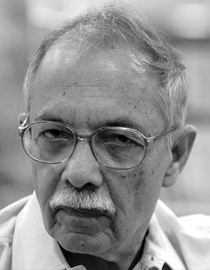
Gieve Patel born in 1940 (age 80 years), Mumbai. His Famous Books are Mirrored, Mirroring, Mister Behram and Other Plays, Gieve Patel: Sculptures and Drawings. In this poem "On Killing a Tree" seeks to express her feelings about tree cutting. It will take too long for him to kill a tree, he says. His poems express deep concern for nature while also exposing man's cruelty to it.
The Snake Trying
Poem-9
The Snake Trying
By WWE Ross

The Snake Trying Poem Introduction
The poet says in the poem that the snake tries to avoid being hit by a stick held by a person who is attempting to kill it. The poet wishes to convey the message that not all snakes are dangerous. Humans believe snakes are dangerous and attempt to kill them as soon as they see one, but this is not the case. He describes how a harmless green – coloured snake tries to hide behind green bushes to save itself.
The Snake Trying Poem Summary
In this poem, a harmless green snake tries to avoid being hit by a person chasing it with a stick in order to kill it. According to the poet, the snake is even safe for children. People are afraid of snakes and will try to kill them with a stick if they see one. The snake tries to save itself by hiding behind the green bushes of marshy plants that grow in the water. To save itself, it hides in the ripples of the water body. The snake vanishes behind the marshy vegetation.
The Snake Trying Poem Explanation
The snake trying
to escape the pursuing stick,
with sudden curvings of thin
long body. How beautiful
and graceful are his shapes!
- Pursuing: Chasing, following
- Curvings: Twisting
The snake tries to avoid being hit by the stick that is following it. The snake's body twists and turns as it crawls, forming fascinating shapes.
He glides through the water away
from the stroke. O let him go
over the water
into the reeds to hide
without hurt. Small and green
he is harmless even to children.
- Glides: Moves
- Stroke: Hitting of the stick
- Reeds: Water or marsh plants with thick stems
In order to save themselves, the snakes move through the water. The poet begs that it be allowed to escape and hide behind the dense marshy plants because it is harmless. Even children are unaffected by the small green snake.
Along the sand
he lay until observed
and chased away, and now
he vanishes in the ripples
among the green slim reeds.
- Vanishes: Disappears
It lay quietly in the sand until it was spotted and chased away by a person holding a stick. To save itself, the snake disappears in the ripples of the water and hides in the marshy plants' camouflaging green bushes.
The Snake Trying Poem Literary Devices
1. Rhyme scheme is absent. The poem is written in free verse.
2. Transferred epithet: the adjective used with a noun refers to a noun other than the one with which it is used.
Pursuing stick – pursuing refers to the person who is holding the stick and not the stick itself.
3. Alliteration: the repetition of a consonant sound in 2 or more consecutive words.
He is harmless – ‘h’
About the Poet

William Wrightson Eustace Ross (1894-1966) was a Canadian poet and geophysicist. He was the first published poet in Canada to write Imagist poetry, and later the first to write surrealist verse, earning him the title "the first modern Canadian poet" by some. During his lifetime, he privately published two small books, Laconics and Sonnets.
A Slumber Did My Spirit Seal
Poem-10
A Slumber Did My Spirit Seal
By William Wordsworth
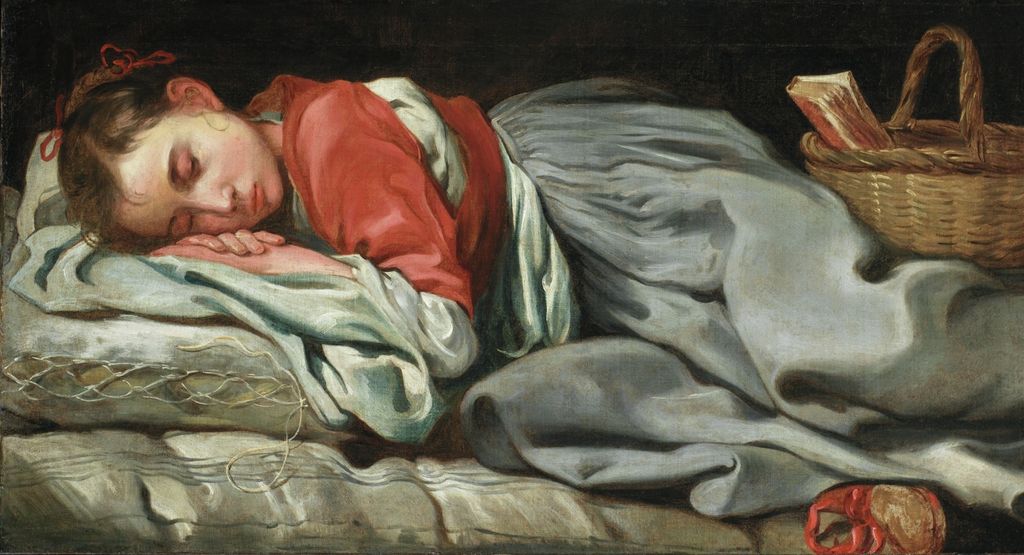
A Slumber Did My Spirit Seal Poem Introduction
William Wordsworth wrote this as one of his 'Lucy poems.' These poems were written in memory of his beloved. The poet is referring to death, which is a never-ending sleep. The poet was unaware when his beloved Lucy slept forever, i.e. died. She had taken life for granted until her death, when she realised the harsh reality of life.
A Slumber Did My Spirit Seal Poem Summary
The poet admits that he was in a deep sleep because he did not fear the harsh reality of life. He had taken life for granted and had never imagined that one day death would separate him from his beloved Lucy. For him, she was an immortal goddess who was unaffected by age or mortality. She is motionless because she is no longer alive. She cannot hear or see. She is buried in the earth and rotates with it. She will eventually blend in with the earth's trees, rocks, and stones.
A Slumber Did My Spirit Seal Poem Explanation
A slumber did my spirit seal—
I had no human fears.
She seemed a thing that could not feel
The touch of earthly years.
- Slumber: sleep
- Spirit: soul
The poet's soul had fallen into a deep sleep because he had no realisation of the truth. He had taken life for granted and had never imagined that one day, Lucy would be taken from him. He couldn't bear the loss of her when she was taken away.
No motion has she now, no force—
She neither hears nor sees,
Rolled round in earth’s diurnal course
With rocks and stones and trees.
- diurnal: daily
(Earth’s diurnal course” is earth’s daily rotation on its axis)
The poet accepts the fact that Lucy is no longer alive. She is lifeless and motionless. She cannot see nor hear. She was laid to rest in the earth. She will be assimilated into the earth and will rotate with it. She will one day become one with the rocks, stones, and trees that make up the Earth.
A Slumber Did My Spirit Seal Poem Literary Devices
1. Rhyme scheme – abab cdcd
2. Alliteration – The repetition of a consonant sound at the start of two or more consecutive words is called alliteration. The instances of alliteration are as follows –
‘Spirit sealed’, ‘rolled round’
3. Enjambment – when a sentence continues into two or more lines ending without any punctuation marks, it is called Enjambment. The instances of enjambment are as follows –
“She seemed a thing that could not feel
The touch of earthly years.”
“Rolled round in earth’s diurnal course
With rocks and stones and trees.”
About the Poet
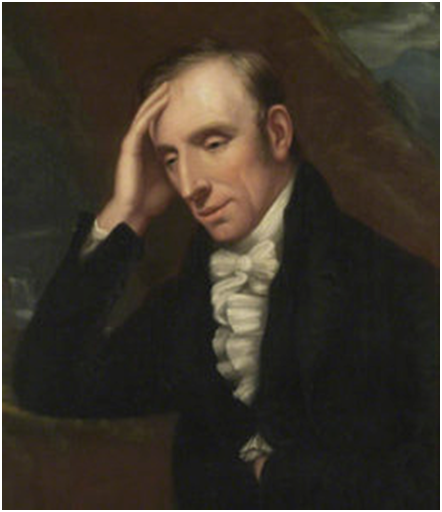
William Wordsworth (1770-1850) was an English poet whose collaboration with Samuel Taylor Coleridge on Lyrical Ballads (1798) helped launch the English Romantic movement. He was one of the founders of English Romanticism, as well as one of its most central figures and intellectuals. Wordsworth's poetry is synonymous with the English Lake District's unique landscape.

 EduMple Learning
EduMple Learning
 ACERISE INDIA
ACERISE INDIA
